The 100 Best Albums of 2024
Featuring Cindy Lee, Kendrick Lamar, Beyoncé, Thou, Waxahatchee, and more.
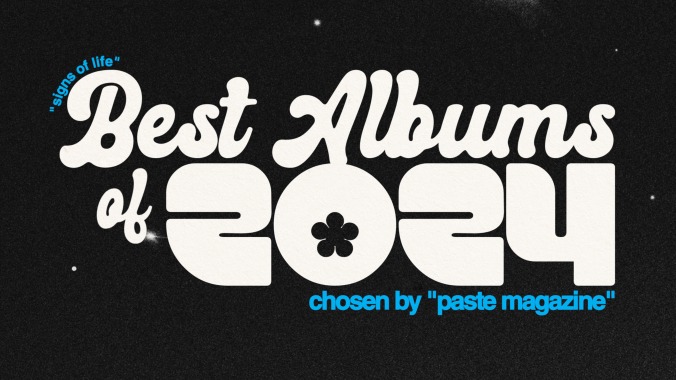
Paste’s 22nd Best Albums of the Year list, first compiled by the music team in a Google doc nearly 60 pages long, has arrived. 2024 was one for the books, and one of the best years of music of my life. Whether it was a pop record becoming so definitive that it had a whole season named after it, a two-hour album only available via YouTube and MP3 taking over the zeitgeist for a month, or some of this publication’s longtime favorite artists putting out career highlights, it’s hard to really quantify just how good these last 12 months have been, but we did it—and we’re ready to enshrine projects from Cindy Lee, Sturgill Simpson, ScHoolboy Q, Beyoncé, Thou, Kim Gordon, Bladee, Kendrick Lamar and countless others.
Combining staff picks, review scores and contributor votes, we’ve assembled a comprehensive list of our favorite full-length records released since December 1, 2023 (there will be a separate list for EPs). The genres range far and wide, touching everything from country to sludge metal to drill rap to hypnagogic pop, R&B, electronica, hardcore and big, tough, riffy rock ‘n’ roll. We aimed to leave no stone unturned and catch up on what we missed throughout the year, give more praise to the records we’ve loved since release day and showcase the vibrancy of such a diverse and talented crop of modern music. Here are the 100 best albums of 2024. Let us know in the comments which records we missed! —Matt Mitchell, Music Editor
100. Chelsea Wolfe: She Reaches Out to She Reaches Out to She
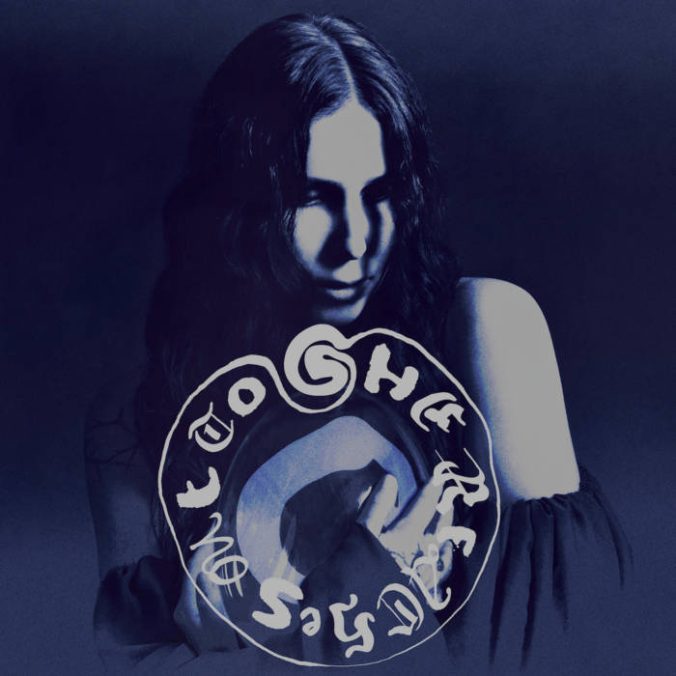 She Reaches Out to She Reaches Out to She is Chelsea Wolfe’s first solo album since her excellent 2019 LP Birth of Violence, and it’s at once a return to form and a venture towards something entirely new. The album’s title reflects its central theme: a conversation between past, present, and future selves, exploring rebirth and personal transformation. Darkwave textures and industrial rhythms are woven into a hypnotic tapestry of sound, every hushed whisper and muted croon thoroughly soaked in Wolfe’s signature gothic tonality even as she moves away from folk in favor of doom-core electronica. Even from the first track, “Whispers in the Echo Chamber” (an exemplary instance of Wolfe’s masterful command of tension and release), it’s evident that the record traffics in metamorphosis and the unknown. Ethereal vocals float above thunderous percussion and crystalline synth work as she sings, “Beyond reality, beyond the binary / Bathing in the blood of who I used to be … / Become my own fantasy / Twist the old self into poetry.” Her journey through sobriety emerges in the pulsing “House of Self-Undoing,” where vulnerability meets strength in a sublime collision of electronic and organic elements. When Wolfe ventures into trip-hop territory on “The Liminal” and “Salt,” she crafts an atmosphere both suffocating and liberating, demonstrating her ability to transmute personal transformation into sonic catharsis. The album’s closer “Dusk” serves as a perfect denouement, distilling the record’s themes of self-discovery within liminality into five minutes of transcendent dark ambience. She Reaches Out crafts an intricate dialogue between Wolfe’s past and future, pushing her sound into new territories while maintaining the dark, introspective core that has defined her work. “The unknowable mind, I feel it till it’s time,” Wolfe sings on “Unseen World.” “Grieve and redefine.” And that’s what She Reaches Out does so wonderfully, again and again and again: grieve and redefine. —Casey Epstein-Gross [Loma Vista]
She Reaches Out to She Reaches Out to She is Chelsea Wolfe’s first solo album since her excellent 2019 LP Birth of Violence, and it’s at once a return to form and a venture towards something entirely new. The album’s title reflects its central theme: a conversation between past, present, and future selves, exploring rebirth and personal transformation. Darkwave textures and industrial rhythms are woven into a hypnotic tapestry of sound, every hushed whisper and muted croon thoroughly soaked in Wolfe’s signature gothic tonality even as she moves away from folk in favor of doom-core electronica. Even from the first track, “Whispers in the Echo Chamber” (an exemplary instance of Wolfe’s masterful command of tension and release), it’s evident that the record traffics in metamorphosis and the unknown. Ethereal vocals float above thunderous percussion and crystalline synth work as she sings, “Beyond reality, beyond the binary / Bathing in the blood of who I used to be … / Become my own fantasy / Twist the old self into poetry.” Her journey through sobriety emerges in the pulsing “House of Self-Undoing,” where vulnerability meets strength in a sublime collision of electronic and organic elements. When Wolfe ventures into trip-hop territory on “The Liminal” and “Salt,” she crafts an atmosphere both suffocating and liberating, demonstrating her ability to transmute personal transformation into sonic catharsis. The album’s closer “Dusk” serves as a perfect denouement, distilling the record’s themes of self-discovery within liminality into five minutes of transcendent dark ambience. She Reaches Out crafts an intricate dialogue between Wolfe’s past and future, pushing her sound into new territories while maintaining the dark, introspective core that has defined her work. “The unknowable mind, I feel it till it’s time,” Wolfe sings on “Unseen World.” “Grieve and redefine.” And that’s what She Reaches Out does so wonderfully, again and again and again: grieve and redefine. —Casey Epstein-Gross [Loma Vista]
Read: “Chelsea Wolfe Embraces Her Inner Wisdom”
99. Doechii: Alligator Bites Never Heal
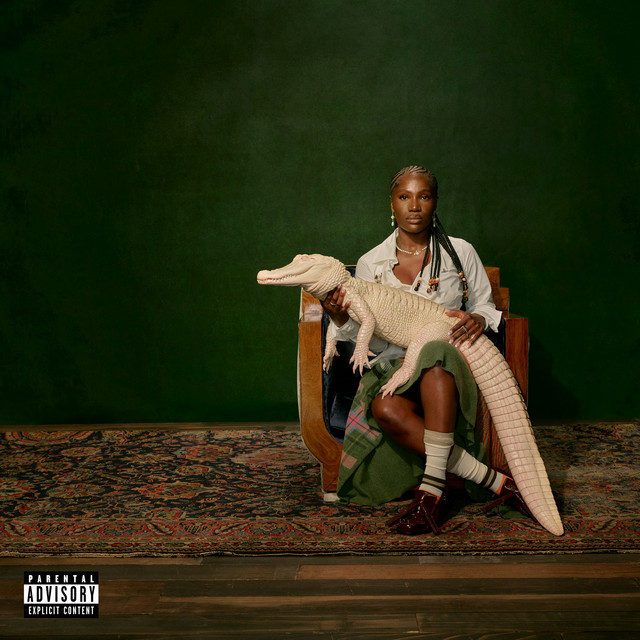 On “BOOM BAP,” the track at the center of Doechii’s latest project Alligator Bites Never Heal, the Tampa rapper yells the line “Get Top on the phone.” “Get ‘em on the phone!” she repeats, through Auto-Tune. Doechii isn’t messing around. She references Kendrick Lamar’s “untitled 02,” asserting herself as a part of the former TDE rapper’s lineage. It takes guts to align yourself as a descendant to Lamar so explicitly and confidently. But with Alligator Bites Never Heal, she pulls it off. The mixtape traverses pop-rap hits-in-waiting, house-infused struts, boom-bap, trap. You can hear Doechii’s hunger to prove herself. She’s sexy, goofy, confident, frustrated, clever, always three steps ahead. Trust her when she yells, “It’s everything / I’m everything!” On Alligator Bites Never Heal, Doechii comes into her own. There’s no one else more deserving of the TDE legacy. —Andy Steiner [TDE/Capitol Records]
On “BOOM BAP,” the track at the center of Doechii’s latest project Alligator Bites Never Heal, the Tampa rapper yells the line “Get Top on the phone.” “Get ‘em on the phone!” she repeats, through Auto-Tune. Doechii isn’t messing around. She references Kendrick Lamar’s “untitled 02,” asserting herself as a part of the former TDE rapper’s lineage. It takes guts to align yourself as a descendant to Lamar so explicitly and confidently. But with Alligator Bites Never Heal, she pulls it off. The mixtape traverses pop-rap hits-in-waiting, house-infused struts, boom-bap, trap. You can hear Doechii’s hunger to prove herself. She’s sexy, goofy, confident, frustrated, clever, always three steps ahead. Trust her when she yells, “It’s everything / I’m everything!” On Alligator Bites Never Heal, Doechii comes into her own. There’s no one else more deserving of the TDE legacy. —Andy Steiner [TDE/Capitol Records]
98. Feeling Figures: Everything Around You
 Like Merlin, Montreal’s Feeling Figures are aging in reverse. Everything Around You, their excellent follow-up to last year’s sleeper underground hit Migration Music, is actually their first album—at least in terms of when it was recorded. Who knows what internal math pushed this one to the back of the line, but it was a smart call—it’s actually a stronger, deeper, and richer LP (and other comparatives, even), and one of the better underground rock records of the last few years. And you can be excused for just assuming the band’s from Australia, as they’ve been schooling the rest of the world on this kind of stuff for a couple of decades now. If you’re well-versed in the wayward permutations of unpopular music, you’ll know the score here immediately. Two guitars, bass, drums—as trad a lineup as possible—playing rock music, but not that kind of rock music; i.e., not something you would ever hear on classic rock radio, no matter how much time passes (those stations still exist, and they’re probably playing Vampire Weekend even as I type). Think White Light / White Heat, Wire’s second record, Sonic Youth, early Dinosaur Jr., and a ton of New Zealand and Australian bands, from The Clean all the way up to whatever new group Jake Robertson formed today. Feeling Figures fit squarely into that legacy, and Everything Around You is a fine addition to that canon. —Garrett Martin [K Records / Perennial Records]
Like Merlin, Montreal’s Feeling Figures are aging in reverse. Everything Around You, their excellent follow-up to last year’s sleeper underground hit Migration Music, is actually their first album—at least in terms of when it was recorded. Who knows what internal math pushed this one to the back of the line, but it was a smart call—it’s actually a stronger, deeper, and richer LP (and other comparatives, even), and one of the better underground rock records of the last few years. And you can be excused for just assuming the band’s from Australia, as they’ve been schooling the rest of the world on this kind of stuff for a couple of decades now. If you’re well-versed in the wayward permutations of unpopular music, you’ll know the score here immediately. Two guitars, bass, drums—as trad a lineup as possible—playing rock music, but not that kind of rock music; i.e., not something you would ever hear on classic rock radio, no matter how much time passes (those stations still exist, and they’re probably playing Vampire Weekend even as I type). Think White Light / White Heat, Wire’s second record, Sonic Youth, early Dinosaur Jr., and a ton of New Zealand and Australian bands, from The Clean all the way up to whatever new group Jake Robertson formed today. Feeling Figures fit squarely into that legacy, and Everything Around You is a fine addition to that canon. —Garrett Martin [K Records / Perennial Records]
97. Bladee: Cold Visions
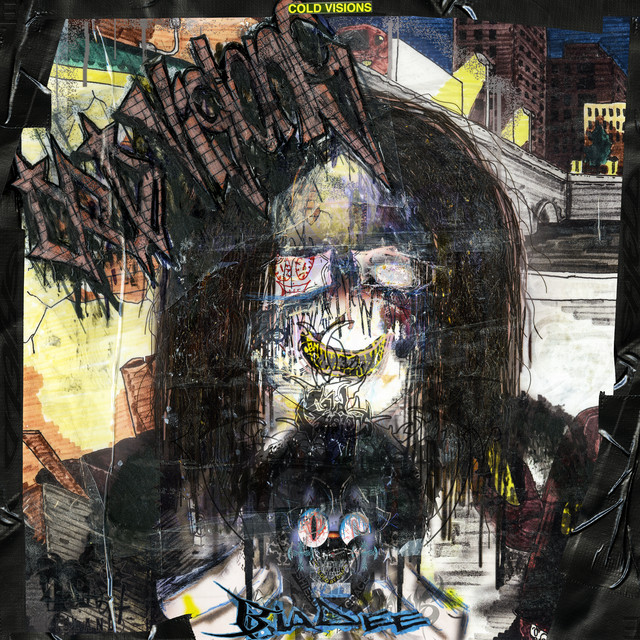 Being a fan of Swedish rapper Bladee often feels like constantly asking yourself the question: Am I in too deep yet? Between his seven studio albums—to say nothing of three more full-length mixtapes, six collaborative records, six EPs and dozens of additional singles—constant collaborations with other Drain Gang and adjacent artists (Yung Lean, Ecco2k, Thaiboy Digital and co.), Bladee has spent the past 10 years creating a vocabulary of reference and self-reference through icy synths and laptop beeps. On Cold Visions, he gets to fully use it, calling back to snippets and lyrics of his old songs and records. It’s not just a pastiche of the Bladee lore, no, he’s got something new here. Bladee’s music has been glassy before, wrapped in bubble plastic, even, but on Cold Visions, everything shatters; we’re left falling down his hour-long fragmented rabbit hole and there’s no such thing as too deep. We’re there with him the whole way. “Only God Is Made Perfect,” arrives, announcing “drain gang” before he starts singing, “I used to sell—” and all of a sudden the beat drops out, and to replace whatever it is he was selling, the album title cuts in a cunning redaction. For all its overlaid parts, though, Cold Visions might just be Bladee’s most cohesive project to date, huddled under F1lthy’s dark, distorted production. He’s fighting through the haze of F1lthy’s manipulation, and the tension flaunts him at his most energized. That’s the thing about Cold Visions: It collapses the ironic distance that permeates most of Bladee’s music, but it doesn’t forsake the jokes. It’s always a tricky dance with him, and it’s impossible to take him any more seriously than he takes himself. But on this 2024 love letter to his Drain Gang, his persona and his mode of music-making, Bladee cements himself as a genuine artist. —Madelyn Dawson [Trash Island]
Being a fan of Swedish rapper Bladee often feels like constantly asking yourself the question: Am I in too deep yet? Between his seven studio albums—to say nothing of three more full-length mixtapes, six collaborative records, six EPs and dozens of additional singles—constant collaborations with other Drain Gang and adjacent artists (Yung Lean, Ecco2k, Thaiboy Digital and co.), Bladee has spent the past 10 years creating a vocabulary of reference and self-reference through icy synths and laptop beeps. On Cold Visions, he gets to fully use it, calling back to snippets and lyrics of his old songs and records. It’s not just a pastiche of the Bladee lore, no, he’s got something new here. Bladee’s music has been glassy before, wrapped in bubble plastic, even, but on Cold Visions, everything shatters; we’re left falling down his hour-long fragmented rabbit hole and there’s no such thing as too deep. We’re there with him the whole way. “Only God Is Made Perfect,” arrives, announcing “drain gang” before he starts singing, “I used to sell—” and all of a sudden the beat drops out, and to replace whatever it is he was selling, the album title cuts in a cunning redaction. For all its overlaid parts, though, Cold Visions might just be Bladee’s most cohesive project to date, huddled under F1lthy’s dark, distorted production. He’s fighting through the haze of F1lthy’s manipulation, and the tension flaunts him at his most energized. That’s the thing about Cold Visions: It collapses the ironic distance that permeates most of Bladee’s music, but it doesn’t forsake the jokes. It’s always a tricky dance with him, and it’s impossible to take him any more seriously than he takes himself. But on this 2024 love letter to his Drain Gang, his persona and his mode of music-making, Bladee cements himself as a genuine artist. —Madelyn Dawson [Trash Island]
96. Nia Archives: Silence Is Loud
 As peak-pandemic malaise seemed to slowly leave the broader musical conversation in 2024, BRAT was hardly the only club-friendly album plumbing the depths of the soul to a heady, thumping beat. As a self-proclaimed “New Gen Junglist,” Producer and DJ Nia Archives first made critical waves by taking the U.K.’s long-storied love affair with drum and bass—as well as rave culture—and spreading the romance on a global scale with her dense, eclectic soundscapes. The 25-year-old’s first full-length Silence Is Loud layers heartbroken lyrics over breakneck production to craft one of the year’s most interesting debuts. Songs like the title track, “Unfinished Business” and “Forbidden Feelingz” are so packed with personality and hooks to spare that you might not even notice Archives spilling her guts on the dancefloor. Still, for anyone looking to scratch that bittersweet itch, Silence Is Loud stands toe-to-toe with the year’s most acclaimed dance music. —Elise Soutar [Island]
As peak-pandemic malaise seemed to slowly leave the broader musical conversation in 2024, BRAT was hardly the only club-friendly album plumbing the depths of the soul to a heady, thumping beat. As a self-proclaimed “New Gen Junglist,” Producer and DJ Nia Archives first made critical waves by taking the U.K.’s long-storied love affair with drum and bass—as well as rave culture—and spreading the romance on a global scale with her dense, eclectic soundscapes. The 25-year-old’s first full-length Silence Is Loud layers heartbroken lyrics over breakneck production to craft one of the year’s most interesting debuts. Songs like the title track, “Unfinished Business” and “Forbidden Feelingz” are so packed with personality and hooks to spare that you might not even notice Archives spilling her guts on the dancefloor. Still, for anyone looking to scratch that bittersweet itch, Silence Is Loud stands toe-to-toe with the year’s most acclaimed dance music. —Elise Soutar [Island]
95. Rosali: Bite Down
 Of course, any band worth its weight benefits from songs with a strong gravitational pull, and Rosali dishes those out in heaping helpings. Like No Medium before it, Bite Down is packed wall to wall with tunes that are unsettled but unhurried, generous with melody, wandering but never lost, and reliably steady despite the never-ending twists and turns of an earthly existence. But above all, they are beautiful, broken and built around the kind of raw emotional uncertainty that will resonate with anyone who has ever lived, loved and/or lost. Bite Down’s highlights include “My Kind,” a kinetic, country-blues stomper that serves as evidence that Rosali is perfectly capable of a Waxahatchee-style arc if she chooses to pursue it, and “Hills on Fire,” a triumph of room-sound atmospherics and squirrelly guitar-isms that feels like watching a lightning storm crawl across a vast flatland, or perhaps childhood trauma streaking through an adult body. And while Bite Down has more approachable peaks, it ends with two tracks that echo both its stylistic range and its recurring themes of pain, self-reflection, healing and hope. First, “Change Is In The Form” builds a Crazy Horse-style crescendo around Rosali’s sing-song ruminations on the impermanence of life, which give way to “May It Be On Offer,” a quiet prayer for restoration and deliverance underpinned by long, droning tones. “There is hope upon me,” Rosali sings, with what sounds like fresh recognition in her voice. “There is reason to try.” Amen, indeed. That hard-won epiphany is the destination and Bite Down is the sound of the journey. We are fortunate Rosali has brought us all along for the ride. —Ben Salmon [Merge]
Of course, any band worth its weight benefits from songs with a strong gravitational pull, and Rosali dishes those out in heaping helpings. Like No Medium before it, Bite Down is packed wall to wall with tunes that are unsettled but unhurried, generous with melody, wandering but never lost, and reliably steady despite the never-ending twists and turns of an earthly existence. But above all, they are beautiful, broken and built around the kind of raw emotional uncertainty that will resonate with anyone who has ever lived, loved and/or lost. Bite Down’s highlights include “My Kind,” a kinetic, country-blues stomper that serves as evidence that Rosali is perfectly capable of a Waxahatchee-style arc if she chooses to pursue it, and “Hills on Fire,” a triumph of room-sound atmospherics and squirrelly guitar-isms that feels like watching a lightning storm crawl across a vast flatland, or perhaps childhood trauma streaking through an adult body. And while Bite Down has more approachable peaks, it ends with two tracks that echo both its stylistic range and its recurring themes of pain, self-reflection, healing and hope. First, “Change Is In The Form” builds a Crazy Horse-style crescendo around Rosali’s sing-song ruminations on the impermanence of life, which give way to “May It Be On Offer,” a quiet prayer for restoration and deliverance underpinned by long, droning tones. “There is hope upon me,” Rosali sings, with what sounds like fresh recognition in her voice. “There is reason to try.” Amen, indeed. That hard-won epiphany is the destination and Bite Down is the sound of the journey. We are fortunate Rosali has brought us all along for the ride. —Ben Salmon [Merge]
Read: “Rosali’s Vibrant, Sobering Vulnerability”
94. Young Jesus: The Fool
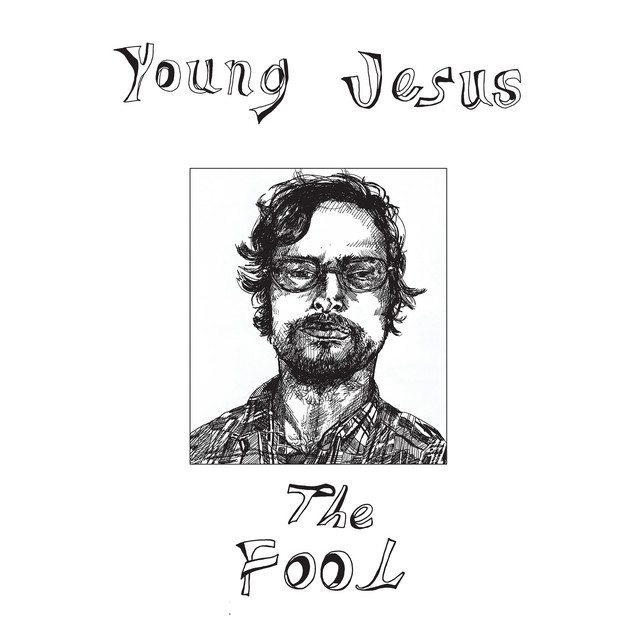 When John Rossiter isn’t telling a character’s story, he turns the focus on his own interior life. The songs on The Fool are honest at their core, and often quite heavy, dealing with serious topics. The record is an impressive and engaging work but not an easy listen. Its centerpiece, “Rich,” may well be Rossiter’s masterpiece, but you’ll want to take a moment after finishing it. There are a few different ideas held in the song, and while they are all distinct, they are also tangled together—but Rossiter does his best to parse them. Most strikingly, he sings bluntly about his own mental health struggles, and how mental illness and suicidality are passed down genetically. As he holds this idea in one hand, he also holds the inherited nature of generational wealth in the other—pondering how, though it can’t save people from all struggles, it affords them privilege. People who have family money are more often free to pursue careers in fields like the arts, and he acknowledges the open secret of it all. Song to song, there isn’t much sonic variation, and after the throw-everything-at-the-wall approach he took on Shepherd Head, the bare-boned arrangements here are refreshing. It’s unlikely that Rossiter will make another record like The Fool, but Young Jesus was already an unpredictable project before it, anyway. Though it can often leave you with a sense of discomfort, it’s remarkable that there isn’t a confrontational edge to The Fool. You don’t get the sense that Rossiter is trying to provoke you, necessarily, and you aren’t being asked to give him brownie points for being in touch with his own emotions. Rossiter has, instead, made something open—something that he needed to make, even if he didn’t know he ever could. —Eric Bennett [Saddle Creek]
When John Rossiter isn’t telling a character’s story, he turns the focus on his own interior life. The songs on The Fool are honest at their core, and often quite heavy, dealing with serious topics. The record is an impressive and engaging work but not an easy listen. Its centerpiece, “Rich,” may well be Rossiter’s masterpiece, but you’ll want to take a moment after finishing it. There are a few different ideas held in the song, and while they are all distinct, they are also tangled together—but Rossiter does his best to parse them. Most strikingly, he sings bluntly about his own mental health struggles, and how mental illness and suicidality are passed down genetically. As he holds this idea in one hand, he also holds the inherited nature of generational wealth in the other—pondering how, though it can’t save people from all struggles, it affords them privilege. People who have family money are more often free to pursue careers in fields like the arts, and he acknowledges the open secret of it all. Song to song, there isn’t much sonic variation, and after the throw-everything-at-the-wall approach he took on Shepherd Head, the bare-boned arrangements here are refreshing. It’s unlikely that Rossiter will make another record like The Fool, but Young Jesus was already an unpredictable project before it, anyway. Though it can often leave you with a sense of discomfort, it’s remarkable that there isn’t a confrontational edge to The Fool. You don’t get the sense that Rossiter is trying to provoke you, necessarily, and you aren’t being asked to give him brownie points for being in touch with his own emotions. Rossiter has, instead, made something open—something that he needed to make, even if he didn’t know he ever could. —Eric Bennett [Saddle Creek]
93. Empress Of: For Your Consideration
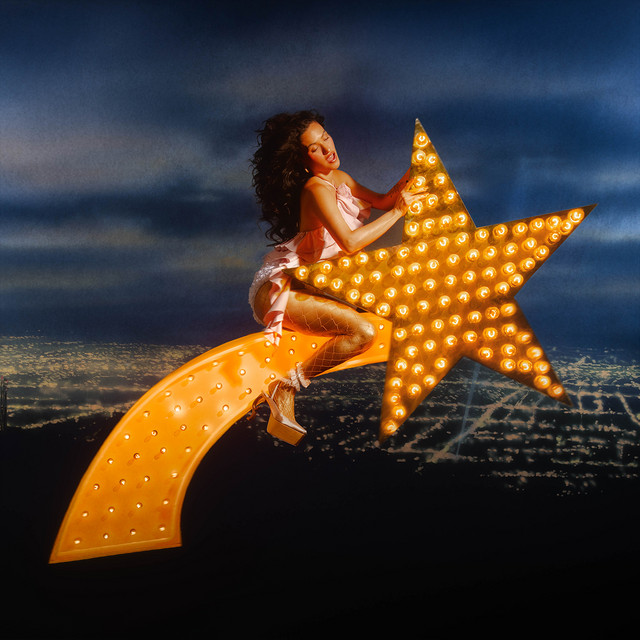 Lorely Rodriguez has often used her music project Empress Of as a shield, and on her fourth album For Your Consideration, she’s on a mission to restore confidence that love is still possible after despairing heartbreak. Though she maligns her former flame’s less-than-flattering traits (like discovering unfamiliar aromas on the sheets on “Lorelei”), she acknowledges her own flaws too; she can be too trusting and even takes on some of his flightiness post breakup. She lets voice soar, whisper, gasp, purr, and growl, distorting it to be delicate in one instance (“Cura”) to authoritative in the next (“Fácil”). It’s an album that finds pleasure in taking control but allowing oneself to achieve ecstasy in submission–even if it’s only for the night. —Jaeden Pinder [Major Arcana]
Lorely Rodriguez has often used her music project Empress Of as a shield, and on her fourth album For Your Consideration, she’s on a mission to restore confidence that love is still possible after despairing heartbreak. Though she maligns her former flame’s less-than-flattering traits (like discovering unfamiliar aromas on the sheets on “Lorelei”), she acknowledges her own flaws too; she can be too trusting and even takes on some of his flightiness post breakup. She lets voice soar, whisper, gasp, purr, and growl, distorting it to be delicate in one instance (“Cura”) to authoritative in the next (“Fácil”). It’s an album that finds pleasure in taking control but allowing oneself to achieve ecstasy in submission–even if it’s only for the night. —Jaeden Pinder [Major Arcana]
92. Hour: Ease the Work
 I arrived at Hour’s Ease the Work a few months after its April release date, but the project has stuck with me (as most records on the Dear Life imprint do). A product of Michael Cormier-O’Leary’s Philly underground presence, Hour is 12 musicians focused on devotion to craft and gestures of good faith and unflinching grace. Ease the Work was recorded live across one week at the Greenwood Garden Playhouse on Peaks Island in Maine—a place you have to get to by ferry—before tourist season. Calling to mind the works of Bill Frisell, Scott Walker, the songs of Ease the Work summon reflections of everything from Led Zeppelin’s “The Rain Song” and the offerings of a minimalist Louisville chamber group called Rachel’s. The sonics are sweeping and skyscraping, as sound engineers Keith J. Nelson and Lucas Knapp capture floor-to-ceiling instrumental epics of improvisation and coalitions of punk, folk and classical music. —Matt Mitchell [Dear Life Records]
I arrived at Hour’s Ease the Work a few months after its April release date, but the project has stuck with me (as most records on the Dear Life imprint do). A product of Michael Cormier-O’Leary’s Philly underground presence, Hour is 12 musicians focused on devotion to craft and gestures of good faith and unflinching grace. Ease the Work was recorded live across one week at the Greenwood Garden Playhouse on Peaks Island in Maine—a place you have to get to by ferry—before tourist season. Calling to mind the works of Bill Frisell, Scott Walker, the songs of Ease the Work summon reflections of everything from Led Zeppelin’s “The Rain Song” and the offerings of a minimalist Louisville chamber group called Rachel’s. The sonics are sweeping and skyscraping, as sound engineers Keith J. Nelson and Lucas Knapp capture floor-to-ceiling instrumental epics of improvisation and coalitions of punk, folk and classical music. —Matt Mitchell [Dear Life Records]
91. Haley Heynderickx: Seed of a Seed
 The Redwoods are just part of a big biological chorus on Seed of a Seed. You can hear the squish of the meadow beneath boots on “Foxglove,” the crashing of a wave on “Swoop” and the creeping proliferation of algae on “Mouth of a Flower.” From savoring a purple clover to tasting the sweet dew of morning, every breath of Seed is in communion with nature. It’s part of a tasting menu that also features the works of Walt Whitman and Barbara Kingsolver. The guitar work may sound uncomplicated at first blush, but that’s only because it’s so effortless. Haley Heynderickx is a true triple threat—vocalist, lyricist and guitarist—and her genius arrangements unfold upon repeat listens. Opener “Gemini” is a frantic self-takedown that features some of the most seductive strums of the album. The chords on “Jerry’s Song” pleasantly burble up over the smooth stones of bass, cello and layered vocals. And “Spit in the Sink” is a poem—about how we all try to create in spite of a tech-sick world that tells us creativity isn’t useful—that thanks to a sinewy melody proves itself as a song over and over again. There are too many other whip-smart lyrical strands to follow in one review, but one of Seed’s noteworthy themes is the miracle of a new day. Each new morning is “an offering,” as Heynderickx declares on “Sorry Fahey,” whose title is likely a nod to primitive guitar great John Fahey. Or, as she puts it on “Swoop,” “[t]here’s an artistry in the day to day.” And this kind of creativity isn’t found in a Zoom meeting or a social feed. It’s more likely in “free time” and “a hand next to mine,” both of which Heynderickx longs for on the title track. As she did on her first album I Need to Start a Garden, Heynderickx shows us that meaning can just easily be found in big existential questions and experiences as it can in the most minute details, down to a seed or a bug (her fixation on “The Bug Collector,” from her debut). The songs are as vast as canyons while also as fleeting as an ant. —Ellen Johnson [Mama Bird Recording Co.]
The Redwoods are just part of a big biological chorus on Seed of a Seed. You can hear the squish of the meadow beneath boots on “Foxglove,” the crashing of a wave on “Swoop” and the creeping proliferation of algae on “Mouth of a Flower.” From savoring a purple clover to tasting the sweet dew of morning, every breath of Seed is in communion with nature. It’s part of a tasting menu that also features the works of Walt Whitman and Barbara Kingsolver. The guitar work may sound uncomplicated at first blush, but that’s only because it’s so effortless. Haley Heynderickx is a true triple threat—vocalist, lyricist and guitarist—and her genius arrangements unfold upon repeat listens. Opener “Gemini” is a frantic self-takedown that features some of the most seductive strums of the album. The chords on “Jerry’s Song” pleasantly burble up over the smooth stones of bass, cello and layered vocals. And “Spit in the Sink” is a poem—about how we all try to create in spite of a tech-sick world that tells us creativity isn’t useful—that thanks to a sinewy melody proves itself as a song over and over again. There are too many other whip-smart lyrical strands to follow in one review, but one of Seed’s noteworthy themes is the miracle of a new day. Each new morning is “an offering,” as Heynderickx declares on “Sorry Fahey,” whose title is likely a nod to primitive guitar great John Fahey. Or, as she puts it on “Swoop,” “[t]here’s an artistry in the day to day.” And this kind of creativity isn’t found in a Zoom meeting or a social feed. It’s more likely in “free time” and “a hand next to mine,” both of which Heynderickx longs for on the title track. As she did on her first album I Need to Start a Garden, Heynderickx shows us that meaning can just easily be found in big existential questions and experiences as it can in the most minute details, down to a seed or a bug (her fixation on “The Bug Collector,” from her debut). The songs are as vast as canyons while also as fleeting as an ant. —Ellen Johnson [Mama Bird Recording Co.]
90. Parannoul: Sky Hundred
 Last year, anonymous South Korean shoegazer Parannoul put out After the Magic, and it was one of the very best rock records of the year. The work encapsulates a new era in eyes-to-the-floor guitar-playing, as Parannoul infuses his shoegaze triumphs with bonkers electronica that upends any preconceptions we have about the genre in the first place. His new record, Sky Hundred, emphasizes that. “황금빛 강 (Gold River)” picks up right where After the Magic left off, fusing a backdrop of synthesizers with a banging wave of percussion and guitar melodies so damn colossal that you might just get lost in the tones. There are moments of pop perfection that skyscrape into an onslaught of blown-out, distorted sonic matrimony. It’s massive, just as the blown-out scrapes of “고통없이 (Painless)” is, capturing an aura of heartbroken hope. “No pain, no happiness,” Parannoul declares, bleaker than ever, remaining atypical but resound while stuffing tracklists with one-minute field recordings interludes (“No One Talks About It Anymore”), ceiling-shattering guitar capsules (“시계 (Backwards)”)and 14-minute scapes of punishing euphoria (“Evoke Me”). Sky Hundred is rid of context but as affecting as ever. —Matt Mitchell [POCLANOS]
Last year, anonymous South Korean shoegazer Parannoul put out After the Magic, and it was one of the very best rock records of the year. The work encapsulates a new era in eyes-to-the-floor guitar-playing, as Parannoul infuses his shoegaze triumphs with bonkers electronica that upends any preconceptions we have about the genre in the first place. His new record, Sky Hundred, emphasizes that. “황금빛 강 (Gold River)” picks up right where After the Magic left off, fusing a backdrop of synthesizers with a banging wave of percussion and guitar melodies so damn colossal that you might just get lost in the tones. There are moments of pop perfection that skyscrape into an onslaught of blown-out, distorted sonic matrimony. It’s massive, just as the blown-out scrapes of “고통없이 (Painless)” is, capturing an aura of heartbroken hope. “No pain, no happiness,” Parannoul declares, bleaker than ever, remaining atypical but resound while stuffing tracklists with one-minute field recordings interludes (“No One Talks About It Anymore”), ceiling-shattering guitar capsules (“시계 (Backwards)”)and 14-minute scapes of punishing euphoria (“Evoke Me”). Sky Hundred is rid of context but as affecting as ever. —Matt Mitchell [POCLANOS]
89. Rosie Tucker: Utopia Now!
 In such a tangled web of late capitalist failures, trying to comment on the state of life on Earth in 2024 can be paralyzing; how do you talk about anything without talking about everything? LA singer-songwriter Rosie Tucker finds an effective methodology on their fifth LP, UTOPIA NOW!, where every lyric shines like a brilliant needle plucked from the rhetorical haystack and threaded effortlessly. “All I want is you—you—you—you—utopia now,” they sing on the title track, personal satisfaction and social revolution united in a perfect piece of tongue-in-cheek wordplay. In other songs, they personify U.S. imperialism as the archetypal girlboss (“White Savior Myth”) and catalog the thoughtless individual ambition that can spiral into an unsustainable force of destruction (“Paperclip Maximizer”) in perfect arrangements of syllables and indie rock melodies as permanent and irreducible as the plastic waste Tucker rails against so compellingly. Lest you question Tucker’s own place in the web, they offered this disclaimer in their Spotify bio, until recently: “I am able to give my time to music because i have a trust fund // i’m telling you because i think it is very gross the degree to which undisclosed generational wealth undergirds the whole music industry.” —Taylor Ruckle [Sentimental Records]
In such a tangled web of late capitalist failures, trying to comment on the state of life on Earth in 2024 can be paralyzing; how do you talk about anything without talking about everything? LA singer-songwriter Rosie Tucker finds an effective methodology on their fifth LP, UTOPIA NOW!, where every lyric shines like a brilliant needle plucked from the rhetorical haystack and threaded effortlessly. “All I want is you—you—you—you—utopia now,” they sing on the title track, personal satisfaction and social revolution united in a perfect piece of tongue-in-cheek wordplay. In other songs, they personify U.S. imperialism as the archetypal girlboss (“White Savior Myth”) and catalog the thoughtless individual ambition that can spiral into an unsustainable force of destruction (“Paperclip Maximizer”) in perfect arrangements of syllables and indie rock melodies as permanent and irreducible as the plastic waste Tucker rails against so compellingly. Lest you question Tucker’s own place in the web, they offered this disclaimer in their Spotify bio, until recently: “I am able to give my time to music because i have a trust fund // i’m telling you because i think it is very gross the degree to which undisclosed generational wealth undergirds the whole music industry.” —Taylor Ruckle [Sentimental Records]
88. claire rousay: sentiment
 The pop that claire rousay constructs on sentiment may sound infinitely different than that which often gets labeled “pop,” but the faint outlines of song structures and deep, affective resonance tie it to pop as it’s understood today. Perhaps its closest relative might be the bedroom work of Orchid Tapes, who often utilized at-home production, found sound and experimental techniques with which to chart an emotional dialogue within fluid structures. sentiment makes perfect sense as pop in a context where the immersive compositions of Foxes In Fiction, the diaristic entries of Blithe Field and the extremities of katie dey are all understood as working with pop’s glorious and bendable toolbox. sentiment approaches such an act of exploration with warped vocals and tender-strummed guitar more than rousay’s albums typically feature, but they’re buttressed with recordings from the field that is her everyday life. There’s a cruelty to one’s self—an urge to secure fleeting moments of emotional security—that rousay narrates throughout sentiment unflinchingly. It’s uncomfortable, but her music often thrives in the uncomfortable. —Devon Chodzin [Thrill Jockey]
The pop that claire rousay constructs on sentiment may sound infinitely different than that which often gets labeled “pop,” but the faint outlines of song structures and deep, affective resonance tie it to pop as it’s understood today. Perhaps its closest relative might be the bedroom work of Orchid Tapes, who often utilized at-home production, found sound and experimental techniques with which to chart an emotional dialogue within fluid structures. sentiment makes perfect sense as pop in a context where the immersive compositions of Foxes In Fiction, the diaristic entries of Blithe Field and the extremities of katie dey are all understood as working with pop’s glorious and bendable toolbox. sentiment approaches such an act of exploration with warped vocals and tender-strummed guitar more than rousay’s albums typically feature, but they’re buttressed with recordings from the field that is her everyday life. There’s a cruelty to one’s self—an urge to secure fleeting moments of emotional security—that rousay narrates throughout sentiment unflinchingly. It’s uncomfortable, but her music often thrives in the uncomfortable. —Devon Chodzin [Thrill Jockey]
87. Rose Hotel: A Pawn Surrender
 Atlanta singer-songwriter Jordan Reynolds took five years to follow up her self-released debut under the moniker Rose Hotel, and A Pawn Surrender was definitely worth the wait. At times angular and direct, she also ranges into spacey psych-folk, but either way the melodies head in unexpected directions as she lays her heart bare on these 10 tracks. The one-two punch of “Not Like That” and “King and a Pawn” in the middle of the album and closer “Illusion Anyway” should be popping up on Spotify playlists for anyone listening to indie music, but I don’t control the algorithms. This is one you’re probably going to have to queue up for yourself. —Josh Jackson [Strolling Bones]
Atlanta singer-songwriter Jordan Reynolds took five years to follow up her self-released debut under the moniker Rose Hotel, and A Pawn Surrender was definitely worth the wait. At times angular and direct, she also ranges into spacey psych-folk, but either way the melodies head in unexpected directions as she lays her heart bare on these 10 tracks. The one-two punch of “Not Like That” and “King and a Pawn” in the middle of the album and closer “Illusion Anyway” should be popping up on Spotify playlists for anyone listening to indie music, but I don’t control the algorithms. This is one you’re probably going to have to queue up for yourself. —Josh Jackson [Strolling Bones]
86. Yasmin Williams: Acadia
 After listening to her parents’ Earth, Wind & Fire records and becoming entranced by the group’s song, “Kalimba Story,” Yasmin Williams tried to produce that sound on her acoustic guitar, laying it flat in her lap and learned to tap on it as if it were a piano. Eventually she obtained an actual kalimba and attached it to her guitar with Velcro so she could play both instruments during the same song. It wasn’t just that she used an unusual technique to produce an unusual sound; Williams soon demonstrated a gift for composing spellbinding instrumental melodies. That ability rises to a new level on her latest album, Acadia, with nine original compositions of greater complexity and length than ever before. She doesn’t play the kalimba on this project, but she uses her kalimba-derived tapping technique and such instruments as kora, calabash and banjo to keep the connection to Africa alive. At the same time, however, she expands the scope of her sound by inviting guests from different fields. A string quartet joins her on the seven-minute “Sisters,” while jazz stars Immanuel Wilkins and Marcus Gilmore pull her in their direction on “Malamu.” Darlingside and Aoife O’Donovan add vocals to two numbers, and two other numbers add synths. And Dom Flemons plays rhythm bones on the opening track, “Cliffwalk.” When integrated into Williams’s astonishing playing and composing, these new musical flavors make Acadia a 21st century rarity: a non-jazz, non-classical instrumental triumph. —Geoffrey Himes [Nonesuch]
After listening to her parents’ Earth, Wind & Fire records and becoming entranced by the group’s song, “Kalimba Story,” Yasmin Williams tried to produce that sound on her acoustic guitar, laying it flat in her lap and learned to tap on it as if it were a piano. Eventually she obtained an actual kalimba and attached it to her guitar with Velcro so she could play both instruments during the same song. It wasn’t just that she used an unusual technique to produce an unusual sound; Williams soon demonstrated a gift for composing spellbinding instrumental melodies. That ability rises to a new level on her latest album, Acadia, with nine original compositions of greater complexity and length than ever before. She doesn’t play the kalimba on this project, but she uses her kalimba-derived tapping technique and such instruments as kora, calabash and banjo to keep the connection to Africa alive. At the same time, however, she expands the scope of her sound by inviting guests from different fields. A string quartet joins her on the seven-minute “Sisters,” while jazz stars Immanuel Wilkins and Marcus Gilmore pull her in their direction on “Malamu.” Darlingside and Aoife O’Donovan add vocals to two numbers, and two other numbers add synths. And Dom Flemons plays rhythm bones on the opening track, “Cliffwalk.” When integrated into Williams’s astonishing playing and composing, these new musical flavors make Acadia a 21st century rarity: a non-jazz, non-classical instrumental triumph. —Geoffrey Himes [Nonesuch]
85. Shovel Dance Collective: The Shovel Dance
 Shovel Dance Collective’s sonic archaeology seeks to re-contextualize centuries-old traditional performance with special attention to the marginal figures of the British Isles. As a nonet, their live performances are riveting, and their album The Shovel Dance best approximates their striking capabilities on record. The album is rich with drudgery and devastation, like on starvation song “Four Loom Weaver” or the oddly lugubrious jig “O’Sullivan’s March.” In these moments of bleakness, the sublime hits like a truck like in the rich harmonies and crescendos of “The Merry Golden Tree.” Amidst it all, there is some room for dance on the traditional Scottish song “Kissing’s Nae Sin/Newcastle/Portsmouth.” —Devon Chodzin [American Dreams]
Shovel Dance Collective’s sonic archaeology seeks to re-contextualize centuries-old traditional performance with special attention to the marginal figures of the British Isles. As a nonet, their live performances are riveting, and their album The Shovel Dance best approximates their striking capabilities on record. The album is rich with drudgery and devastation, like on starvation song “Four Loom Weaver” or the oddly lugubrious jig “O’Sullivan’s March.” In these moments of bleakness, the sublime hits like a truck like in the rich harmonies and crescendos of “The Merry Golden Tree.” Amidst it all, there is some room for dance on the traditional Scottish song “Kissing’s Nae Sin/Newcastle/Portsmouth.” —Devon Chodzin [American Dreams]
84. Rachel Chinouriri: What a Devastating Turn of Events
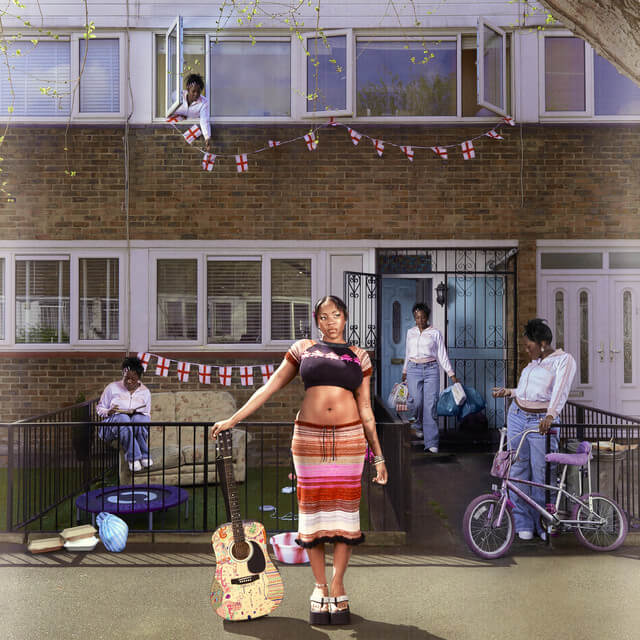 In a year of major pop records that make sweeping yet ultimately lackluster appeals toward confessionalism and vulnerability, the debut LP from British indie-pop newcomer Rachel Chinouriri is the year’s most emotionally and sonically striking coming-of-age concept album. Her music feels deeply personal and relatable without trying to be; its emotional impact never feels overwrought, and is always matched by a varied range of instrumental and production choices and Chinouriri’s engaging, elastic vocals. From the soaring, shoegazey meditation on imposter syndrome and leaving home (“The Hills”), to “Never Need Me,” the cinematic lead single and star-power proof-of-concept pop standout, to Chinouriri’s irreverent Cher Horowitz-inflected monologuing over the whistles and handclaps on “It Is What It Is,” to the breezy bravado on “Dumb Bitch Juice,” to the devastating diva balladry of “Robbed,” What a Devastating Turn of Events establishes Chinouriri as one of the most exciting young stars on the rise. —Grace Robins-Somerville [Parlophone]
In a year of major pop records that make sweeping yet ultimately lackluster appeals toward confessionalism and vulnerability, the debut LP from British indie-pop newcomer Rachel Chinouriri is the year’s most emotionally and sonically striking coming-of-age concept album. Her music feels deeply personal and relatable without trying to be; its emotional impact never feels overwrought, and is always matched by a varied range of instrumental and production choices and Chinouriri’s engaging, elastic vocals. From the soaring, shoegazey meditation on imposter syndrome and leaving home (“The Hills”), to “Never Need Me,” the cinematic lead single and star-power proof-of-concept pop standout, to Chinouriri’s irreverent Cher Horowitz-inflected monologuing over the whistles and handclaps on “It Is What It Is,” to the breezy bravado on “Dumb Bitch Juice,” to the devastating diva balladry of “Robbed,” What a Devastating Turn of Events establishes Chinouriri as one of the most exciting young stars on the rise. —Grace Robins-Somerville [Parlophone]
83. Ekko Astral: pink balloons
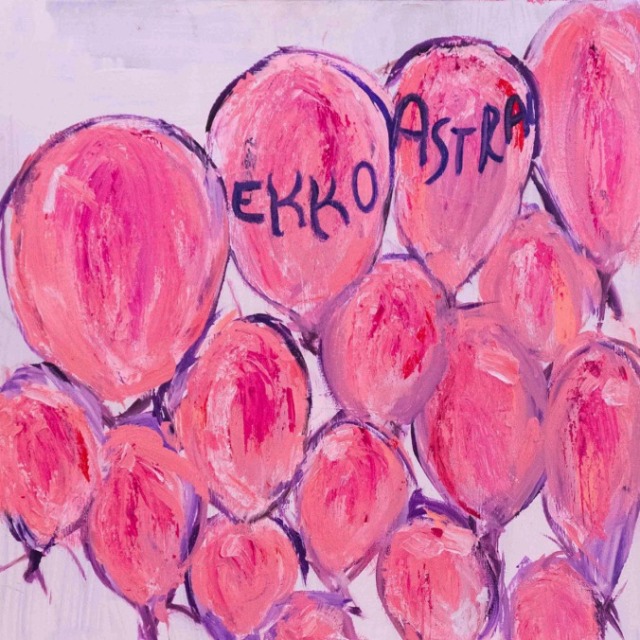 Considering the legacy of D.C.’s 40-year punk history—as groups like Bad Brains, Minor Threat, Fugazi, The Faith and Scream helped lay the hardcore foundation that’s still plugged into the city’s spirit—Ekko Astral fit right into a mold built for them to thrive in. And still, it feels like a small miracle that they’ve been able to break out like this. Born from Holzman and Hughes’ friendship after meeting each other as students at the University of Vermont, Ekko Astral embody the scene that made them—and, in an era where “scene” music is growing thinner and thinner, the release of pink balloons feels like a righteous and radical victory lap before the race has even started. And few bands have ever really achieved that sort of open-and-shut firepower. Normally it takes some groups a couple of records to get their wheels spinning; Ekko Astral and their “mascara mosh pit” sound are a beacon of joy and breaking points—through the noise of 11 tracks comes a resounding sense of urgent, non-negotiable optimism. What sticks out most about pink balloons is Ekko Astral’s commitment to singing like their generation speaks, which is how you get a barn-burning, circuit-breaking masher like “uwu type beat,” where Holzman, like a glitched-out, Kim Deal-like messenger, bemoans learning to love online and the “empty suit guys” who abuse TouchTunes at the bar. But such era-specific language and cultural references never register like they will become outdated as soon as the next wave of slang is built or the next lineage of celebrities grab hold of their 15 minutes of fame. Instead, like all good punk records we’ve been returning to for 40 years, the music of pink balloons comes across like an archive that captures a moment that will, someday, look different but sound the same. —Matt Mitchell [Topshelf]
Considering the legacy of D.C.’s 40-year punk history—as groups like Bad Brains, Minor Threat, Fugazi, The Faith and Scream helped lay the hardcore foundation that’s still plugged into the city’s spirit—Ekko Astral fit right into a mold built for them to thrive in. And still, it feels like a small miracle that they’ve been able to break out like this. Born from Holzman and Hughes’ friendship after meeting each other as students at the University of Vermont, Ekko Astral embody the scene that made them—and, in an era where “scene” music is growing thinner and thinner, the release of pink balloons feels like a righteous and radical victory lap before the race has even started. And few bands have ever really achieved that sort of open-and-shut firepower. Normally it takes some groups a couple of records to get their wheels spinning; Ekko Astral and their “mascara mosh pit” sound are a beacon of joy and breaking points—through the noise of 11 tracks comes a resounding sense of urgent, non-negotiable optimism. What sticks out most about pink balloons is Ekko Astral’s commitment to singing like their generation speaks, which is how you get a barn-burning, circuit-breaking masher like “uwu type beat,” where Holzman, like a glitched-out, Kim Deal-like messenger, bemoans learning to love online and the “empty suit guys” who abuse TouchTunes at the bar. But such era-specific language and cultural references never register like they will become outdated as soon as the next wave of slang is built or the next lineage of celebrities grab hold of their 15 minutes of fame. Instead, like all good punk records we’ve been returning to for 40 years, the music of pink balloons comes across like an archive that captures a moment that will, someday, look different but sound the same. —Matt Mitchell [Topshelf]
Read: “Ekko Astral: The Best of What’s Next”
82. NxWorries: Why Lawd?
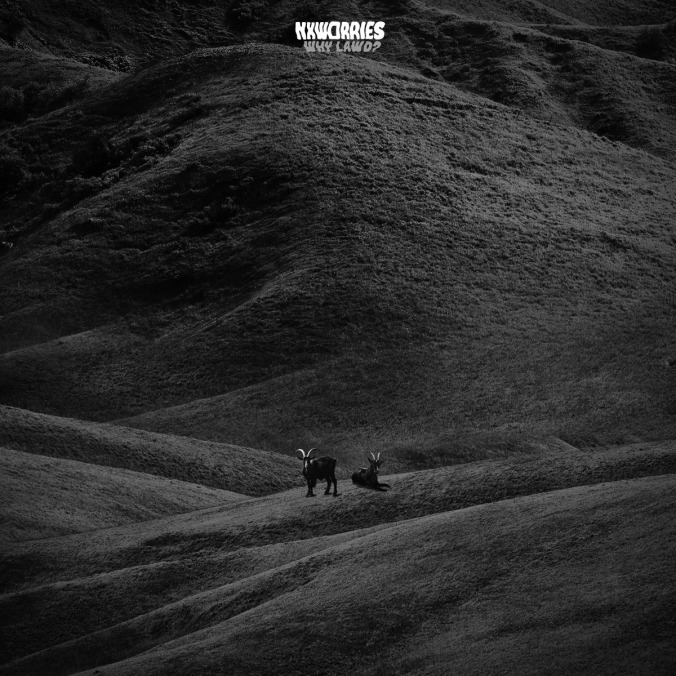 Coming into 2024, it had been nearly eight years since NxWorries last dropped a full-length project (Yes Lawd!), but Anderson .Paak and Knxwledge ended the drought in June with Why Lawd?, an R&B record that eclipses its predecessor in full. Calling upon Thundercat, H.E.R., Snoop Dogg, Charlie Wilson, Earl Sweatshirt and others, NxWorries transcend supergroup status by making a bonafide opus summoning the legacies of Monica, Black Dynamite, Motown and Miami Vice. Paak’s lyricism here is some of his best, as he presents himself as a flawed person, singing about survivor’s guilt (“MoveOn”), doomscrolling (“HereIAm”), emotional unavailablity (“FromHere”) and horniness (“Where I Go”) with a frankness that balances anger, pity and joy. Why Lawd? is a record about losing yourself, constructed with unflinching honesty and stitched together by Knxwledge’s whip-smart production and deeply present affection for gospel and Berry Gordy and all the solid gold left in-between. —Matt Mitchell [Stones Throw]
Coming into 2024, it had been nearly eight years since NxWorries last dropped a full-length project (Yes Lawd!), but Anderson .Paak and Knxwledge ended the drought in June with Why Lawd?, an R&B record that eclipses its predecessor in full. Calling upon Thundercat, H.E.R., Snoop Dogg, Charlie Wilson, Earl Sweatshirt and others, NxWorries transcend supergroup status by making a bonafide opus summoning the legacies of Monica, Black Dynamite, Motown and Miami Vice. Paak’s lyricism here is some of his best, as he presents himself as a flawed person, singing about survivor’s guilt (“MoveOn”), doomscrolling (“HereIAm”), emotional unavailablity (“FromHere”) and horniness (“Where I Go”) with a frankness that balances anger, pity and joy. Why Lawd? is a record about losing yourself, constructed with unflinching honesty and stitched together by Knxwledge’s whip-smart production and deeply present affection for gospel and Berry Gordy and all the solid gold left in-between. —Matt Mitchell [Stones Throw]
81. YATTA: PALM WINE
 On PALM WINE, the Sierra Leonean-American composer, improviser, producer and vocalist YATTA leans into a folksy, jazzy-pop that is rich with electronic textures and snip-its from the world around her. Hits like “Fully Lost, Fully Found” and “Put Your Faith in God” play with ethereality and more propulsive motion, bringing forth a more inquisitive, unpredictable pop; “Too Good,” featuring fellow conceptual vocalist STEFA*, is especially groovy. PALM WINE links YATTA’s contemporary practice with that of her granduncle, S.E. Rogie, whose work popularized the West African-Portuguese synthesis genre Palm Wine. You can hear the playful, locomotive components of Palm Wine throughout YATTA’s compositions, but the way she darts between melodic and deconstructed pop, enriched by archival recordings and spoken word, makes for a well-rounded listen. —Devon Chodzin [PTP]
On PALM WINE, the Sierra Leonean-American composer, improviser, producer and vocalist YATTA leans into a folksy, jazzy-pop that is rich with electronic textures and snip-its from the world around her. Hits like “Fully Lost, Fully Found” and “Put Your Faith in God” play with ethereality and more propulsive motion, bringing forth a more inquisitive, unpredictable pop; “Too Good,” featuring fellow conceptual vocalist STEFA*, is especially groovy. PALM WINE links YATTA’s contemporary practice with that of her granduncle, S.E. Rogie, whose work popularized the West African-Portuguese synthesis genre Palm Wine. You can hear the playful, locomotive components of Palm Wine throughout YATTA’s compositions, but the way she darts between melodic and deconstructed pop, enriched by archival recordings and spoken word, makes for a well-rounded listen. —Devon Chodzin [PTP]
80. Brittany Howard: What Now
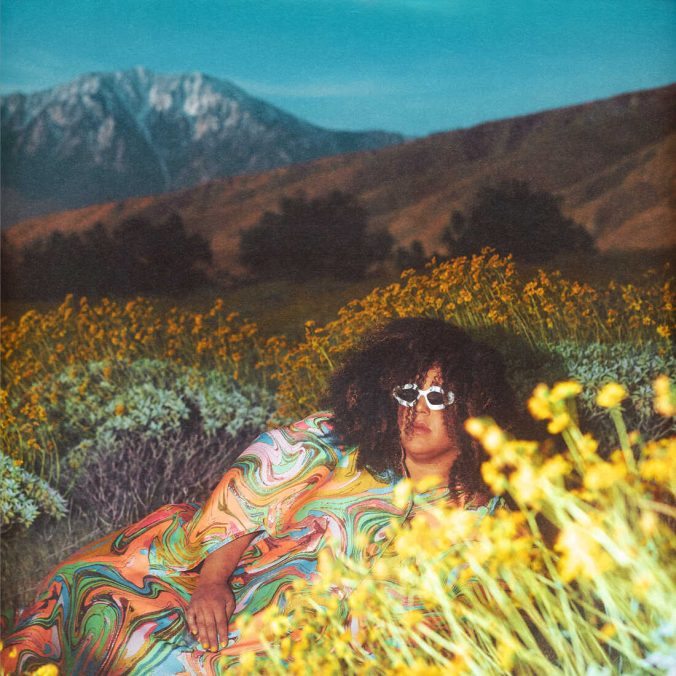 Relationship blues, healing, making sense of self-sabotaging patterns in friendships and romance are all explored through a jazzy, upbeat, audacious and vulnerable lens on What Now. The album is trimmed of subcutaneous sound, rounding out at just under 38-and-a-half minutes. Brittany Howard is here for a good time, not a long time, and bluesy earworms like “Prove It To You” and “Power To Undo” get under your skin, fizzle in your bloodstream and get your toes tapping and then, as cleanly as they began, wrap up neatly. There’s a confidence and vulnerability Howard fearlessly reveals on this album, which is more adventurous and riskier than Jaime. The Prince-inspired, funk-infused “Prove It To You,” with its brilliant, unabashed, funky soul, finds Howard contrasting the album’s soundscape by dialing back the drama, which is especially noticeable on closing track, “Every Color In Blue.” When Howard made her home in a spacious Nashville cottage just prior to the pandemic hitting, the garage became a space for collecting vintage recording gear and the ghosts of past greats, like James Brown, lurk within the buzzy guitar and buoyant bass in What Now. Contrasted with the nostalgic blues and funk of the 1970s is a glimmer of contemporary New Age elements—think bells, crystals, tarot, psychic energies and astrology. What Now addresses big themes—love, life and destruction—and, in places, it delivers a massive, eclectic sound. —Cat Woods [Island]
Relationship blues, healing, making sense of self-sabotaging patterns in friendships and romance are all explored through a jazzy, upbeat, audacious and vulnerable lens on What Now. The album is trimmed of subcutaneous sound, rounding out at just under 38-and-a-half minutes. Brittany Howard is here for a good time, not a long time, and bluesy earworms like “Prove It To You” and “Power To Undo” get under your skin, fizzle in your bloodstream and get your toes tapping and then, as cleanly as they began, wrap up neatly. There’s a confidence and vulnerability Howard fearlessly reveals on this album, which is more adventurous and riskier than Jaime. The Prince-inspired, funk-infused “Prove It To You,” with its brilliant, unabashed, funky soul, finds Howard contrasting the album’s soundscape by dialing back the drama, which is especially noticeable on closing track, “Every Color In Blue.” When Howard made her home in a spacious Nashville cottage just prior to the pandemic hitting, the garage became a space for collecting vintage recording gear and the ghosts of past greats, like James Brown, lurk within the buzzy guitar and buoyant bass in What Now. Contrasted with the nostalgic blues and funk of the 1970s is a glimmer of contemporary New Age elements—think bells, crystals, tarot, psychic energies and astrology. What Now addresses big themes—love, life and destruction—and, in places, it delivers a massive, eclectic sound. —Cat Woods [Island]
Read: “Brittany Howard’s Dreamworld”
79. Amaro Freitas: Y’Y
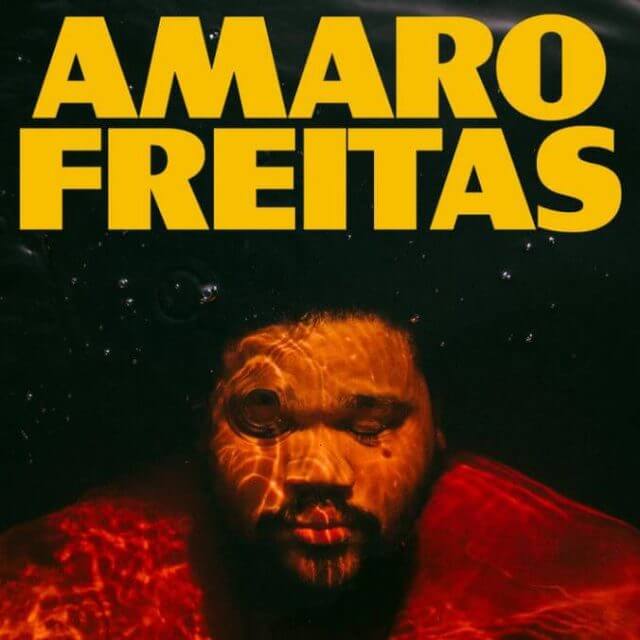 Y’Y, the latest composition from Brazilian jazz pianist Amaro Freitas, pays homage to the Amazon Forest and the rivers of Northern Brazil. With an ensemble of players like Jeff Parker, Shabaka Hutchings, Hamid Drake, Aniel Someillan and Brandee Younger, Freitas merges field recordings inspired by his time spent needling around in the Amazon basin with an engaging and kind response to the ongoing climate crisis. Y’Y makes good work of, as Freitas put it, recognizing nature “as our ancestor,” and chapters like “Mar de Cirandeiras” and “Gloriosa” are quietly powerful, as no piece of the band overpowers itself. Rather, it’s a living, breathing archival of the color and vibrancy just beyond us. With Freitas’s piano front-and-center, the quiet anthems of Y’Y rest on the shoulders of respect—and it’s the kind of ornate, empathetic musicality that never retreats, only surrendering itself to wonders surrounding it when chords and scales can no longer encapsulate the vividness. —Matt Mitchell [Psychic Hotline]
Y’Y, the latest composition from Brazilian jazz pianist Amaro Freitas, pays homage to the Amazon Forest and the rivers of Northern Brazil. With an ensemble of players like Jeff Parker, Shabaka Hutchings, Hamid Drake, Aniel Someillan and Brandee Younger, Freitas merges field recordings inspired by his time spent needling around in the Amazon basin with an engaging and kind response to the ongoing climate crisis. Y’Y makes good work of, as Freitas put it, recognizing nature “as our ancestor,” and chapters like “Mar de Cirandeiras” and “Gloriosa” are quietly powerful, as no piece of the band overpowers itself. Rather, it’s a living, breathing archival of the color and vibrancy just beyond us. With Freitas’s piano front-and-center, the quiet anthems of Y’Y rest on the shoulders of respect—and it’s the kind of ornate, empathetic musicality that never retreats, only surrendering itself to wonders surrounding it when chords and scales can no longer encapsulate the vividness. —Matt Mitchell [Psychic Hotline]
78. Chris Acker: Famous Lunch
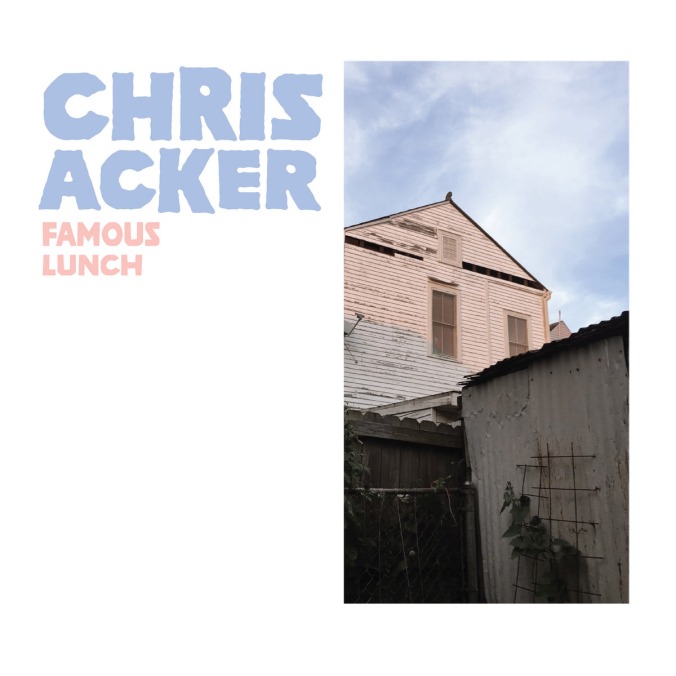 The songs on Chris Acker’s Famous Lunch are gross and devastating, folk earworms that take cues from George Saunders in nastiness and Frank O’Hara in beauty. Though the title plays into the gnarly humor that often populates Acker’s songwriting, “Shit Surprise” is tender and sticky-sweet. “How we’d match our breath in the upstairs room,” he sings, “and we’d hold together ’til I smelled like you.” With Nikolai Shveitser’s pedal steel and Sam Gelband’s snare drum waltzing behind him, Acker enchants during the “but now it smells like I stepped in it, shit surprise” chorus that, when fused with the band’s backing harmonies, binds the whole song together. Acker, ever a man whose work is aglow with countless juxtapositions, fills a sentence beautifully with lines like “I feel her like a pulse in a cut on my thumb” and “I hear you brushing your tongue.” It’s a synergy hunkered down in delicious harmony. Jaw pops, bread slices and cilantro getting confused with parsley all come into focus, as Acker lets out one final thought: “I thought I’d grow up to love you by now.” The chugging melody and Acker’s curiosity on “Wouldn’t Do For You (Buddy)” makes for a striking gentleness: “These parentheses around our smiles hold that secret vague and tired,” he sings. “And I don’t ever speak of it, ‘cause nothing ever came of this. Those pomegranates I keep for you, lay them on the linen and they bleed right through.” Gelband’s snare hits rupture through the arrangement like a throbbing cut. Famous Lunch is as romantic as it is peculiar, comfortable in its own confusion and ready to love in its own light. “Stubborn Eyes” gets drunk on that sweet, sweet Ackerian earnestness, as he sings about a father and a son riffing through unorthodox, oft-toxic gestures of love. “Stole the motor off a mower at a country club, built a mini-bike and made it run,” he reckons. “No one would catch him in Evanston, except the hands of his dad that fell on him.” But all comes circling back through loud and quick talk, where feet are between lips and whims get followed “like birds carry seeds.” Caught someplace between Jerry Reed and Gram Parsons, Famous Lunch is a world ridden hard, put away wet and full of fragility, boundless, unpredictable love and one-liners that’ll make you cry, laugh and puke—in that order. —Matt Mitchell [Gar Hole Records]
The songs on Chris Acker’s Famous Lunch are gross and devastating, folk earworms that take cues from George Saunders in nastiness and Frank O’Hara in beauty. Though the title plays into the gnarly humor that often populates Acker’s songwriting, “Shit Surprise” is tender and sticky-sweet. “How we’d match our breath in the upstairs room,” he sings, “and we’d hold together ’til I smelled like you.” With Nikolai Shveitser’s pedal steel and Sam Gelband’s snare drum waltzing behind him, Acker enchants during the “but now it smells like I stepped in it, shit surprise” chorus that, when fused with the band’s backing harmonies, binds the whole song together. Acker, ever a man whose work is aglow with countless juxtapositions, fills a sentence beautifully with lines like “I feel her like a pulse in a cut on my thumb” and “I hear you brushing your tongue.” It’s a synergy hunkered down in delicious harmony. Jaw pops, bread slices and cilantro getting confused with parsley all come into focus, as Acker lets out one final thought: “I thought I’d grow up to love you by now.” The chugging melody and Acker’s curiosity on “Wouldn’t Do For You (Buddy)” makes for a striking gentleness: “These parentheses around our smiles hold that secret vague and tired,” he sings. “And I don’t ever speak of it, ‘cause nothing ever came of this. Those pomegranates I keep for you, lay them on the linen and they bleed right through.” Gelband’s snare hits rupture through the arrangement like a throbbing cut. Famous Lunch is as romantic as it is peculiar, comfortable in its own confusion and ready to love in its own light. “Stubborn Eyes” gets drunk on that sweet, sweet Ackerian earnestness, as he sings about a father and a son riffing through unorthodox, oft-toxic gestures of love. “Stole the motor off a mower at a country club, built a mini-bike and made it run,” he reckons. “No one would catch him in Evanston, except the hands of his dad that fell on him.” But all comes circling back through loud and quick talk, where feet are between lips and whims get followed “like birds carry seeds.” Caught someplace between Jerry Reed and Gram Parsons, Famous Lunch is a world ridden hard, put away wet and full of fragility, boundless, unpredictable love and one-liners that’ll make you cry, laugh and puke—in that order. —Matt Mitchell [Gar Hole Records]
77. Tex Patrello: Minotaur
 In an indie landscape where so much new music can feel like a facsimile of a facsimile of a genre or scene long buried and gone, it’s rare to find something as startlingly inventive and strange as Minotaur, the debut full-length album by Dallas-based musician Tex Patrello. It’s a vulgar shotgun wedding between the sacred and profane set to swirls of surreal psychedelia—weaving bagpipes, glitchy layers of vocals and baby-voiced cheerleading chants into images of Americana, teen romance and pimps cruising outside fast-casual chain restaurants. From the limping stomp of “Long Lost Pimp” to the mechanical whirl of the outro on “Anything Goes” to the cinematic, orchestral swells of closer “De Kalb,” Patrello recounts each seedy vignette in an airy confection of a voice, conducting the chaos with so much conviction that you can’t help but be swept into her off-kilter orbit. After a while, the druggy delirium feels more like lovesickness, intoxicating in even its most sinister turns. It’s a challenging, swoon-worthy listen you’ll find yourself reaching for again and again—if only to marvel at how she got away with it in the first place. —Elise Soutar [Self-Released]
In an indie landscape where so much new music can feel like a facsimile of a facsimile of a genre or scene long buried and gone, it’s rare to find something as startlingly inventive and strange as Minotaur, the debut full-length album by Dallas-based musician Tex Patrello. It’s a vulgar shotgun wedding between the sacred and profane set to swirls of surreal psychedelia—weaving bagpipes, glitchy layers of vocals and baby-voiced cheerleading chants into images of Americana, teen romance and pimps cruising outside fast-casual chain restaurants. From the limping stomp of “Long Lost Pimp” to the mechanical whirl of the outro on “Anything Goes” to the cinematic, orchestral swells of closer “De Kalb,” Patrello recounts each seedy vignette in an airy confection of a voice, conducting the chaos with so much conviction that you can’t help but be swept into her off-kilter orbit. After a while, the druggy delirium feels more like lovesickness, intoxicating in even its most sinister turns. It’s a challenging, swoon-worthy listen you’ll find yourself reaching for again and again—if only to marvel at how she got away with it in the first place. —Elise Soutar [Self-Released]
76. Clairo: Charm
 Where Sling narrowed, Charm expands; Clairo reprises her sophomore LP’s live analog instrumentation and doubles down on her hand of horns, woodwinds and synths. While Sling had a thin atmosphere—one that dispersed like smoke around a fire, sort of hiding her hyper-compressed vocals behind the orchestration—Charm finds her crisper than ever. She’s clear, upfront and conducting the show with co-producer Leon Michels of the lo-fi soul jazz outfit El Michels Affair and of Dan Auerbach’s psych-rock band the Arcs. After isolating, Clairo is even more lyrically present, finally emerging from her shell on slow waltz “Terrapin.” “We’re all afraid and shy away,” she reckons, “but now I find I guess I don’t shy.” Like Sling, most songs on Charm are still only a slight foot tap. Flutes often become harmonies. Harmonies become more harmonies, as vocals are double-tracked and layered over each other like that of Elliott Smith or Judee Sill. Now, with assistance from players in the Menahan Street Band, Charm is anchored by more psychedelic and jazzy undertones—a clear example of Michels’s influence. On “Echo,” a stuttering organ and dripping tremolo creates something like Portishead if they were a lounge band, as does the trip-hop beat—created from Clairo’s own giggle—in “Second Nature,” which swivels alongside bouncing staccato keys. “Our love is meant to be shared / While our love goes nowhere” sings Clairo in “Echo,” before the song pulses into a vamp. “Juna” similarly swings, as a twinkling piano rises and falls like a fluttering stomach. Clairo gets a mouth trumpet solo before a full band—with real trumpets—comes in and soars, letting the butterflies take flight.“I don’t get too intimate / Why would I let you in?” she hesitates. “But, I think again.” —Sam Small [Self-Released]
Where Sling narrowed, Charm expands; Clairo reprises her sophomore LP’s live analog instrumentation and doubles down on her hand of horns, woodwinds and synths. While Sling had a thin atmosphere—one that dispersed like smoke around a fire, sort of hiding her hyper-compressed vocals behind the orchestration—Charm finds her crisper than ever. She’s clear, upfront and conducting the show with co-producer Leon Michels of the lo-fi soul jazz outfit El Michels Affair and of Dan Auerbach’s psych-rock band the Arcs. After isolating, Clairo is even more lyrically present, finally emerging from her shell on slow waltz “Terrapin.” “We’re all afraid and shy away,” she reckons, “but now I find I guess I don’t shy.” Like Sling, most songs on Charm are still only a slight foot tap. Flutes often become harmonies. Harmonies become more harmonies, as vocals are double-tracked and layered over each other like that of Elliott Smith or Judee Sill. Now, with assistance from players in the Menahan Street Band, Charm is anchored by more psychedelic and jazzy undertones—a clear example of Michels’s influence. On “Echo,” a stuttering organ and dripping tremolo creates something like Portishead if they were a lounge band, as does the trip-hop beat—created from Clairo’s own giggle—in “Second Nature,” which swivels alongside bouncing staccato keys. “Our love is meant to be shared / While our love goes nowhere” sings Clairo in “Echo,” before the song pulses into a vamp. “Juna” similarly swings, as a twinkling piano rises and falls like a fluttering stomach. Clairo gets a mouth trumpet solo before a full band—with real trumpets—comes in and soars, letting the butterflies take flight.“I don’t get too intimate / Why would I let you in?” she hesitates. “But, I think again.” —Sam Small [Self-Released]
75. 1010benja: Ten Total
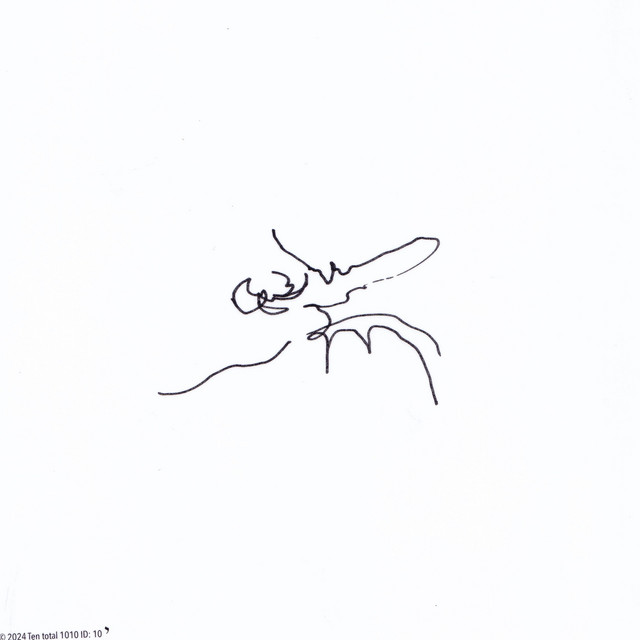 Years after making his grand entrance with 2017’s “Boofiness,” 1010Benja’s full-length debut arrived in the form of Ten Total. It encompasses his variegated, eclectic influences, which include everyone from Hideo Kojima to John Frusciante, in a concise, ten-track (of course!) package. He’ll go from acrobatic raps about reading Alan Moore, to gospel belts on “Twin,” to nonsensical onomatopoeia on “Penta.” As its name implies, Ten Total captures 1010’s totality. It’s not an easy task. —Grant Sharples [Three Six Zero]
Years after making his grand entrance with 2017’s “Boofiness,” 1010Benja’s full-length debut arrived in the form of Ten Total. It encompasses his variegated, eclectic influences, which include everyone from Hideo Kojima to John Frusciante, in a concise, ten-track (of course!) package. He’ll go from acrobatic raps about reading Alan Moore, to gospel belts on “Twin,” to nonsensical onomatopoeia on “Penta.” As its name implies, Ten Total captures 1010’s totality. It’s not an easy task. —Grant Sharples [Three Six Zero]
74. Trent Reznor & Atticus Ross: Challengers
 I don’t usually care about tennis, but put Trent Reznor and Atticus Ross’s propulsive, throbbing soundtrack to Challengers behind anything, even paint drying, and you’ll find yourself riveted. This is Reznor and Ross’ second collaboration with director Luca Guadagnino, the first being Bones and All, but the Challengers album easily outshines that one with its kinetic, Berlin techno-inspired sound. The fun, sexy tennis movie has fun, sexy music to match: The ping-ponging beat of “Brutalizer” gets the heart racing from the get-go, and the neon pangs of synth on “Yeah x10” transform any quotidian moment into a laser-focused, all-or-nothing battle for the ages. The pair masterfully build tension across the soundtrack, allowing the heat to abate for songs like the aptly named “Lullaby” and the choral serenity of “Friday Afternoons, Op. 7: A New Year Carol.” Needless to say, Challengers is an ace of an album. —Clare Martin [Milan]
I don’t usually care about tennis, but put Trent Reznor and Atticus Ross’s propulsive, throbbing soundtrack to Challengers behind anything, even paint drying, and you’ll find yourself riveted. This is Reznor and Ross’ second collaboration with director Luca Guadagnino, the first being Bones and All, but the Challengers album easily outshines that one with its kinetic, Berlin techno-inspired sound. The fun, sexy tennis movie has fun, sexy music to match: The ping-ponging beat of “Brutalizer” gets the heart racing from the get-go, and the neon pangs of synth on “Yeah x10” transform any quotidian moment into a laser-focused, all-or-nothing battle for the ages. The pair masterfully build tension across the soundtrack, allowing the heat to abate for songs like the aptly named “Lullaby” and the choral serenity of “Friday Afternoons, Op. 7: A New Year Carol.” Needless to say, Challengers is an ace of an album. —Clare Martin [Milan]
73. Mount Eerie: Night Palace
 With Night Palace, Phil Elverum builds a bridge between his past and present, creating an album that feels both like a summation and an evolution of his storied career. Mount Eerie’s 81-minute opus is a whopping 26 tracks (including a 12-minute spoken-word piece!), all in service of weaving together Elverum’s diverse musical threads—spanning the raw, elemental force of early Mount Eerie, the stark minimalism of his recent grief-centered work, and newfound sonic territories. Tracks like “Broom of Wind” shimmer with layered arrangements, easily gliding through hope and sorrow, while the jarring, noise-heavy “Swallowed Alive” feels like a return to “Samurai Sword” form (of The Glow Pt. 2), interrupting the gentleness of the songs around it and forcing the listener back to cognizance—but it, too, boasts a newness: a feature from Elverum’s young daughter, Agathe, simply because, as he put it, “I knew that I couldn’t scream as well as she could.” Night Palace treks through the varying tragedies of life and living it: spanning Alzheimer’s to colonization, individual grief to mass genocide. But the record is in constant conversation with not only the world around but the world within, and even the world that came before; self-referential tracks like “I Saw Another Bird” cheekily dismiss the meaning Elverum himself once granted to birds in his 2017 masterwork A Crow Looked at Me (“So what? I saw another raven,” the song begins, “I see them all the time”) before doubling down on the general feeling of it all, insisting that “There is another world inside this one / It shines: / These birds trying for my attention / And my wordless reply.” From the sprawling, experimental folk of The Glow, Pt. 2 (which Elverum released under the moniker of The Microphones) to the devastating quietude of A Crow Looked at Me, Elverum has always been a master of crafting intimate universes, where existential musings meet the tangible details of everyday life. Night Palace revisits these themes with a newfound sense of expansiveness and reconciliation—a willingness to embrace complexity without being consumed by it, and perhaps that makes all the difference. —Casey Epstein-Gross [P.W. Elverum & Sun]
With Night Palace, Phil Elverum builds a bridge between his past and present, creating an album that feels both like a summation and an evolution of his storied career. Mount Eerie’s 81-minute opus is a whopping 26 tracks (including a 12-minute spoken-word piece!), all in service of weaving together Elverum’s diverse musical threads—spanning the raw, elemental force of early Mount Eerie, the stark minimalism of his recent grief-centered work, and newfound sonic territories. Tracks like “Broom of Wind” shimmer with layered arrangements, easily gliding through hope and sorrow, while the jarring, noise-heavy “Swallowed Alive” feels like a return to “Samurai Sword” form (of The Glow Pt. 2), interrupting the gentleness of the songs around it and forcing the listener back to cognizance—but it, too, boasts a newness: a feature from Elverum’s young daughter, Agathe, simply because, as he put it, “I knew that I couldn’t scream as well as she could.” Night Palace treks through the varying tragedies of life and living it: spanning Alzheimer’s to colonization, individual grief to mass genocide. But the record is in constant conversation with not only the world around but the world within, and even the world that came before; self-referential tracks like “I Saw Another Bird” cheekily dismiss the meaning Elverum himself once granted to birds in his 2017 masterwork A Crow Looked at Me (“So what? I saw another raven,” the song begins, “I see them all the time”) before doubling down on the general feeling of it all, insisting that “There is another world inside this one / It shines: / These birds trying for my attention / And my wordless reply.” From the sprawling, experimental folk of The Glow, Pt. 2 (which Elverum released under the moniker of The Microphones) to the devastating quietude of A Crow Looked at Me, Elverum has always been a master of crafting intimate universes, where existential musings meet the tangible details of everyday life. Night Palace revisits these themes with a newfound sense of expansiveness and reconciliation—a willingness to embrace complexity without being consumed by it, and perhaps that makes all the difference. —Casey Epstein-Gross [P.W. Elverum & Sun]
Read: “The Rituals of Mount Eerie”
72. Still House Plants: If I don’t make it, I love u
 Still House Plants have gathered some steam as a trio of artsy freaks whose experimental take on rock is impossible to ignore. With If I don’t make it, I love u, the band’s wobbly rhythms and peculiar lyrics are on full display, each element presented equally so that your consciousness bounces between Finlay Clark’s guitar, David Kennedy’s drums and Jess Hickie-Kallenbach’s vocals. That said, the way Hickie-Kallenbach can draw out one word into a true focal point really sells the music: How she hangs onto “called” in the line “I wish I was called Makita” on “M M M” is enrapturing. The way she barrels through the repeated phrase “Words of a boring angel” on “MORE BOY” feels like little fireworks in your ears. The emotion is slowly explosive, coming in bursts throughout, awkwardly and inconveniently, much more true to form. —Devon Chodzin [Bison Records]
Still House Plants have gathered some steam as a trio of artsy freaks whose experimental take on rock is impossible to ignore. With If I don’t make it, I love u, the band’s wobbly rhythms and peculiar lyrics are on full display, each element presented equally so that your consciousness bounces between Finlay Clark’s guitar, David Kennedy’s drums and Jess Hickie-Kallenbach’s vocals. That said, the way Hickie-Kallenbach can draw out one word into a true focal point really sells the music: How she hangs onto “called” in the line “I wish I was called Makita” on “M M M” is enrapturing. The way she barrels through the repeated phrase “Words of a boring angel” on “MORE BOY” feels like little fireworks in your ears. The emotion is slowly explosive, coming in bursts throughout, awkwardly and inconveniently, much more true to form. —Devon Chodzin [Bison Records]
71. Vampire Weekend: Only God Was Above Us
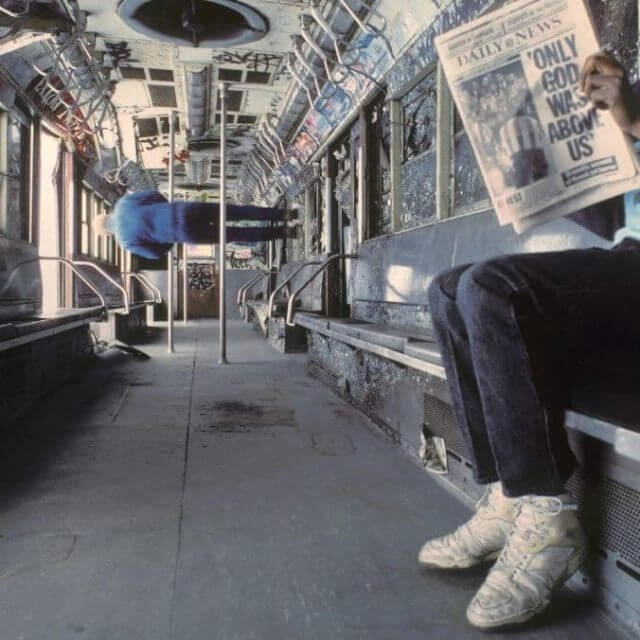 All told, the album is as good as anything the New York City-formed rockers have ever made (which is to say, very good), and it features a little DNA from everything they’ve ever put out: a sibling to their self-titled debut, a cousin to Contra and the rebellious nephew of 2013’s Modern Vampires. It even shares some similarities with their most recent offspring, Father of the Bride. But for each of that last album’s sunbeams, Only God Was Above Us has a sky of lightning bolts. It’s at times darker and weirder, but it’s not depressing. It’s like getting older: Strange and sometimes sad discoveries appear around every corner, often exposing more questions than answers, but with them comes time-earned satisfaction. One of those questions that might come with age is what mark are we leaving on this world. Koenig doesn’t seem to be all that concerned with individual legacy, but throughout Only God Was Above Us, he spends a good deal of time playing with the idea of generational imprints. Each generation both creates disasters and is doomed to deal with the disasters made by the one before it, all while laying a foundation for the culture: the fashion, music, food and sports stories that will define us. Koenig says as much on the feisty “Gen-X Cops”: “It’s by design and consequentially / Each generation makes its own apology.” The stunning “Mary Boone,” which starts as a Father of the Bride-like ballad, eventually unravels into a hypnotic soundscape not all that unlike “Step.” “Capricorn” couldn’t sound more different from the mostly chipper “Diane Young,” another track from Modern Vampires of the City, but the two could be in conversation. “Diane” says: “Nobody knows what the future holds / Said it’s bad enough just getting old.” And on “Capricorn,” “Diane Young” is swapped out for its homophone “dying young”: “Too old for dying young / Too young to live alone,” Koenig sings. “Sifting through centuries / For moments of your own.” Every song seems to have some connection to a New York City folktale, landmark or character. But if the album begins with the stereotypical NYC attitude of “Fuck the world” (“Ice Cream Piano”), it overrides that kind of mindset by the end: “The enemy’s invincible / I hope you let it go.” Koenig spins his own story into New York’s vast history, happy to visit the past but never swallowed by it. —Ellen Johnson [Columbia]
All told, the album is as good as anything the New York City-formed rockers have ever made (which is to say, very good), and it features a little DNA from everything they’ve ever put out: a sibling to their self-titled debut, a cousin to Contra and the rebellious nephew of 2013’s Modern Vampires. It even shares some similarities with their most recent offspring, Father of the Bride. But for each of that last album’s sunbeams, Only God Was Above Us has a sky of lightning bolts. It’s at times darker and weirder, but it’s not depressing. It’s like getting older: Strange and sometimes sad discoveries appear around every corner, often exposing more questions than answers, but with them comes time-earned satisfaction. One of those questions that might come with age is what mark are we leaving on this world. Koenig doesn’t seem to be all that concerned with individual legacy, but throughout Only God Was Above Us, he spends a good deal of time playing with the idea of generational imprints. Each generation both creates disasters and is doomed to deal with the disasters made by the one before it, all while laying a foundation for the culture: the fashion, music, food and sports stories that will define us. Koenig says as much on the feisty “Gen-X Cops”: “It’s by design and consequentially / Each generation makes its own apology.” The stunning “Mary Boone,” which starts as a Father of the Bride-like ballad, eventually unravels into a hypnotic soundscape not all that unlike “Step.” “Capricorn” couldn’t sound more different from the mostly chipper “Diane Young,” another track from Modern Vampires of the City, but the two could be in conversation. “Diane” says: “Nobody knows what the future holds / Said it’s bad enough just getting old.” And on “Capricorn,” “Diane Young” is swapped out for its homophone “dying young”: “Too old for dying young / Too young to live alone,” Koenig sings. “Sifting through centuries / For moments of your own.” Every song seems to have some connection to a New York City folktale, landmark or character. But if the album begins with the stereotypical NYC attitude of “Fuck the world” (“Ice Cream Piano”), it overrides that kind of mindset by the end: “The enemy’s invincible / I hope you let it go.” Koenig spins his own story into New York’s vast history, happy to visit the past but never swallowed by it. —Ellen Johnson [Columbia]
70. Tasha: All This and So Much More
 All This and So Much More is about losing yourself and the people around you, be it through disconnection or through relationships ending. But so many of Tasha’s songs return to a set of questions: “What else do we have?” “What else is left?” “What can we turn to?” “So Much More,” “Fall Away” and “Love’s Changing” present paths for her, as she continues her endless search for finding out what kind of artist she can be or she’s supposed to be or wants to be. Songs like “Party” and “Michigan” are so good because, upon each revisit, you find a new and generous element to focus on. But the song that sticks with me on every listen is “Love’s Changing,” as I find myself so devastated by the “I’ve loved so I know now what loss is” line. It’s either a mic drop or stitches coming undone or both. “Be Better” was a song Tasha wrote at the peak of a post-breakup heartbreak, and lines like “Catch my breath when I find your eyes on my body, hungry and sore I’ll dissolve here” and “Lean my face into the sun, brace myself while I watch you run fast and far away more and more each day” make for a vulnerability that she’s never reached so far inwards for in her songwriting. All This and So Much More is a vehicle for Tasha to lean into her own melodrama, unspooling from the threads of contained openness that really contoured the fault-lines of her 2021 album Tell Me What You Miss the Most’s emotional trenches. While you wouldn’t immediately connect the dots between a record like Illinois and All This and So Much More, I find comfort in Tasha’s work in the same way I do Sufjan Stevens’s. If we’ve learned anything about Sufjan’s work, it’s that the magic doesn’t come until it’s in the hands of those who are listening and those who need it. His stories exist to be translated, as do Tasha’s, and her music affirms that—how empty rooms and pink light and perfume and dancing can all look the same in the shadows of joy and grief. “You could have all this,” she gestures, before welcoming herself into life’s challenging measure of love, hope and loss. “I could have all this and so much more.” —Matt Mitchell [Bayonet]
All This and So Much More is about losing yourself and the people around you, be it through disconnection or through relationships ending. But so many of Tasha’s songs return to a set of questions: “What else do we have?” “What else is left?” “What can we turn to?” “So Much More,” “Fall Away” and “Love’s Changing” present paths for her, as she continues her endless search for finding out what kind of artist she can be or she’s supposed to be or wants to be. Songs like “Party” and “Michigan” are so good because, upon each revisit, you find a new and generous element to focus on. But the song that sticks with me on every listen is “Love’s Changing,” as I find myself so devastated by the “I’ve loved so I know now what loss is” line. It’s either a mic drop or stitches coming undone or both. “Be Better” was a song Tasha wrote at the peak of a post-breakup heartbreak, and lines like “Catch my breath when I find your eyes on my body, hungry and sore I’ll dissolve here” and “Lean my face into the sun, brace myself while I watch you run fast and far away more and more each day” make for a vulnerability that she’s never reached so far inwards for in her songwriting. All This and So Much More is a vehicle for Tasha to lean into her own melodrama, unspooling from the threads of contained openness that really contoured the fault-lines of her 2021 album Tell Me What You Miss the Most’s emotional trenches. While you wouldn’t immediately connect the dots between a record like Illinois and All This and So Much More, I find comfort in Tasha’s work in the same way I do Sufjan Stevens’s. If we’ve learned anything about Sufjan’s work, it’s that the magic doesn’t come until it’s in the hands of those who are listening and those who need it. His stories exist to be translated, as do Tasha’s, and her music affirms that—how empty rooms and pink light and perfume and dancing can all look the same in the shadows of joy and grief. “You could have all this,” she gestures, before welcoming herself into life’s challenging measure of love, hope and loss. “I could have all this and so much more.” —Matt Mitchell [Bayonet]
Read: “Tasha: The Best of What’s Next”
69. Combat: Stay Golden
 If you want a photo op with emo’s most iconic landmark, you’ll have to make a pilgrimage to the American Football House in Urbana, Illinois, but you’ll have more fun hitting up hotspots in the Mid-Atlantic. Or you can just watch the video for “Stay Golden,” the breathless title track from Combat’s latest LP, in which a gorilla chases the Baltimore band past the exact spot on the Ocean City boardwalk where the cover photo for The Promise Ring’s Nothing Feels Good was taken. Like other emo classics before it, Stay Golden deals with the tireless 20-something angst that follows you even on a day at the beach, presented in shoutable choruses, harmonized guitar leads, and solid gold pop-punk hooks so shiny you can hear them sparkle in the sun (wait, sorry, is that a glockenspiel?). Produced by Ryland Heagy of Origami Angel, it finds Combat stepping into emo’s storied lineage while also dropping their own pin on the map. Future album cover walking tours won’t be complete without a stop at the Art Deco facade of the Senator Theater in Baltimore. I’m going to start calling it the Stay Golden Theater. —Taylor Ruckle [Counter Intuitive]
If you want a photo op with emo’s most iconic landmark, you’ll have to make a pilgrimage to the American Football House in Urbana, Illinois, but you’ll have more fun hitting up hotspots in the Mid-Atlantic. Or you can just watch the video for “Stay Golden,” the breathless title track from Combat’s latest LP, in which a gorilla chases the Baltimore band past the exact spot on the Ocean City boardwalk where the cover photo for The Promise Ring’s Nothing Feels Good was taken. Like other emo classics before it, Stay Golden deals with the tireless 20-something angst that follows you even on a day at the beach, presented in shoutable choruses, harmonized guitar leads, and solid gold pop-punk hooks so shiny you can hear them sparkle in the sun (wait, sorry, is that a glockenspiel?). Produced by Ryland Heagy of Origami Angel, it finds Combat stepping into emo’s storied lineage while also dropping their own pin on the map. Future album cover walking tours won’t be complete without a stop at the Art Deco facade of the Senator Theater in Baltimore. I’m going to start calling it the Stay Golden Theater. —Taylor Ruckle [Counter Intuitive]
68. Billie Eilish: HIT ME HARD AND SOFT
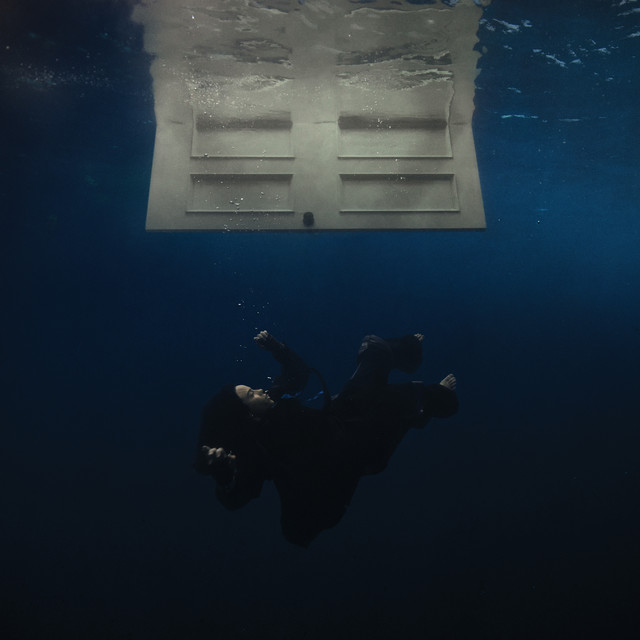 Out of all of HIT ME HARD AND SOFT’s dynamic switches, wall-to-wall catchiness and new vocal experiments, it’s hard to look away from the record’s most glaring accomplishment: Billie Eilish has moved on from her coming-of-age origins and settled nicely into a musical persona that seems to mirror her own authentic self, rather than come across as tailored to the wants of some commercial or critical machine. She’s no longer an 18-year-old walking out of Staples Center in Los Angeles with an armful of Grammy Awards; she’s an irreversibly famous and successful musician who just wants to get down with queer love and have the space to figure out what works and what doesn’t. HIT ME HARD AND SOFT sounds exactly like what being 22 years old felt like, told by someone who has lived a life of grandiose, relentless celebrity since before she was old enough to get a driver’s license but hasn’t let that outmuscle the humanity of herself. There’s no lore to sift through on this record, only Billie Eilish’s attention to the details of everything fleeting around her. Life—and its desires and hardships—is a craving, and it’s plentiful and resounding to hear Billie attempt to untangle it. Finneas’s arrangements are so tight and complimentary to Eilish’s own macabre tendencies and unfiltered anecdotes that it’s impossible to not be charmed by the sheer lack of fuss this record expounds. “Am I acting my age now? Am I already on the way out?” Eilish soberly asks on “SKINNY.” Once “BLUE” ends, the answer is, unequivocally, yes, followed by a swift no. —Matt Mitchell [Darkroom/Interscope]
Out of all of HIT ME HARD AND SOFT’s dynamic switches, wall-to-wall catchiness and new vocal experiments, it’s hard to look away from the record’s most glaring accomplishment: Billie Eilish has moved on from her coming-of-age origins and settled nicely into a musical persona that seems to mirror her own authentic self, rather than come across as tailored to the wants of some commercial or critical machine. She’s no longer an 18-year-old walking out of Staples Center in Los Angeles with an armful of Grammy Awards; she’s an irreversibly famous and successful musician who just wants to get down with queer love and have the space to figure out what works and what doesn’t. HIT ME HARD AND SOFT sounds exactly like what being 22 years old felt like, told by someone who has lived a life of grandiose, relentless celebrity since before she was old enough to get a driver’s license but hasn’t let that outmuscle the humanity of herself. There’s no lore to sift through on this record, only Billie Eilish’s attention to the details of everything fleeting around her. Life—and its desires and hardships—is a craving, and it’s plentiful and resounding to hear Billie attempt to untangle it. Finneas’s arrangements are so tight and complimentary to Eilish’s own macabre tendencies and unfiltered anecdotes that it’s impossible to not be charmed by the sheer lack of fuss this record expounds. “Am I acting my age now? Am I already on the way out?” Eilish soberly asks on “SKINNY.” Once “BLUE” ends, the answer is, unequivocally, yes, followed by a swift no. —Matt Mitchell [Darkroom/Interscope]
67. Cavalier: Different Type Time
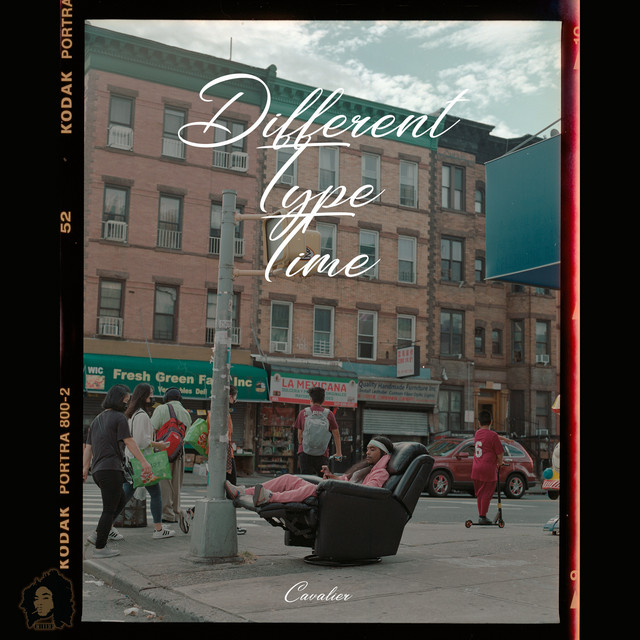 Cavalier’s breezy and meditative Different Type Time has been my go-to each time I’ve returned to my—and his—hometown of Brooklyn since the record dropped in the spring. The New York-born rapper has been based out of New Orleans for most of his career, but the first of his two 2024 LPs (the second being CINE, an excellent collab album with producer Child Actor) feels like a homecoming, each song a walk down a familiar block turned unfamiliar where certain touchpoints have been replaced with new ones, punctuated by run-ins with old friends and neighbors. Cav’s pen balances bravado and humility, contemplation and levity, weaving clever bars into old jazz and soul samples and interpolations from Ol’ Dirty Bastard, A Tribe Called Quest, and a viral Youtube video titled “My longest yeah boy ever.” Cavalier’s got cosigns and collabs with heavy-hitters like Armand Hammer and Quelle Chris, but on the almost entirely featureless Different Type Time he proves countless times over that he’s a generational talent, documenting the past and speaking the future into existence. —Grace Robins-Somerville [Backwoodz Studios]
Cavalier’s breezy and meditative Different Type Time has been my go-to each time I’ve returned to my—and his—hometown of Brooklyn since the record dropped in the spring. The New York-born rapper has been based out of New Orleans for most of his career, but the first of his two 2024 LPs (the second being CINE, an excellent collab album with producer Child Actor) feels like a homecoming, each song a walk down a familiar block turned unfamiliar where certain touchpoints have been replaced with new ones, punctuated by run-ins with old friends and neighbors. Cav’s pen balances bravado and humility, contemplation and levity, weaving clever bars into old jazz and soul samples and interpolations from Ol’ Dirty Bastard, A Tribe Called Quest, and a viral Youtube video titled “My longest yeah boy ever.” Cavalier’s got cosigns and collabs with heavy-hitters like Armand Hammer and Quelle Chris, but on the almost entirely featureless Different Type Time he proves countless times over that he’s a generational talent, documenting the past and speaking the future into existence. —Grace Robins-Somerville [Backwoodz Studios]
66. Midwife: No Depression in Heaven
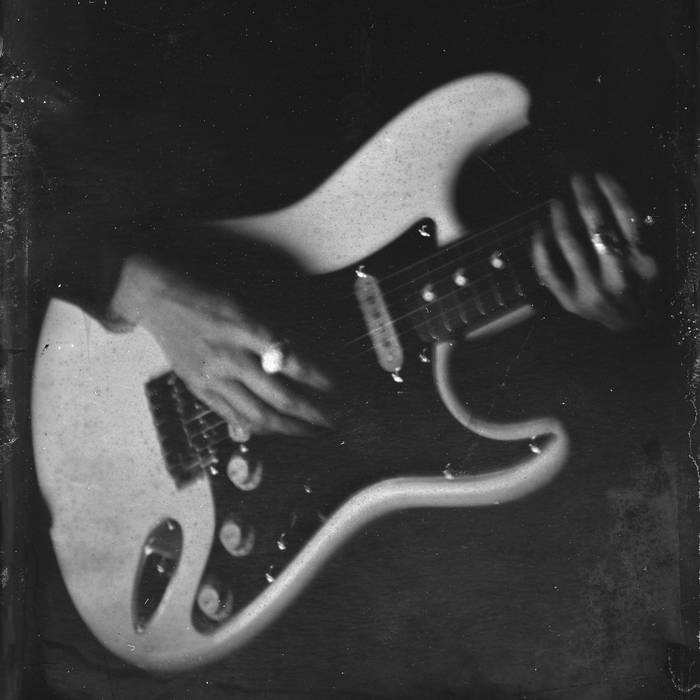 Midwife has never been strict on genre, but the earliest releases had clear roots in post-metal, a kind of re-contextualizing of doom’s tools in an ambient singer-songwriter format. By now, on her fourth album, Madeline Johnston has incorporated every kind of slow, deliberate style under the Midwife project, creating something with sublime beauty and pitch darkness as its primary aesthetic qualities. No Depression in Heaven draws on a variety of traditions, most interestingly bluesy post-punk in her cover of Rowland S. Howard’s “Autoluminescent” and Eurodance in her reimagining of “Better Off Alone.” Whether it’s an existing tune or a fresh composition, everything gets the Midwife treatment: subtle percussion (if any), hazy guitar loops and vocals cast through a gauzy mesh that makes them sound like transmissions from heaven. On stage, Midwife sings into a telephone, achieving a transhuman distanced effect. What she utters carries the weight of doom despite, or arguably through, its gossamer manifestation. No Depression in Heaven may be an album conceived in transit fixated on the endless march forward, but it feels like an arrival for Midwife. Across four albums, Midwife’s sound has evolved from a spiritual post-metal into a wider, genre-agnostic practice of seeing the world for all its weight, its darkness, and letting yourself buckle beneath it. —Devon Chodzin [The Flenser]
Midwife has never been strict on genre, but the earliest releases had clear roots in post-metal, a kind of re-contextualizing of doom’s tools in an ambient singer-songwriter format. By now, on her fourth album, Madeline Johnston has incorporated every kind of slow, deliberate style under the Midwife project, creating something with sublime beauty and pitch darkness as its primary aesthetic qualities. No Depression in Heaven draws on a variety of traditions, most interestingly bluesy post-punk in her cover of Rowland S. Howard’s “Autoluminescent” and Eurodance in her reimagining of “Better Off Alone.” Whether it’s an existing tune or a fresh composition, everything gets the Midwife treatment: subtle percussion (if any), hazy guitar loops and vocals cast through a gauzy mesh that makes them sound like transmissions from heaven. On stage, Midwife sings into a telephone, achieving a transhuman distanced effect. What she utters carries the weight of doom despite, or arguably through, its gossamer manifestation. No Depression in Heaven may be an album conceived in transit fixated on the endless march forward, but it feels like an arrival for Midwife. Across four albums, Midwife’s sound has evolved from a spiritual post-metal into a wider, genre-agnostic practice of seeing the world for all its weight, its darkness, and letting yourself buckle beneath it. —Devon Chodzin [The Flenser]
65. Kali Uchis: ORQUÍDEAS
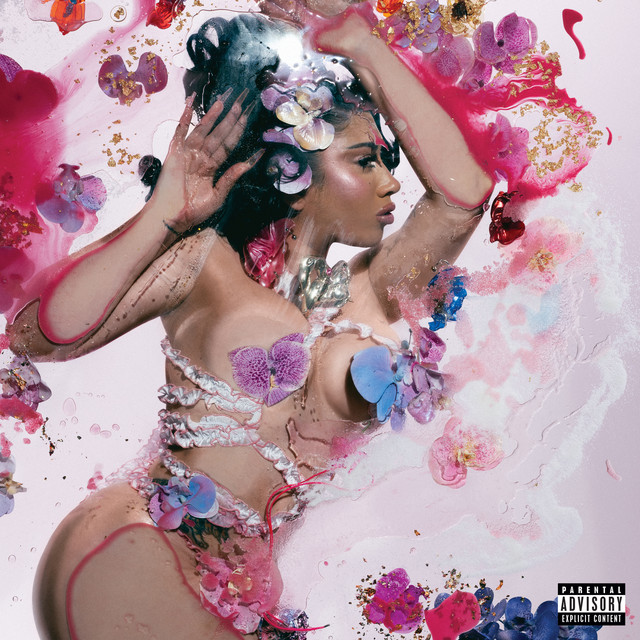 On ORQUÍDEAS, Kali Uchis’ second Spanish language album, the artist drew inspiration from the national flower of Colombia, a plant that’s soft, seductive, enthralling, and seemingly magical. But Uchis’ idea of an orchid has thorns, and she’s just as ready to seduce you as she is to call you out for all your bullshit. From the melodramatic sendoff bolero “Te Mata,” the fairy-tale quest for true love of “Igual Que Un Ángel,” and the dembow standout “Muñekita” (featuring an extremely horny verse from the King of Dembow himself El Alfa), ORQUÍDEAS is Kali Uchis at her very best: luxurious and unapologetically feminine. When she purrs on “Cómo Así?” that “You’ll never wanna leave,” that’s not to be taken lightly. It’s a promise. —Jaeden Pinder [Geffen]
On ORQUÍDEAS, Kali Uchis’ second Spanish language album, the artist drew inspiration from the national flower of Colombia, a plant that’s soft, seductive, enthralling, and seemingly magical. But Uchis’ idea of an orchid has thorns, and she’s just as ready to seduce you as she is to call you out for all your bullshit. From the melodramatic sendoff bolero “Te Mata,” the fairy-tale quest for true love of “Igual Que Un Ángel,” and the dembow standout “Muñekita” (featuring an extremely horny verse from the King of Dembow himself El Alfa), ORQUÍDEAS is Kali Uchis at her very best: luxurious and unapologetically feminine. When she purrs on “Cómo Así?” that “You’ll never wanna leave,” that’s not to be taken lightly. It’s a promise. —Jaeden Pinder [Geffen]
64. Kim Gordon: The Collective
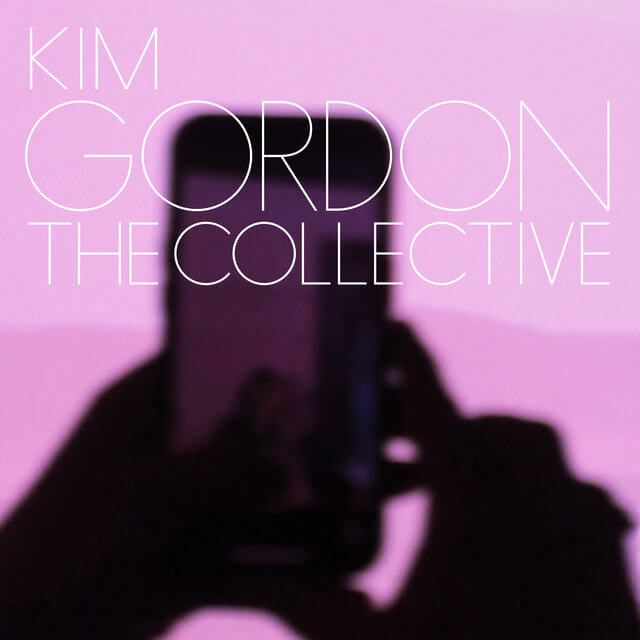 On The Collective, Kim Gordon’s second record for Matador, she extrapolates on one of the myriad ideas present onNo Home Record, the intersection of whisper-rap and hyperreal modernity. Gordon was inspired by The Candy House by Jennifer Egan, a Thouron Scholar, adding a layer of metafiction already entrenched in Egan’s body of work. The Candy House is a sequel to Egan’s previous novel A Visit from the Goon Squad, each chapter focusing on a different character and being written in a different style exploring the fallout of tech companies, the impossibility of authenticity in our current age, and trauma as something we can discard. It’s easy to see why the book sparked a creative urge in Gordon upon first listen. The Collective opens with “BYE BYE,” where Gordon vacantly prattles off a list of chores and a shopping list overtop a trap-industrial beat and what sounds like a car alarm. Gordon’s compelling, enigmatic delivery—coupled with Justin Raisen’s cacophonic production—is hard to resist. The Collective threatens to unravel throughout its entire duration—an anxious, consistent assault on the senses. It’s not an angry record, though; like all good art about modernity, Gordon feels more observational, inhabiting the bodies of many characters, people with AirPods on the train home from work and the oblivious strangers trying to get their attention, peddlers on the street weaponizing small talk and moms who hate their in-laws and are worried for their social media addled teenagers. The album succeeds wholly on its immediacy, and both its soundscapes and directionless lyrics slap you in the face with its message. —Austin Jones [Matador]
On The Collective, Kim Gordon’s second record for Matador, she extrapolates on one of the myriad ideas present onNo Home Record, the intersection of whisper-rap and hyperreal modernity. Gordon was inspired by The Candy House by Jennifer Egan, a Thouron Scholar, adding a layer of metafiction already entrenched in Egan’s body of work. The Candy House is a sequel to Egan’s previous novel A Visit from the Goon Squad, each chapter focusing on a different character and being written in a different style exploring the fallout of tech companies, the impossibility of authenticity in our current age, and trauma as something we can discard. It’s easy to see why the book sparked a creative urge in Gordon upon first listen. The Collective opens with “BYE BYE,” where Gordon vacantly prattles off a list of chores and a shopping list overtop a trap-industrial beat and what sounds like a car alarm. Gordon’s compelling, enigmatic delivery—coupled with Justin Raisen’s cacophonic production—is hard to resist. The Collective threatens to unravel throughout its entire duration—an anxious, consistent assault on the senses. It’s not an angry record, though; like all good art about modernity, Gordon feels more observational, inhabiting the bodies of many characters, people with AirPods on the train home from work and the oblivious strangers trying to get their attention, peddlers on the street weaponizing small talk and moms who hate their in-laws and are worried for their social media addled teenagers. The album succeeds wholly on its immediacy, and both its soundscapes and directionless lyrics slap you in the face with its message. —Austin Jones [Matador]
Read: “Welcome to Kim Gordon’s Collective”
63. Arooj Aftab: Night Reign
 If her 2021 album Vulture Prince made Arooj Aftab one of our boldest living composers, then Night Reign is her detour towards greater gestures and more potent ephemera. Aftab is one of just a few artists I trust to reckon with grief on an album, as the Pakistani-American songwriter doesn’t merely lean into loss, she travels to the ends of the Earth to make sense of it. Night Reign features Moor Mother and Kaki King, two collaborators who just make perfect sense for a project as resoundingly cathartic as this one, but Aftab keeps herself front-and-center, crooning gently through arrangements of piano melodies (“Na Gul”), ornate guitar (“Aey Nehin”), minimalist rhythms (“Autumn Leaves”), noisy bass (“Bolo Na”), Auto-Tune (“Raat Ki Rani”), improvisational coherencies formed out of an ostinato (“Last Night Reprise”) and atmospheric, electronic wash-overs (“Whiskey”). Aftab “make[s] music with and for everybody,” and Night Reign is a generous, immediate portrait of that very ideal. —Matt Mitchell [Verve]
If her 2021 album Vulture Prince made Arooj Aftab one of our boldest living composers, then Night Reign is her detour towards greater gestures and more potent ephemera. Aftab is one of just a few artists I trust to reckon with grief on an album, as the Pakistani-American songwriter doesn’t merely lean into loss, she travels to the ends of the Earth to make sense of it. Night Reign features Moor Mother and Kaki King, two collaborators who just make perfect sense for a project as resoundingly cathartic as this one, but Aftab keeps herself front-and-center, crooning gently through arrangements of piano melodies (“Na Gul”), ornate guitar (“Aey Nehin”), minimalist rhythms (“Autumn Leaves”), noisy bass (“Bolo Na”), Auto-Tune (“Raat Ki Rani”), improvisational coherencies formed out of an ostinato (“Last Night Reprise”) and atmospheric, electronic wash-overs (“Whiskey”). Aftab “make[s] music with and for everybody,” and Night Reign is a generous, immediate portrait of that very ideal. —Matt Mitchell [Verve]
62. Fievel is Glauque: Rong Weicknes
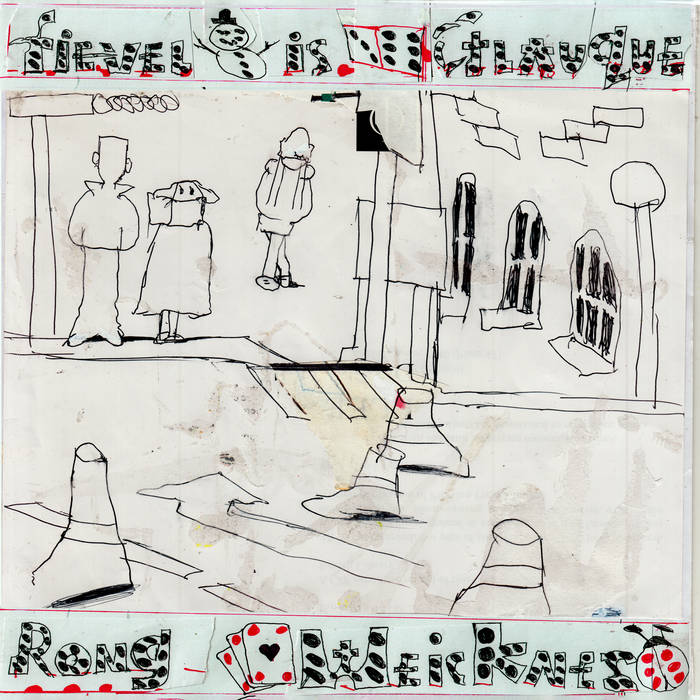 Fievel is Glauque’s first collection of songs, God’s Trashmen Sent to Right the Mess, and 2022’s official debut, Flaming Swords, are stuffed to the brim with songs that rarely breach the two-minute mark, but sparkle with personality even in their bare bones form. By comparison, you’d expect a more intentional process to weigh down or clutter the formula. Yet, what the band does instead is perfect a balancing act, taking advantage of the broader canvas they have to work with, only expanding the distinct lane Fievel is Glauque has carved out for itself. A delightfully anachronistic quality shines throughout in its everything-but-the-kitchen-sink approach, teasing out quirks which would be smoothed over in the tradition of lounge-friendly jazz-pop they seek to embellish and update. The opening one-two punch of “Hover” and lead single “As Above, So Below” feel emblematic of this effect, never feeling stuffy or like Zach Phillips and Ma Clément are looking over their shoulder and waiting for recognition to flash in your eyes. It’s the sound of music fanatics mashing together textures or influences that thrill them—creating a refreshing, contagious sense of joy. Though the arrangements usually succeed at focusing your attention despite all of the elements jam-packed into any given second of the tracklist, Clément’s specific vocal quality is worth lauding, serving as the project’s grounding force. A point of comparison that comes to mind is Broadcast’s Trish Keenan—a straightforward alto tinged with sweetness even when it floats above a daring collision of sound made by the rest of the band. Again, the arrangements and melodies are brilliantly executed, but Clément’s voice is a crucial instrument in the mix, tethering the fantastical swirl to solid ground. —Elise Soutar [Fat Possum Records]
Fievel is Glauque’s first collection of songs, God’s Trashmen Sent to Right the Mess, and 2022’s official debut, Flaming Swords, are stuffed to the brim with songs that rarely breach the two-minute mark, but sparkle with personality even in their bare bones form. By comparison, you’d expect a more intentional process to weigh down or clutter the formula. Yet, what the band does instead is perfect a balancing act, taking advantage of the broader canvas they have to work with, only expanding the distinct lane Fievel is Glauque has carved out for itself. A delightfully anachronistic quality shines throughout in its everything-but-the-kitchen-sink approach, teasing out quirks which would be smoothed over in the tradition of lounge-friendly jazz-pop they seek to embellish and update. The opening one-two punch of “Hover” and lead single “As Above, So Below” feel emblematic of this effect, never feeling stuffy or like Zach Phillips and Ma Clément are looking over their shoulder and waiting for recognition to flash in your eyes. It’s the sound of music fanatics mashing together textures or influences that thrill them—creating a refreshing, contagious sense of joy. Though the arrangements usually succeed at focusing your attention despite all of the elements jam-packed into any given second of the tracklist, Clément’s specific vocal quality is worth lauding, serving as the project’s grounding force. A point of comparison that comes to mind is Broadcast’s Trish Keenan—a straightforward alto tinged with sweetness even when it floats above a daring collision of sound made by the rest of the band. Again, the arrangements and melodies are brilliantly executed, but Clément’s voice is a crucial instrument in the mix, tethering the fantastical swirl to solid ground. —Elise Soutar [Fat Possum Records]
61. Hovvdy: Hovvdy
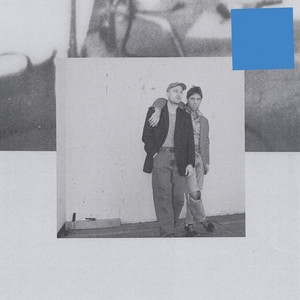 Charlie Martin and Will Taylor take chances in their songwriting and recording processes, which gets them the well-deserved attention of their peers, but nothing about the end result is haughty or frosty. Hovvdy is the perfect showing of their absorbing but approachable product. It takes a ton of courage to write vulnerably about one’s family. The Texas indie-pop pair take this leap not just on one song but many times throughout Hovvdy. Martin fearlessly wrote “Song For Pete,” which appears on the stacked back-half of the record, for his grandfather—“Papa Pete, the proud father”—on the day he passed away. And on that day, it seems his mind was on not only the friendship and mentorship he found in his grandpa, but also a decades-long marriage for the ages: “An endless love / My grandmother / For 60 years.” Hovvdy is again in awe of an older generation on “Make Ya Proud,” another song Martin wrote in honor of his grandfather. Much like Lucy Dacus’s “Pillar Of Truth,” it’s about watching a wise loved one fade and wishing there was more time to pick their brain—and thus being forced to consider what life might look like without them and how to best sustain their legacy: “How can I make you proud / Sing you a song, I will.” On “Bad News,” which takes some sonic cues from Hovvdy’s contemporary (and former tourmate) Alex G, the band again chases that ever-dwindling resource of time: “My time is all I have…Our time is all I want.” They’ve always dabbled in country, but on Hovvdy, a sparkling finish of twang and slide guitar has the duo sounding more boldly Southern than before. The scenarios are distinctly Southern, too. On “Big Blue,” there’s a listening party with “Uncle Tim” and his bootleg The Band albums. And on hooky single “Jean,” when things don’t go exactly to plan, there’s a trip five blocks over because “you got a cousin, says he can help me out.” If you have a big family in the South, you might be familiar with both the joys and havoc that a carousel of resourceful cousins can bring. —Ellen Johnson [Arts & Crafts]
Charlie Martin and Will Taylor take chances in their songwriting and recording processes, which gets them the well-deserved attention of their peers, but nothing about the end result is haughty or frosty. Hovvdy is the perfect showing of their absorbing but approachable product. It takes a ton of courage to write vulnerably about one’s family. The Texas indie-pop pair take this leap not just on one song but many times throughout Hovvdy. Martin fearlessly wrote “Song For Pete,” which appears on the stacked back-half of the record, for his grandfather—“Papa Pete, the proud father”—on the day he passed away. And on that day, it seems his mind was on not only the friendship and mentorship he found in his grandpa, but also a decades-long marriage for the ages: “An endless love / My grandmother / For 60 years.” Hovvdy is again in awe of an older generation on “Make Ya Proud,” another song Martin wrote in honor of his grandfather. Much like Lucy Dacus’s “Pillar Of Truth,” it’s about watching a wise loved one fade and wishing there was more time to pick their brain—and thus being forced to consider what life might look like without them and how to best sustain their legacy: “How can I make you proud / Sing you a song, I will.” On “Bad News,” which takes some sonic cues from Hovvdy’s contemporary (and former tourmate) Alex G, the band again chases that ever-dwindling resource of time: “My time is all I have…Our time is all I want.” They’ve always dabbled in country, but on Hovvdy, a sparkling finish of twang and slide guitar has the duo sounding more boldly Southern than before. The scenarios are distinctly Southern, too. On “Big Blue,” there’s a listening party with “Uncle Tim” and his bootleg The Band albums. And on hooky single “Jean,” when things don’t go exactly to plan, there’s a trip five blocks over because “you got a cousin, says he can help me out.” If you have a big family in the South, you might be familiar with both the joys and havoc that a carousel of resourceful cousins can bring. —Ellen Johnson [Arts & Crafts]
Read: “Hovvdy Are Making Their Own Rules”
60. Mdou Moctar: Funeral for Justice
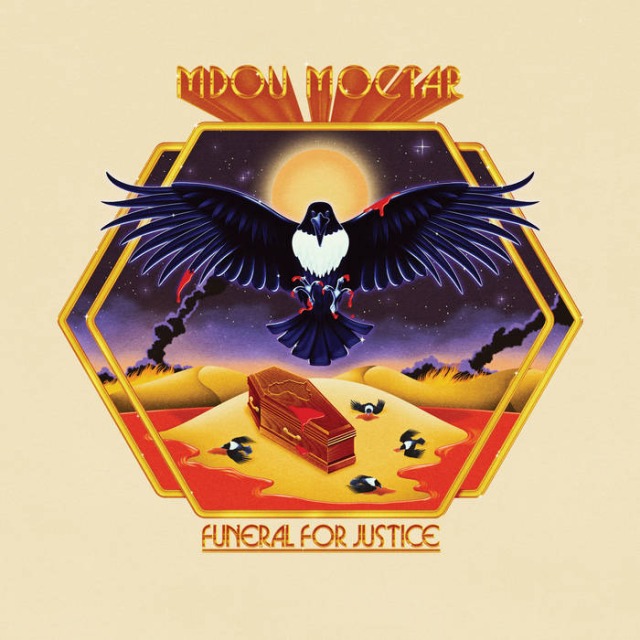 Mdou Moctar uses his guitar to emulate the sound of a siren. During the recording sessions for Funeral for Justice, his band’s latest album, Moctar inched his hand toward the high edge of his lefty fretboard, using his preferred picking hand to instead conjure a burst of wailing noise. Once they wrapped up tracking it, producer and bassist Mikey Coltun was talking to Moctar about why he did that and what he was feeling at that moment. “This is a cry for help,” the guitarist and vocalist told his bandmate. “This is the sound of the siren.” Most of the lyrics for Funeral for Justice are sung in Moctar’s native tongue, Tamasheq, but the messaging of the record rings clear despite any potential language barriers and Mdou Moctar’s growing audience in English-speaking countries. Stacked with countless incandescent guitar solos that erupt like fireworks, there’s an underlying urgency to these songs. The guitar may as well be another one of Moctar’s native languages. It’s a vehicle for his convictions. Funeral for Justice is a roughly 40-minute call to arms with a stalwart anti-colonialist stance. —Grant Sharples [Matador]
Mdou Moctar uses his guitar to emulate the sound of a siren. During the recording sessions for Funeral for Justice, his band’s latest album, Moctar inched his hand toward the high edge of his lefty fretboard, using his preferred picking hand to instead conjure a burst of wailing noise. Once they wrapped up tracking it, producer and bassist Mikey Coltun was talking to Moctar about why he did that and what he was feeling at that moment. “This is a cry for help,” the guitarist and vocalist told his bandmate. “This is the sound of the siren.” Most of the lyrics for Funeral for Justice are sung in Moctar’s native tongue, Tamasheq, but the messaging of the record rings clear despite any potential language barriers and Mdou Moctar’s growing audience in English-speaking countries. Stacked with countless incandescent guitar solos that erupt like fireworks, there’s an underlying urgency to these songs. The guitar may as well be another one of Moctar’s native languages. It’s a vehicle for his convictions. Funeral for Justice is a roughly 40-minute call to arms with a stalwart anti-colonialist stance. —Grant Sharples [Matador]
Read: “Mdou Moctar’s Songs of Protest and Celebration”
59. Thou: Umbilical
 Baton Rouge sludge metal heroes Thou have always sounded colossal, but their sixth album, Umbilical, separates them from the Louisiana bands that came before them, like Eyehategod and Crowbar. Umbilical is the kind of record that creates its own lineage, as vocalist Bryan Funck shreds through an ugliness that covers Thou’s longtime Nirvana affections in oil. Funck said that Umbilical is a diss record against his own band, filling the “Everything you’ve ever done, everything I’ve ever said, everything I’ve ever felt is a chain around my neck” lines in “Emotional Terrorist” with a shuddering, punishing context. There is a gnarliness to Umbilical that overshadows even Thou’s greatest previous acts (Let Our Names Be Forgotten and Magus, especially); “Narcissist’s Prayer” is one of the year’s rawest and dissenting meditations on existence: “Speak our names as a warning, as a curse, as a failure. At last, it’s time to die. So die.” Thou themselves have said that Umbilical is a record not just “for the radicals, the crackpots, [and] the exiles who have escaped the wasteland of capitulation,” but for the “weaklings and malingerers, burdened by capricious indulgence, hunched by the deep wounds of compromise, shuffling in limp approximation, desperately reaching back towards integrity and conviction.” These songs will haunt you, but you will wash yourself anew in Thou’s tectonic, maddening impulses. —Matt Mitchell [Sacred Bones]
Baton Rouge sludge metal heroes Thou have always sounded colossal, but their sixth album, Umbilical, separates them from the Louisiana bands that came before them, like Eyehategod and Crowbar. Umbilical is the kind of record that creates its own lineage, as vocalist Bryan Funck shreds through an ugliness that covers Thou’s longtime Nirvana affections in oil. Funck said that Umbilical is a diss record against his own band, filling the “Everything you’ve ever done, everything I’ve ever said, everything I’ve ever felt is a chain around my neck” lines in “Emotional Terrorist” with a shuddering, punishing context. There is a gnarliness to Umbilical that overshadows even Thou’s greatest previous acts (Let Our Names Be Forgotten and Magus, especially); “Narcissist’s Prayer” is one of the year’s rawest and dissenting meditations on existence: “Speak our names as a warning, as a curse, as a failure. At last, it’s time to die. So die.” Thou themselves have said that Umbilical is a record not just “for the radicals, the crackpots, [and] the exiles who have escaped the wasteland of capitulation,” but for the “weaklings and malingerers, burdened by capricious indulgence, hunched by the deep wounds of compromise, shuffling in limp approximation, desperately reaching back towards integrity and conviction.” These songs will haunt you, but you will wash yourself anew in Thou’s tectonic, maddening impulses. —Matt Mitchell [Sacred Bones]
58. Shabaka: Perceive Its Beauty, Acknowledge Its Grace
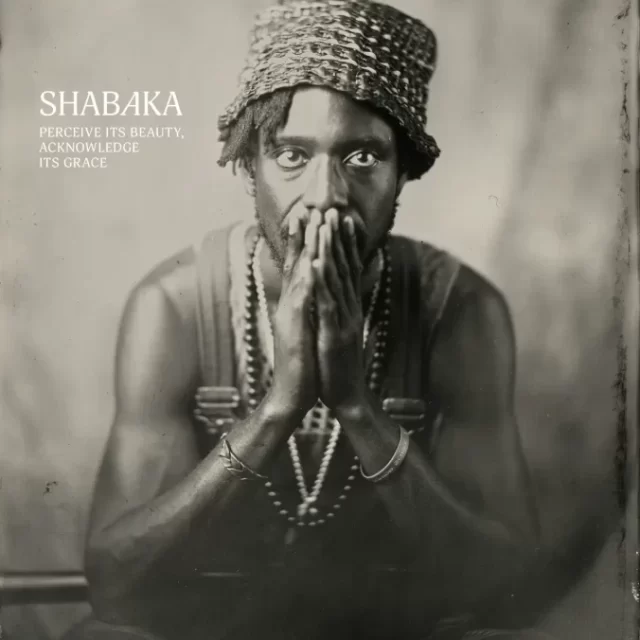 Shabaka Hutchings’ latest LP, Perceive Its Beauty, Acknowledge Its Grace, is a towering and powerful offering from the jazz virtuoso. The record features André 3000, Surya Botofasina, Moses Sumney, Jason Moran, Nasheet Waits, Carlos Niño and others, and the final product is potent in its own genius, as songs like “The Wounded Need to Be Replenished” and “Body to Inhabit” revel in the abstract while conjuring beautiful textures and emotional spectrums. “End of Innocence” finds Shabaka putting down his tenor saxophone in favor of a sublime lead clarinet, making for a sharp detour from the riotous sphere he normally orbits in projects like Sons of Kemet and The Comet is Coming, but it’s no less mountainous. There’s something subtly mystifying about this song and the album, both a culmination of Shabaka’s colorful chemistry with his ensemble and his desire to take risks within his own oeuvre. The woodwinds and brass sound dim light, while the piano that’s a set piece behind many of these compositions unravels delicately. The voices wrap around the arrangements, as Sumney’s vocal is woven into Shabaka’s flute on “Insecurities,” while poet Saul Williams introduces “Managing My Breath, What Fear Had Become” before the song contracts outwards into something lush and braided. Perceive Its Beauty, Acknowledge Its Grace is tranquil at every turn, a marvel calling to mind the works of Alice Coltrane and Pharoah Sanders, Brian Eno and Iasos more than 40 years ago—an incantation of kind, spiritual talent from one of jazz’s very best. —Matt Mitchell [Impulse!]
Shabaka Hutchings’ latest LP, Perceive Its Beauty, Acknowledge Its Grace, is a towering and powerful offering from the jazz virtuoso. The record features André 3000, Surya Botofasina, Moses Sumney, Jason Moran, Nasheet Waits, Carlos Niño and others, and the final product is potent in its own genius, as songs like “The Wounded Need to Be Replenished” and “Body to Inhabit” revel in the abstract while conjuring beautiful textures and emotional spectrums. “End of Innocence” finds Shabaka putting down his tenor saxophone in favor of a sublime lead clarinet, making for a sharp detour from the riotous sphere he normally orbits in projects like Sons of Kemet and The Comet is Coming, but it’s no less mountainous. There’s something subtly mystifying about this song and the album, both a culmination of Shabaka’s colorful chemistry with his ensemble and his desire to take risks within his own oeuvre. The woodwinds and brass sound dim light, while the piano that’s a set piece behind many of these compositions unravels delicately. The voices wrap around the arrangements, as Sumney’s vocal is woven into Shabaka’s flute on “Insecurities,” while poet Saul Williams introduces “Managing My Breath, What Fear Had Become” before the song contracts outwards into something lush and braided. Perceive Its Beauty, Acknowledge Its Grace is tranquil at every turn, a marvel calling to mind the works of Alice Coltrane and Pharoah Sanders, Brian Eno and Iasos more than 40 years ago—an incantation of kind, spiritual talent from one of jazz’s very best. —Matt Mitchell [Impulse!]
57. Lip Critic: Hex Dealer
 Riding off of the well-deserved hype from their debut album, Lip Critic have quickly sprung from being beloved headliners at SUNY Purchase’s on-campus venue The Stood to an electrifying, must-see live act at the epicenter of New York City’s current hardcore scene. Their debut album, Hex Dealer, is a joyride of blown-out noise and intoxicating calamity as vocalist Bret Kaser talks spirituality, beasts and monsters and depersonalizations in gas stations with the chilling tone of a late-night public access evangelist. The album’s dueling drumsets clash against each other, fostering a pulsating tornado that spits out chopped up samples and bursts of pure electricity—leaving a sludgy, tumultuous chaos in its path. It’s as amusing and vigorous as it is heart-racing and anxiety-inducing; songs like “The Heart” and “Milky Max” are so beautifully speedran to the point where they’re catchy. Getting to see Lip Critic play the songs off Hex Dealer live in a Staten Island radio station’s backyard this summer was the most memorable gig I attended this year. Watching Kaser, drummer Danny Eberle and mixmaster Connor Kleitz writhe and teeter on stage while slamming on their machines and continuously leaping into the mosh felt like I was attending a religious event, heeding to the scripture preached on tracks like “Sermon”: “I chose you from the second I was born / When the egg met the sperm in the womb of the world.” It wasn’t just a set from a show—it truly was an all-encapsulating experience; in that moment everyone present was tunnel-visioned into the metallic, racing world that Lip Critic effortlessly etches and structures for all who will listen. —Alli Dempsey [Partisan]
Riding off of the well-deserved hype from their debut album, Lip Critic have quickly sprung from being beloved headliners at SUNY Purchase’s on-campus venue The Stood to an electrifying, must-see live act at the epicenter of New York City’s current hardcore scene. Their debut album, Hex Dealer, is a joyride of blown-out noise and intoxicating calamity as vocalist Bret Kaser talks spirituality, beasts and monsters and depersonalizations in gas stations with the chilling tone of a late-night public access evangelist. The album’s dueling drumsets clash against each other, fostering a pulsating tornado that spits out chopped up samples and bursts of pure electricity—leaving a sludgy, tumultuous chaos in its path. It’s as amusing and vigorous as it is heart-racing and anxiety-inducing; songs like “The Heart” and “Milky Max” are so beautifully speedran to the point where they’re catchy. Getting to see Lip Critic play the songs off Hex Dealer live in a Staten Island radio station’s backyard this summer was the most memorable gig I attended this year. Watching Kaser, drummer Danny Eberle and mixmaster Connor Kleitz writhe and teeter on stage while slamming on their machines and continuously leaping into the mosh felt like I was attending a religious event, heeding to the scripture preached on tracks like “Sermon”: “I chose you from the second I was born / When the egg met the sperm in the womb of the world.” It wasn’t just a set from a show—it truly was an all-encapsulating experience; in that moment everyone present was tunnel-visioned into the metallic, racing world that Lip Critic effortlessly etches and structures for all who will listen. —Alli Dempsey [Partisan]
Read: “Lip Critic: The Best of What’s Next”
56. Beyoncé: COWBOY CARTER
 COWBOY CARTER, the second installment in Beyoncé’s trilogy of records, is aptly titled, as we get a country album from the greatest pop performer of this century. Not every track lands like on that of its predecessor, RENAISSANCE, but COWBOY CARTER showcases not just Beyoncé’s attempt at reclaiming a genre first turned powerful by Black musicians, but her malleability in music, too. She calls upon Jon Batiste, No I.D., Post Malone, Gary Clark Jr., Willie Nelson, Rhiannon Giddens, Hit-Boy, Pharrell, Shaboozey, Jonathan Rado, Adam Granduciel, Stevie Wonder and others to help rewrite country music’s history. From her reimagination of the Beatles’ “Blackbird” (re-titled as “BLACKBIIRD”) to her cover of Dolly Parton’s “JOLENE” to sneaky originals like “16 CARRIAGES” and the Miley Cyrus-assisted “II MOST WANTED,” Beyoncé is immune to failure, and even her most ambitious swings make some kind of contact. It’s likely that COWBOY CARTER won’t endure with the same perennial immortality as a record like Lemonade has, but what’s never been more true is that Beyoncé can step into any clothes she pleases and make a country record that is as good, if not better, than 90% of what modern country radio stations are playing. Don’t go into COWBOY CARTER expecting an outlaw album, though. The 27 songs here aren’t interested in going to that place. Rather, the album makes good on executing a lesson in genre that doesn’t always abide by its wants. See the outlier “SPAGHETTI II” and you’ll know. Beyoncé can’t stay away from what’s long made her work glow, even if that means breaking away from form briefly. —Matt Mitchell [Columbia]
COWBOY CARTER, the second installment in Beyoncé’s trilogy of records, is aptly titled, as we get a country album from the greatest pop performer of this century. Not every track lands like on that of its predecessor, RENAISSANCE, but COWBOY CARTER showcases not just Beyoncé’s attempt at reclaiming a genre first turned powerful by Black musicians, but her malleability in music, too. She calls upon Jon Batiste, No I.D., Post Malone, Gary Clark Jr., Willie Nelson, Rhiannon Giddens, Hit-Boy, Pharrell, Shaboozey, Jonathan Rado, Adam Granduciel, Stevie Wonder and others to help rewrite country music’s history. From her reimagination of the Beatles’ “Blackbird” (re-titled as “BLACKBIIRD”) to her cover of Dolly Parton’s “JOLENE” to sneaky originals like “16 CARRIAGES” and the Miley Cyrus-assisted “II MOST WANTED,” Beyoncé is immune to failure, and even her most ambitious swings make some kind of contact. It’s likely that COWBOY CARTER won’t endure with the same perennial immortality as a record like Lemonade has, but what’s never been more true is that Beyoncé can step into any clothes she pleases and make a country record that is as good, if not better, than 90% of what modern country radio stations are playing. Don’t go into COWBOY CARTER expecting an outlaw album, though. The 27 songs here aren’t interested in going to that place. Rather, the album makes good on executing a lesson in genre that doesn’t always abide by its wants. See the outlier “SPAGHETTI II” and you’ll know. Beyoncé can’t stay away from what’s long made her work glow, even if that means breaking away from form briefly. —Matt Mitchell [Columbia]
55. More Eaze, pardo, Glass: paris paris, texas texas
 Soft noise is a gentle but unignorable offshoot of experimental music, living down the block from ambient and harsh noise, with swells of sound that can soothe but rich with field recordings, manipulation and other tricks of disruption. It takes dozens of forms. When purveyors of soft noise More Eaze (Mari Maurice Rubio), pardo (Michele Pauli) and Glass (Hugo Lamy + Etienne Reimund) came together to make paris paris, texas texas, their individual experiments congealed into a troubling conglomeration of neofolk and electronic improv. To listen to “Le Grand Souffle Céleste” is to expose yourself to calming ambient then pummeling noise in quick succession while Eaze’s voice hovers beyond. The conclusion, “Orris Butter,” has my vote for best closer of the year with its wafting pedal steel and measured strums setting the stage for an acoustic guitar experiment atop a bed of cosmic noise. —Devon Chodzin [OOH-sounds]
Soft noise is a gentle but unignorable offshoot of experimental music, living down the block from ambient and harsh noise, with swells of sound that can soothe but rich with field recordings, manipulation and other tricks of disruption. It takes dozens of forms. When purveyors of soft noise More Eaze (Mari Maurice Rubio), pardo (Michele Pauli) and Glass (Hugo Lamy + Etienne Reimund) came together to make paris paris, texas texas, their individual experiments congealed into a troubling conglomeration of neofolk and electronic improv. To listen to “Le Grand Souffle Céleste” is to expose yourself to calming ambient then pummeling noise in quick succession while Eaze’s voice hovers beyond. The conclusion, “Orris Butter,” has my vote for best closer of the year with its wafting pedal steel and measured strums setting the stage for an acoustic guitar experiment atop a bed of cosmic noise. —Devon Chodzin [OOH-sounds]
54. Knocked Loose: You Won’t Go Before You’re Supposed To
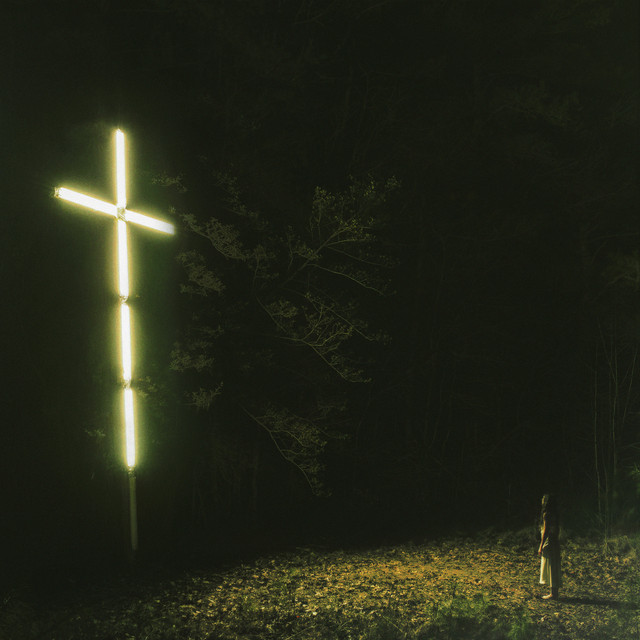 You know that meme about bringing back the nasty riff but slower? Knocked Loose’s fourth album, You Won’t Go Before You’re Supposed To, is the paragon of bringing back the nasty riff but slower. Sometimes, the Kentucky metal band brings back the slowed riff and makes it even slower, going halftime and then quartertime like the best kind of sickos. These are songs that take twists and turns, like a disorienting maze that, as soon as you’ve gathered your bearings, a new path reveals itself. —Grant Sharples [Pure Noise]
You know that meme about bringing back the nasty riff but slower? Knocked Loose’s fourth album, You Won’t Go Before You’re Supposed To, is the paragon of bringing back the nasty riff but slower. Sometimes, the Kentucky metal band brings back the slowed riff and makes it even slower, going halftime and then quartertime like the best kind of sickos. These are songs that take twists and turns, like a disorienting maze that, as soon as you’ve gathered your bearings, a new path reveals itself. —Grant Sharples [Pure Noise]
53. Jimmy Montague: Tomorrow’s Coffee
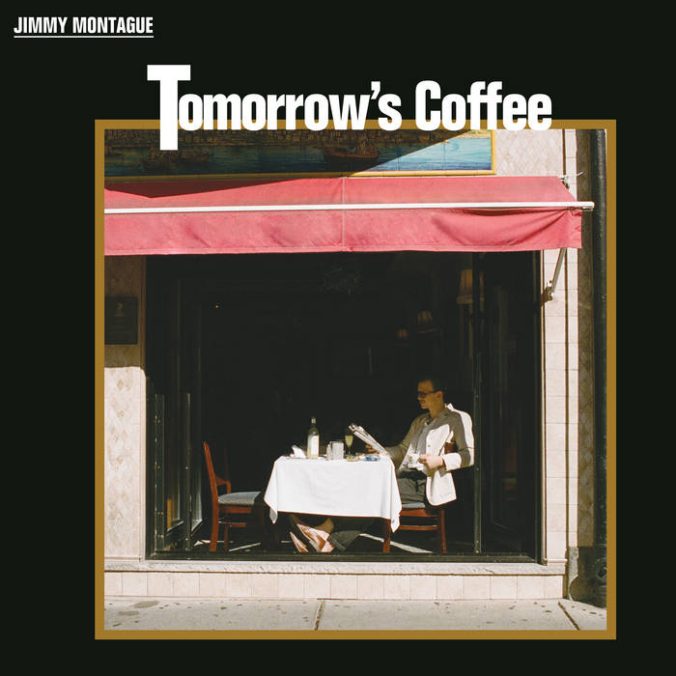 Tomorrow’s Coffee is a project relentless in its own pursuit of stringing together 10 sticky tracks of the like. Good luck finding a crack in this album. The festivities kick off with “Tell You That You’re Right” and its Nick Lowe-style, organ-licked opening melody that explodes into a solo breakdown that puts the focus on rhythm and plenty of it. “No New Starts (For Broken Hearts)” has a certain jingle to it that is the antithesis to anthemic projection, as James Palko muses on goodbyes and fresh beginnings. “Was writing all my fond farewells to ones I used to kiss and tell,” he sings, “on postcards from the corner store when, if only for a moment, had a thoughtful observation that the other side of the line’s been cut.” The song is sublime, euphoric in its own attempts to collage rockabilly and Broadway whimsy—and the “shoo-bop” melody breakdown near the track’s conclusion will make you feel like you’re one of those crooners singing next to a burning trash can in Rocky. “The Smoke After the Kill” sounds like a cigarette after a meal tastes, adopting right-of-the-dial, ageless and liquid rhythms paired with warm harmonies that sound like mid-century session begats and fine-tuned, peculiar pop re-awakenings. It’s the little things that plug Tomorrow’s Coffee with such grace: tropical guitar strums; featherlight percussion pressure points; Palko’s singing, which sounds like it’s coming from inside a white blazer chest pocket. “Only One For Me” is guitar-pop on steroids, punctuated by jazzy harmonics and backing vocals that are so soulful they’ll split you in two. Palko’s work as Jimmy Montague is a mark of formalism unwound, and “No Exit” is anodyne in its kinetic, revelatory devotion to refurbishing abandoned rock detritus. When the 1:30 mark hits on the track, a tenor saxophone solo from Matt Knoedel uncoils while a chooglin’ guitar flourishes delicately in the background. It’s one of the best musical moments of the year. —Matt Mitchell [Self-Released]
Tomorrow’s Coffee is a project relentless in its own pursuit of stringing together 10 sticky tracks of the like. Good luck finding a crack in this album. The festivities kick off with “Tell You That You’re Right” and its Nick Lowe-style, organ-licked opening melody that explodes into a solo breakdown that puts the focus on rhythm and plenty of it. “No New Starts (For Broken Hearts)” has a certain jingle to it that is the antithesis to anthemic projection, as James Palko muses on goodbyes and fresh beginnings. “Was writing all my fond farewells to ones I used to kiss and tell,” he sings, “on postcards from the corner store when, if only for a moment, had a thoughtful observation that the other side of the line’s been cut.” The song is sublime, euphoric in its own attempts to collage rockabilly and Broadway whimsy—and the “shoo-bop” melody breakdown near the track’s conclusion will make you feel like you’re one of those crooners singing next to a burning trash can in Rocky. “The Smoke After the Kill” sounds like a cigarette after a meal tastes, adopting right-of-the-dial, ageless and liquid rhythms paired with warm harmonies that sound like mid-century session begats and fine-tuned, peculiar pop re-awakenings. It’s the little things that plug Tomorrow’s Coffee with such grace: tropical guitar strums; featherlight percussion pressure points; Palko’s singing, which sounds like it’s coming from inside a white blazer chest pocket. “Only One For Me” is guitar-pop on steroids, punctuated by jazzy harmonics and backing vocals that are so soulful they’ll split you in two. Palko’s work as Jimmy Montague is a mark of formalism unwound, and “No Exit” is anodyne in its kinetic, revelatory devotion to refurbishing abandoned rock detritus. When the 1:30 mark hits on the track, a tenor saxophone solo from Matt Knoedel uncoils while a chooglin’ guitar flourishes delicately in the background. It’s one of the best musical moments of the year. —Matt Mitchell [Self-Released]
52. ScHoolboy Q: BLUE LIPS
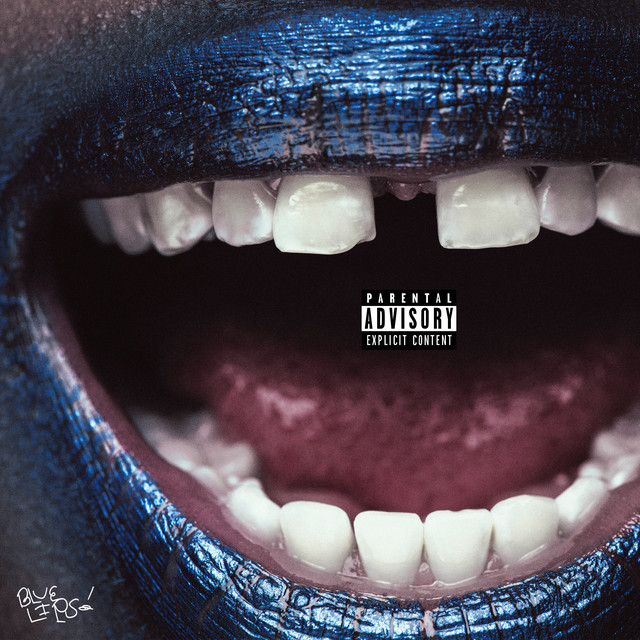 BLUE LIPS, plain and simple, is living proof that Top Dawg’s ScHoolboy Q still has something to say. Though the title conjures a face frightened into silence, Q can’t keep his mouth shut—and thank God for that. He came back for his first record since 2017’s CrasH Talk with a project that is brilliantly brash and adventurous, in both its influences and its delivery. He matches Rico Nasty’s drum ’n’ bass vitriol on “Pop,” Freddie Gibbs’s bravado on “oHio,” and still leaves room for his own introspection, as shrill-tongued and acerbic as it is. “I was twenty-plus young when this shit got real,” he raps on “Yeern 101.” “Made a livin’ off game you should get it on film.” And his flow is crystal, looking at his career with the clarity of a critic—and of those, he’s got plenty. BLUE LIPS gets angry, but never falls into a fury, can be jazzy, but steers far from the lane of sentimental. Because Q is driving the car, and when he stays too long on one street, he knows well enough that he can just turn down a new one. Whether it’s time in the business or something else that’s lending its maturity to Q’s classic stream of consciousness, I’m not sure, but the ScHoolboy Q on BLUE LIPS is at the top of his game, making concessions to no one but himself. —Madelyn Dawson [TDE/Interscope]
BLUE LIPS, plain and simple, is living proof that Top Dawg’s ScHoolboy Q still has something to say. Though the title conjures a face frightened into silence, Q can’t keep his mouth shut—and thank God for that. He came back for his first record since 2017’s CrasH Talk with a project that is brilliantly brash and adventurous, in both its influences and its delivery. He matches Rico Nasty’s drum ’n’ bass vitriol on “Pop,” Freddie Gibbs’s bravado on “oHio,” and still leaves room for his own introspection, as shrill-tongued and acerbic as it is. “I was twenty-plus young when this shit got real,” he raps on “Yeern 101.” “Made a livin’ off game you should get it on film.” And his flow is crystal, looking at his career with the clarity of a critic—and of those, he’s got plenty. BLUE LIPS gets angry, but never falls into a fury, can be jazzy, but steers far from the lane of sentimental. Because Q is driving the car, and when he stays too long on one street, he knows well enough that he can just turn down a new one. Whether it’s time in the business or something else that’s lending its maturity to Q’s classic stream of consciousness, I’m not sure, but the ScHoolboy Q on BLUE LIPS is at the top of his game, making concessions to no one but himself. —Madelyn Dawson [TDE/Interscope]
51. Mk.gee: Two Star & the Dream Police
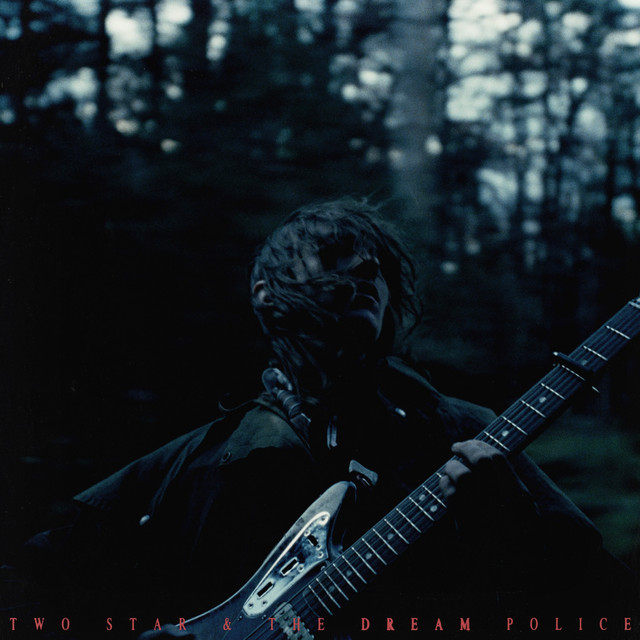 Mike Gordon, the elusive guitarist behind Mk.gee, asks a lot of questions on Two Star & the Dream Police, and while these probings make up the core of his meditative debut album, you’re not going to find many answers. In fact, you’ll probably end up asking your own questions while listening to it: Did I just hear a guitar or a synth? What exactly is he singing about? What’s falling over at the halfway mark of “Are You Looking Up”? But that’s the joy of Two Star & the Dream Police, because the album is constantly morphing, from World of Echo-style Arthur Russell distortions (“Rylee & I”) to murky ruminations that blossom into ‘80s sophisti-pop breakdowns (“I Want”). Gordon purposefully toys with your expectations, and Two Star & the Dream Police achieves his goal of making liminal guitar music. It’s seemingly unknown but feels entirely familiar. —Jaeden Pinder [R&R Digital]
Mike Gordon, the elusive guitarist behind Mk.gee, asks a lot of questions on Two Star & the Dream Police, and while these probings make up the core of his meditative debut album, you’re not going to find many answers. In fact, you’ll probably end up asking your own questions while listening to it: Did I just hear a guitar or a synth? What exactly is he singing about? What’s falling over at the halfway mark of “Are You Looking Up”? But that’s the joy of Two Star & the Dream Police, because the album is constantly morphing, from World of Echo-style Arthur Russell distortions (“Rylee & I”) to murky ruminations that blossom into ‘80s sophisti-pop breakdowns (“I Want”). Gordon purposefully toys with your expectations, and Two Star & the Dream Police achieves his goal of making liminal guitar music. It’s seemingly unknown but feels entirely familiar. —Jaeden Pinder [R&R Digital]
50. Wishy: Triple Seven
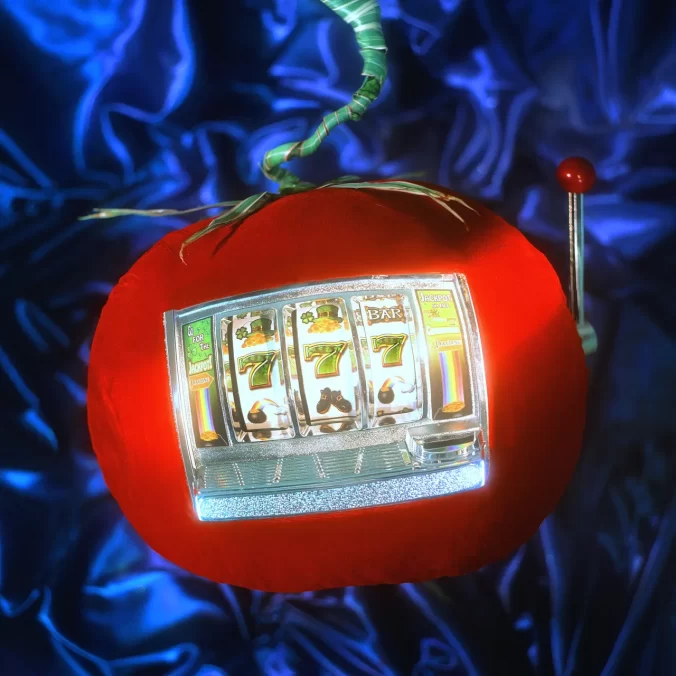 At 10 tracks and 41 minutes long, Triple Seven solidifies Wishy’s sound and proves that the band—formed in 2021 by longtime friends Kevin Krauter and Nina Pitchkites—has the chops to sustain its standard of quality across a full-length release. This is not terribly surprising, but for rock fans burned by promising bands’ patchy releases in the past, it’s nice to hear. Krauter and Pitchkites trade off lead vocals—the former’s come from a more nasally pinched pop-punk tradition, while the latter’s are calm and cool, often carrying melodies that float above it all. (Pitchkites sounds like she was born to sing in a dream pop band.) Throughout the album, they play off each other perfectly, whether they’re providing tonal tension (see the back-to-back zigzag of the strutting “Busted” into the luscious “Just Like Sunday”) or intertwining seamlessly, as they do on “Game,” a propulsive chunk of jangle-pop delivered at a punk pace. Wishy have many strengths, but chief among them is their affinity for instrumental hooks that surface from the swirl and settle in your brain for the foreseeable future. They’re everywhere: A three-note idea that crests over and over again in the background of “Sick Sweet”; the skittering rhythm that underpins the title track; the arena-ready twin-guitar solo in “Persuasion”; the extra-crunchy final third of “Love on the Outside,” in which a jaunty pop tune turns into roaring riff-rock. And then there’s the nursery-rhyme cadence of the album’s caustic closer, “Spit,” in which Krauter and Pitchkites sing, na-na-boo-boo-style: “Who’s gonna break my heart? Who’s gonna wear my mind out? Wish this choice was mine.” OK, that’s a vocal hook, but the point remains the same: Triple Seven spills over with these kinds of sounds, which also happen to be the kinds of sounds that keep people coming back again and again. Turns out Wishy have made not only one of the best debut albums of the year, but also one of the most irresistible, unshakeable albums of the year as well. It takes more than just luck to be this good. —Ben Salmon [Winspear]
At 10 tracks and 41 minutes long, Triple Seven solidifies Wishy’s sound and proves that the band—formed in 2021 by longtime friends Kevin Krauter and Nina Pitchkites—has the chops to sustain its standard of quality across a full-length release. This is not terribly surprising, but for rock fans burned by promising bands’ patchy releases in the past, it’s nice to hear. Krauter and Pitchkites trade off lead vocals—the former’s come from a more nasally pinched pop-punk tradition, while the latter’s are calm and cool, often carrying melodies that float above it all. (Pitchkites sounds like she was born to sing in a dream pop band.) Throughout the album, they play off each other perfectly, whether they’re providing tonal tension (see the back-to-back zigzag of the strutting “Busted” into the luscious “Just Like Sunday”) or intertwining seamlessly, as they do on “Game,” a propulsive chunk of jangle-pop delivered at a punk pace. Wishy have many strengths, but chief among them is their affinity for instrumental hooks that surface from the swirl and settle in your brain for the foreseeable future. They’re everywhere: A three-note idea that crests over and over again in the background of “Sick Sweet”; the skittering rhythm that underpins the title track; the arena-ready twin-guitar solo in “Persuasion”; the extra-crunchy final third of “Love on the Outside,” in which a jaunty pop tune turns into roaring riff-rock. And then there’s the nursery-rhyme cadence of the album’s caustic closer, “Spit,” in which Krauter and Pitchkites sing, na-na-boo-boo-style: “Who’s gonna break my heart? Who’s gonna wear my mind out? Wish this choice was mine.” OK, that’s a vocal hook, but the point remains the same: Triple Seven spills over with these kinds of sounds, which also happen to be the kinds of sounds that keep people coming back again and again. Turns out Wishy have made not only one of the best debut albums of the year, but also one of the most irresistible, unshakeable albums of the year as well. It takes more than just luck to be this good. —Ben Salmon [Winspear]
Read: “Wishy: The Best of What’s Next”
49. Father John Misty: Mahashmashana
 Josh Tillman’s sixth album as Father John Misty processes life’s finite quality as something neutral, not reveling in the end of the nightmare, nor cowering at the unknown, but dancing with the natural order of things through songs that often stretch past the eight and nine minute mark. To maintain that balance, he filters the album’s folkloric wisdom through mood swings, narrating with dissociative curiosity (“Being You”), numbed-up existentialism (“Screamland”) and reluctant nostalgia (“Summer’s Gone”). For the Mahashmashana title, Tillman employs the Sanskrit word meaning “great cremation ground.” Fending off a holier-than-thou attitude are the casually savage details that ground the music in humanity’s shortcomings: caustic phrases like “donor-class panache” and “tacit fascists,” paired with a mockery of modern thoughtlessness. (“Use your discretion so I don’t have to use mine,” he commands on the blues-rock twister “She Cleans Up.”) Tillman is not exempt from criticism, either. “I Guess Time Just Makes Fools Of Us All” references when Rolling Stone told him that he was “easily the least famous” person to turn down the magazine’s cover, while “Josh Tillman and the Accidental Dose” admits to his “treating acid with anxiety.” The poetic jabs have long been one of Tillman’s hallmarks, but here they lend him more credibility as Mahashmashana’s narrator; you can’t comment on life’s splendor if you can’t acknowledge the ugliness that often outshines it. Maybe that’s why Tillman’s denser tales here seem more like riddles than straight-up sermons. What we’re left with is a version of him that feels like the average of all past Father John Mistys: the satirist, the pessimist, the perverse romantic. He’s a narrator who is wiser than us, yet scraping by alongside us as we collectively run out the clock. —Victoria Wasylak [Sub Pop]
Josh Tillman’s sixth album as Father John Misty processes life’s finite quality as something neutral, not reveling in the end of the nightmare, nor cowering at the unknown, but dancing with the natural order of things through songs that often stretch past the eight and nine minute mark. To maintain that balance, he filters the album’s folkloric wisdom through mood swings, narrating with dissociative curiosity (“Being You”), numbed-up existentialism (“Screamland”) and reluctant nostalgia (“Summer’s Gone”). For the Mahashmashana title, Tillman employs the Sanskrit word meaning “great cremation ground.” Fending off a holier-than-thou attitude are the casually savage details that ground the music in humanity’s shortcomings: caustic phrases like “donor-class panache” and “tacit fascists,” paired with a mockery of modern thoughtlessness. (“Use your discretion so I don’t have to use mine,” he commands on the blues-rock twister “She Cleans Up.”) Tillman is not exempt from criticism, either. “I Guess Time Just Makes Fools Of Us All” references when Rolling Stone told him that he was “easily the least famous” person to turn down the magazine’s cover, while “Josh Tillman and the Accidental Dose” admits to his “treating acid with anxiety.” The poetic jabs have long been one of Tillman’s hallmarks, but here they lend him more credibility as Mahashmashana’s narrator; you can’t comment on life’s splendor if you can’t acknowledge the ugliness that often outshines it. Maybe that’s why Tillman’s denser tales here seem more like riddles than straight-up sermons. What we’re left with is a version of him that feels like the average of all past Father John Mistys: the satirist, the pessimist, the perverse romantic. He’s a narrator who is wiser than us, yet scraping by alongside us as we collectively run out the clock. —Victoria Wasylak [Sub Pop]
48. Good Looks: Lived Here For A While
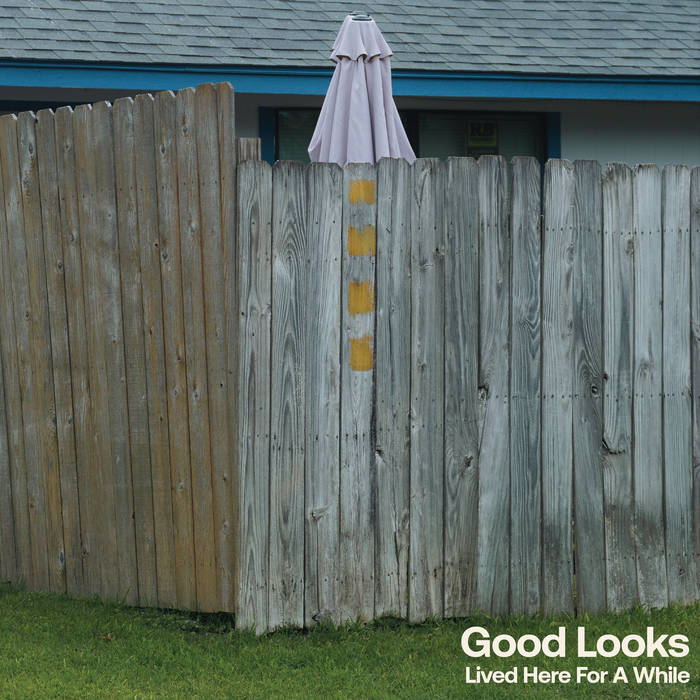 Lived Here For A While is an openhearted collection of tunes that find Tyler Jordan turning inward to examine his personal relationships more so than systemic issues. Across 10 tracks, he sings directly to an ex-girlfriend, his current girlfriend, childhood friends and his family, leaving very little to the imagination. Gentrifiers and greedy real estate developers get songs, too, as if Jordan just can’t help himself. He is from Austin, Texas, after all. His band’s sound has evolved, too. On Bummer Year two years ago, Good Looks were generally slower and a bit more subdued, with the ability to ramp up their roots-rock roar when needed, like when Jordan shouted “I will watch you drown!” at his bosses over and over again in “21,” a highlight of the album. On Lived Here For A While, the band moves more urgently, with bassist Robert Cherry and drummer Phillip Dunne providing plenty of post-punk propulsion and Jake Ames wringing reams of reverberant melody, jagged noise and vaguely ‘80s vibes out of his guitar. Two years ago, Ames was unsure if he’d ever play music again after he was hit by a car and severely injured while on foot in Austin. Thank goodness he recovered, because while Jordan is Good Looks’ centerpiece, Ames’s distinctive playing is the band’s secret weapon. More than a few times, Good Looks’ music has been compared to that of classic rock icon Tom Petty; on Lived Here For A While, they sound more like Tom Petty fronting The Strokes at .75x speed. —Ben Salmon [Keeled Scales]
Lived Here For A While is an openhearted collection of tunes that find Tyler Jordan turning inward to examine his personal relationships more so than systemic issues. Across 10 tracks, he sings directly to an ex-girlfriend, his current girlfriend, childhood friends and his family, leaving very little to the imagination. Gentrifiers and greedy real estate developers get songs, too, as if Jordan just can’t help himself. He is from Austin, Texas, after all. His band’s sound has evolved, too. On Bummer Year two years ago, Good Looks were generally slower and a bit more subdued, with the ability to ramp up their roots-rock roar when needed, like when Jordan shouted “I will watch you drown!” at his bosses over and over again in “21,” a highlight of the album. On Lived Here For A While, the band moves more urgently, with bassist Robert Cherry and drummer Phillip Dunne providing plenty of post-punk propulsion and Jake Ames wringing reams of reverberant melody, jagged noise and vaguely ‘80s vibes out of his guitar. Two years ago, Ames was unsure if he’d ever play music again after he was hit by a car and severely injured while on foot in Austin. Thank goodness he recovered, because while Jordan is Good Looks’ centerpiece, Ames’s distinctive playing is the band’s secret weapon. More than a few times, Good Looks’ music has been compared to that of classic rock icon Tom Petty; on Lived Here For A While, they sound more like Tom Petty fronting The Strokes at .75x speed. —Ben Salmon [Keeled Scales]
Read: “Good Looks Aren’t Going Anywhere”
47. Ka: The Thief Next to Jesus
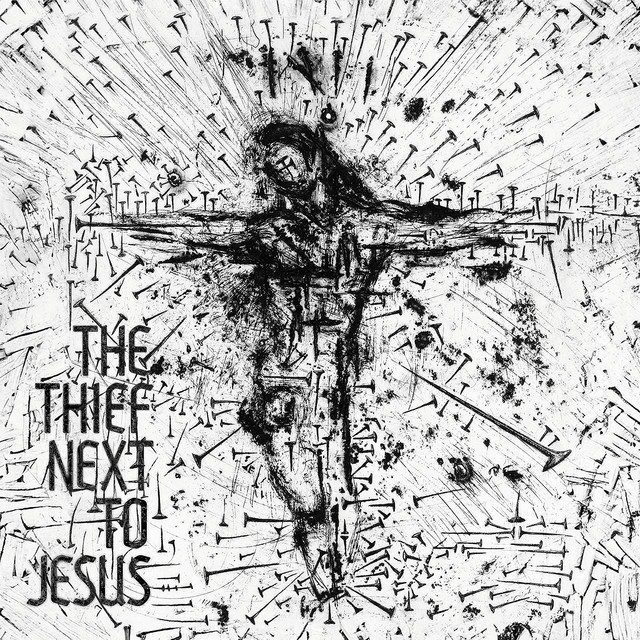 Kaseem Ryan, the 54-year-old Brownsville, Brooklyn rapper and producer known as Ka, passed away in October—two months after releasing his eleventh album, The Thief Next to Jesus. Before his death, the record resonated as a drumless opus on the limits of faith and its worldly institutions (namely the Christian church and its historical role in the oppression of Black Americans) robed in solemn gospel samples. Now, it also reads as self-eulogy. “When I part, they grieve / Pray the mark I leave…” he raps, and a looping choir finishes the thought: “Beautiful.” Full of soft prayers and blessings alongside confessions of shaken faith, The Thief Next to Jesus lands like a benediction at the end of a lifelong sermon, delivered with the prophetic gravitas that defined Ka’s irreplaceable career in underground hip-hop. “I pray every cross you bear is gold”; “May you live a nice, long life / hope it’s beautiful”; and finally, over the screaming instrumental of “True Holy Water”: “I’m here for you / I sweat, bled, and shed a tear for you.” —Taylor Ruckle [Iron Works]
Kaseem Ryan, the 54-year-old Brownsville, Brooklyn rapper and producer known as Ka, passed away in October—two months after releasing his eleventh album, The Thief Next to Jesus. Before his death, the record resonated as a drumless opus on the limits of faith and its worldly institutions (namely the Christian church and its historical role in the oppression of Black Americans) robed in solemn gospel samples. Now, it also reads as self-eulogy. “When I part, they grieve / Pray the mark I leave…” he raps, and a looping choir finishes the thought: “Beautiful.” Full of soft prayers and blessings alongside confessions of shaken faith, The Thief Next to Jesus lands like a benediction at the end of a lifelong sermon, delivered with the prophetic gravitas that defined Ka’s irreplaceable career in underground hip-hop. “I pray every cross you bear is gold”; “May you live a nice, long life / hope it’s beautiful”; and finally, over the screaming instrumental of “True Holy Water”: “I’m here for you / I sweat, bled, and shed a tear for you.” —Taylor Ruckle [Iron Works]
46. Being Dead: EELS
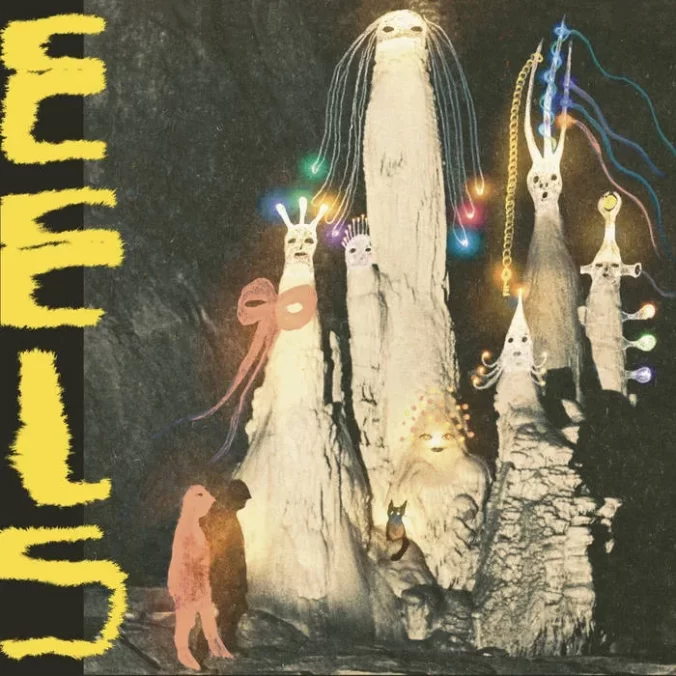 There’s a fine line between irreverent and flippant, of course, and Being Dead skillfully walks that line on EELS, a 16-track collection of sharp zig-zags and even sharper hooks. Opening track “Godzilla Rises,” for example, has it all: electric guitar chug, male and female voices, unexpected rhythmic shifts, irresistible melodies and a sense of resonance that feels like you’re practically in a bathtub with the band. In just under three minutes, Being Dead evoke immersive pop heroes like Neutral Milk Hotel, Animal Collective, That Dog. and the Beach Boys—a touchstone not only for the band’s surf-y foundations, but also their variegated vocal harmonies. Actually, the first third of EELS is a bit of a curveball in its straightforwardness, with one off-kilter pop-rock jam after another: “Blanket of My Bone” sounds like a raucous riot grrrl anthem and a spectral Cindy Lee song woven together. “Problems” reimagines the Velvet Underground as kaleidoscopic hippie music. The punky “Firefighters” juxtaposes Falcon Bitch and Shmoofy’s searing harmonies with some of the best fuzz-guitar tone you’ll hear this year. And “Van Goes” fits call-and-response yelps and a motorik beat into an anti-work tune about feeling fed up with modern life under the weight of capitalism: “Life’s a process but it can happen to you, too,” Falcon Bitch sings. “If you let ‘em get the best of you.” —Ben Salmon [Bayonet]
There’s a fine line between irreverent and flippant, of course, and Being Dead skillfully walks that line on EELS, a 16-track collection of sharp zig-zags and even sharper hooks. Opening track “Godzilla Rises,” for example, has it all: electric guitar chug, male and female voices, unexpected rhythmic shifts, irresistible melodies and a sense of resonance that feels like you’re practically in a bathtub with the band. In just under three minutes, Being Dead evoke immersive pop heroes like Neutral Milk Hotel, Animal Collective, That Dog. and the Beach Boys—a touchstone not only for the band’s surf-y foundations, but also their variegated vocal harmonies. Actually, the first third of EELS is a bit of a curveball in its straightforwardness, with one off-kilter pop-rock jam after another: “Blanket of My Bone” sounds like a raucous riot grrrl anthem and a spectral Cindy Lee song woven together. “Problems” reimagines the Velvet Underground as kaleidoscopic hippie music. The punky “Firefighters” juxtaposes Falcon Bitch and Shmoofy’s searing harmonies with some of the best fuzz-guitar tone you’ll hear this year. And “Van Goes” fits call-and-response yelps and a motorik beat into an anti-work tune about feeling fed up with modern life under the weight of capitalism: “Life’s a process but it can happen to you, too,” Falcon Bitch sings. “If you let ‘em get the best of you.” —Ben Salmon [Bayonet]
45. Hannah Frances: Keeper of the Shepherd
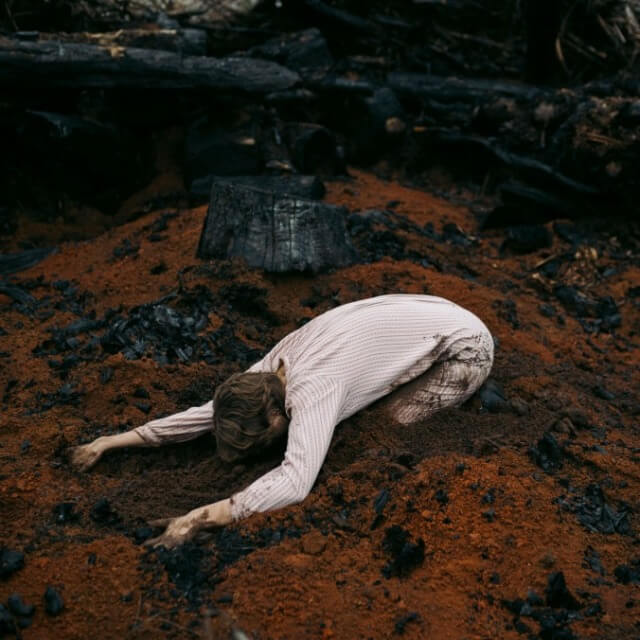 Hannah Frances’s fifth album just gets better and better with every single listen. The Chicagoan’s songwriting sticks to you like glue, and songs like “Bronwyn,” “Husk” and “Vacant Intimacies” are so pensive and full of solemn conviction that you’d be remiss to not engage with it at every waking moment. Keeper of the Shepherd sounds like a rebirth, which makes sense, given that these songs arrived in the wake of a three-years-long prolific period of songs written after the sudden loss of her father. The question lingering beneath the surface of Keeper of the Shepherd: Where do we go once we’ve said goodbye to our grief? In Frances’s words: “I cannot be here without me.” The days of her summery folk plucking have fallen by the wayside, as her work on Keeper of the Shepherd embraces a more off-kilter country sound tightened up by Western arpeggios and jangly, metallic set dressings of vignette instrumentation summoned to soundtrack musings on ecological imagery and mythological archetypes. All of these elements come together to define Frances’s own metamorphosis—her shedding of misery in the name of finding transcendence that is both personal and cosmic. “Birthed by returning to the ruins,” she beckons; Keeper of the Shepherd sketches healing into the shapes of empty hands, hollow homes and vacant intimacies. —Matt Mitchell [Ruination Record Co.]
Hannah Frances’s fifth album just gets better and better with every single listen. The Chicagoan’s songwriting sticks to you like glue, and songs like “Bronwyn,” “Husk” and “Vacant Intimacies” are so pensive and full of solemn conviction that you’d be remiss to not engage with it at every waking moment. Keeper of the Shepherd sounds like a rebirth, which makes sense, given that these songs arrived in the wake of a three-years-long prolific period of songs written after the sudden loss of her father. The question lingering beneath the surface of Keeper of the Shepherd: Where do we go once we’ve said goodbye to our grief? In Frances’s words: “I cannot be here without me.” The days of her summery folk plucking have fallen by the wayside, as her work on Keeper of the Shepherd embraces a more off-kilter country sound tightened up by Western arpeggios and jangly, metallic set dressings of vignette instrumentation summoned to soundtrack musings on ecological imagery and mythological archetypes. All of these elements come together to define Frances’s own metamorphosis—her shedding of misery in the name of finding transcendence that is both personal and cosmic. “Birthed by returning to the ruins,” she beckons; Keeper of the Shepherd sketches healing into the shapes of empty hands, hollow homes and vacant intimacies. —Matt Mitchell [Ruination Record Co.]
44. MIKE & Tony Seltzer: Pinball
 No rapper has had a recent run quite like MIKE. Starting with Beware of the Monkey in 2022, making a brief stop at Faith is a Rock, his collab with the Alchemist and Wiki, and then stretching into last year’s masterful Burning Desire, the New York City MC’s 2024 record, Pinball, continues that momentum. Working with Brooklyn producer Tony Seltzer, MIKE makes slacker rap sound high-stakes. The vibes are potent across the 11-track wonderland, with light beats and a streamlined focus on flows. With guest performances from Earl Sweatshirt (“On God”), Jay Critch (“Reminiscing”) and Niontay (“2k24 Tour”), Pinball expands and exhales in a hazy, stream-of-consciousness style that only MIKE can summon. “Skurrr” and “Lethal Weapon” are vignettes that feel sentimental, adventurous and quick through timeless sampling, while “Underground Kingz,” “Pinball” and “2k24 Tour” slowburn into these progressive, elemental ruminations on dank weed, more money than you’d know what to do with and MIKE’s own talents at the mic. It’s the kind of hubris that works because MIKE’s flaunting of riches feels prolific and worth buying into, especially when it’s presented on a 21-minute mixtape like this. MIKE has dropped at least one album a year since 2017 and he has another one on the way in early 2025; it’s clear that his apex is a marathon, not a sprint. —Matt Mitchell [10k]
No rapper has had a recent run quite like MIKE. Starting with Beware of the Monkey in 2022, making a brief stop at Faith is a Rock, his collab with the Alchemist and Wiki, and then stretching into last year’s masterful Burning Desire, the New York City MC’s 2024 record, Pinball, continues that momentum. Working with Brooklyn producer Tony Seltzer, MIKE makes slacker rap sound high-stakes. The vibes are potent across the 11-track wonderland, with light beats and a streamlined focus on flows. With guest performances from Earl Sweatshirt (“On God”), Jay Critch (“Reminiscing”) and Niontay (“2k24 Tour”), Pinball expands and exhales in a hazy, stream-of-consciousness style that only MIKE can summon. “Skurrr” and “Lethal Weapon” are vignettes that feel sentimental, adventurous and quick through timeless sampling, while “Underground Kingz,” “Pinball” and “2k24 Tour” slowburn into these progressive, elemental ruminations on dank weed, more money than you’d know what to do with and MIKE’s own talents at the mic. It’s the kind of hubris that works because MIKE’s flaunting of riches feels prolific and worth buying into, especially when it’s presented on a 21-minute mixtape like this. MIKE has dropped at least one album a year since 2017 and he has another one on the way in early 2025; it’s clear that his apex is a marathon, not a sprint. —Matt Mitchell [10k]
43. Kim Deal: Nobody Loves You More
 It should surprise no one that Kim Deal’s first-ever solo full-length Nobody Loves You More is both unmistakably her and also a fresh evolution of her sound. All of her integral elements are here: tenderness intertwined with tartness; spacious room tone; thumps and whooshes and bug-zapper guitars; familiar feelings conveyed through strange combinations of words. And then there is her voice—still a fusion of charm, attitude, a choir of angels and fine-grit sandpaper, just as it has been all along. Every song on Nobody Loves You More could be a Breeders song, but some more than others. “Disobedience,” for example, is an astringent stomper that would fit comfortably on the band’s best-known album, 1993’s Last Splash, while the sparkling, skyward “Come Running” feels like a spiritual cousin to the back half of 2018’s All Nerve. And “Wish I Was” is exactly the kind of effervescent pop song Deal has perfected over the years, right down to the slightly off-kilter expressions of feeling: “How I aspire you / The look and the lie of you,” she sings breathily over a propulsive bass line. “I see the sun on your hair.” More often, though, these songs capture Deal in her native mode: exploring new ideas and trying new things. The title track, which begins the record, blossoms into exquisite beauty thanks first to a string section, and then a startlingly vibrant horn section. (Horns also augment the pleasant bob of “Coast,” probably the catchiest song on the album.) On “Crystal Breath,” she leans into prickly post-punk guitar lines and what sounds like mechanized beats. And the album’s most rugged track, “Big Ben Beat,” is a mini-maelstrom of strings, synths and fuzzy noise as Deal aggressively spits out non-sequiturs: “Bursting bodies / Headbang ponytails / Battle childish giants / Talking to the wall.” —Ben Salmon [4AD]
It should surprise no one that Kim Deal’s first-ever solo full-length Nobody Loves You More is both unmistakably her and also a fresh evolution of her sound. All of her integral elements are here: tenderness intertwined with tartness; spacious room tone; thumps and whooshes and bug-zapper guitars; familiar feelings conveyed through strange combinations of words. And then there is her voice—still a fusion of charm, attitude, a choir of angels and fine-grit sandpaper, just as it has been all along. Every song on Nobody Loves You More could be a Breeders song, but some more than others. “Disobedience,” for example, is an astringent stomper that would fit comfortably on the band’s best-known album, 1993’s Last Splash, while the sparkling, skyward “Come Running” feels like a spiritual cousin to the back half of 2018’s All Nerve. And “Wish I Was” is exactly the kind of effervescent pop song Deal has perfected over the years, right down to the slightly off-kilter expressions of feeling: “How I aspire you / The look and the lie of you,” she sings breathily over a propulsive bass line. “I see the sun on your hair.” More often, though, these songs capture Deal in her native mode: exploring new ideas and trying new things. The title track, which begins the record, blossoms into exquisite beauty thanks first to a string section, and then a startlingly vibrant horn section. (Horns also augment the pleasant bob of “Coast,” probably the catchiest song on the album.) On “Crystal Breath,” she leans into prickly post-punk guitar lines and what sounds like mechanized beats. And the album’s most rugged track, “Big Ben Beat,” is a mini-maelstrom of strings, synths and fuzzy noise as Deal aggressively spits out non-sequiturs: “Bursting bodies / Headbang ponytails / Battle childish giants / Talking to the wall.” —Ben Salmon [4AD]
Read: “Kim Deal, You Were Worth the Wait”
42. Laura Marling: Patterns in Repeat
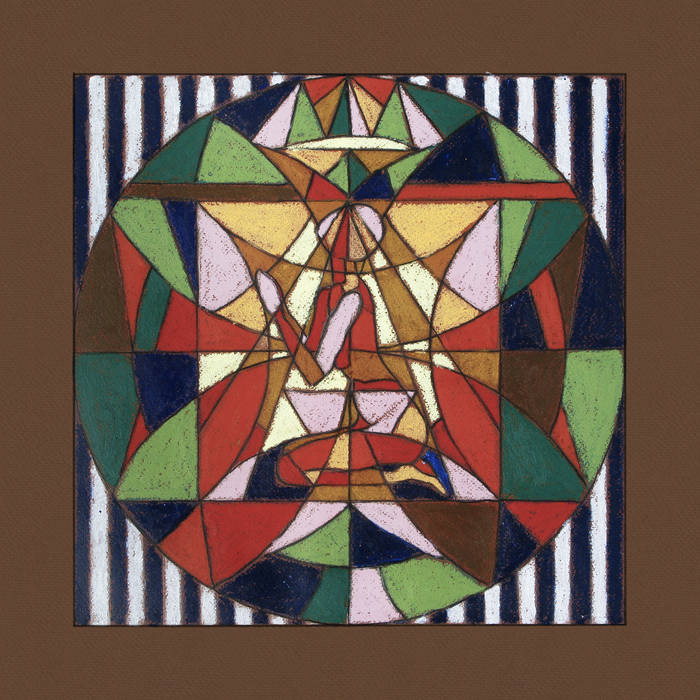 By all accounts, motherhood changes you. On Patterns in Repeat, those shifts can be heard as much as they can be felt. The album is the most sonically stripped-down project of Laura Marling’s catalogue. With no percussion, the record’s heartbeat is pulled from an intimate lexicon: a lulling piano on “No One’s Gonna Love You Like I Can”; propulsive guitar plucks on the Leonard Cohen-esque “Caroline”; weaving string arrangements on “Patterns.” Much of the album was recorded with Marling’s daughter in the room, inspiring a soundscape gentle enough not to stir a newborn from their slumber. Yet while her sound has been softened, Marling’s conviction remains sharp. Like many 30-something-year-old women, I find myself at the intersection of biological clocks, Hallmark aversion, and an increasingly dominant discourse about the pains of motherhood. What will it take from me? What might I regret? In a pile-up of content (understandably) highlighting the difficulties of being a mom, Marling’s euphoric certainty is a refreshing counteragent. “I want you to know that I gave it up willingly,” she sings to her daughter on the album’s title track. “Nothing real was lost in the bringing of you to me.” Over the course of Marling’s career, she’s fiercely protected her notions of freedom and independence as they relate to womanhood. And yet, while many women might fear motherhood as the ultimate threat to those values, Patterns in Repeat suggests the opposite. —Emilie Hanskamp [Partisan]
By all accounts, motherhood changes you. On Patterns in Repeat, those shifts can be heard as much as they can be felt. The album is the most sonically stripped-down project of Laura Marling’s catalogue. With no percussion, the record’s heartbeat is pulled from an intimate lexicon: a lulling piano on “No One’s Gonna Love You Like I Can”; propulsive guitar plucks on the Leonard Cohen-esque “Caroline”; weaving string arrangements on “Patterns.” Much of the album was recorded with Marling’s daughter in the room, inspiring a soundscape gentle enough not to stir a newborn from their slumber. Yet while her sound has been softened, Marling’s conviction remains sharp. Like many 30-something-year-old women, I find myself at the intersection of biological clocks, Hallmark aversion, and an increasingly dominant discourse about the pains of motherhood. What will it take from me? What might I regret? In a pile-up of content (understandably) highlighting the difficulties of being a mom, Marling’s euphoric certainty is a refreshing counteragent. “I want you to know that I gave it up willingly,” she sings to her daughter on the album’s title track. “Nothing real was lost in the bringing of you to me.” Over the course of Marling’s career, she’s fiercely protected her notions of freedom and independence as they relate to womanhood. And yet, while many women might fear motherhood as the ultimate threat to those values, Patterns in Repeat suggests the opposite. —Emilie Hanskamp [Partisan]
41. Merce Lemon: Watch Me Drive Them Dogs Wild
 Merce Lemon has toyed with sincerity over her career as a songwriter, having grown up in the lively Pittsburgh DIY scene amongst grown-up and kid bands, learning to venerate punk and country all alike. Four years later, Lemon keeps true to that earnestness but dials up the grandiosity, landing on an Americana rock style for Watch Me Drive Them Dogs Wild, a collection that leans into the poignant possibilities of cutting lyrics and bold composition. “Backyard Lover” unfurls over five-and-a-half minutes, all of them needed as Lemon reflects on grief, a frequent subject of reflection since the death of her best friend at just 15; “Now I’m falling to a dark place / Where just remembering her death’s / About all I can take.” When the song climaxes on “You fucking liar,” Lemon accuses herself of treachery as she wrestles with self-directed criticism. It’s about as inflammatory as she gets: Watch Me Drive Them Dogs Wild is largely pensive, but her bandmates’ brawny guitar work bolsters her deliberate lyricism, exposing every moment of conflict and clarity. Lemon lets herself get decidedly interpersonal, like on pre-breakup anthem “Window,” and rests on specific images of cats on window sills but concludes with universal feelings of hearts thumping, anticipating the inevitable. Lemon lets the verdant imagery and casual references to landmarks in her life form a constellation, something recognizable from a healthy distance. Watch Me Drive Them Dogs Wild is a cosmic album with a veneration for the world around her that helps her appreciate the intricacies of human sociality. Her voice is youthful but her words betray wisdom earned from maintaining both feet on the ground. —Devon Chodzin [Darling Recordings]
Merce Lemon has toyed with sincerity over her career as a songwriter, having grown up in the lively Pittsburgh DIY scene amongst grown-up and kid bands, learning to venerate punk and country all alike. Four years later, Lemon keeps true to that earnestness but dials up the grandiosity, landing on an Americana rock style for Watch Me Drive Them Dogs Wild, a collection that leans into the poignant possibilities of cutting lyrics and bold composition. “Backyard Lover” unfurls over five-and-a-half minutes, all of them needed as Lemon reflects on grief, a frequent subject of reflection since the death of her best friend at just 15; “Now I’m falling to a dark place / Where just remembering her death’s / About all I can take.” When the song climaxes on “You fucking liar,” Lemon accuses herself of treachery as she wrestles with self-directed criticism. It’s about as inflammatory as she gets: Watch Me Drive Them Dogs Wild is largely pensive, but her bandmates’ brawny guitar work bolsters her deliberate lyricism, exposing every moment of conflict and clarity. Lemon lets herself get decidedly interpersonal, like on pre-breakup anthem “Window,” and rests on specific images of cats on window sills but concludes with universal feelings of hearts thumping, anticipating the inevitable. Lemon lets the verdant imagery and casual references to landmarks in her life form a constellation, something recognizable from a healthy distance. Watch Me Drive Them Dogs Wild is a cosmic album with a veneration for the world around her that helps her appreciate the intricacies of human sociality. Her voice is youthful but her words betray wisdom earned from maintaining both feet on the ground. —Devon Chodzin [Darling Recordings]
Read: “Merce Lemon: The Best of What’s Next”
40. MICHELLE: Songs About You Specifically
 Seeing R&B-pop collective MICHELLE play Rough Trade NYC in 2019 was a revelatory experience. My friend and I had gone to the show mostly to see Grace Ives, but were blown away by the group; their coordinated orange outfits and heavenly harmonies that brought me back to the days when I was obsessed with Destiny’s Child. The next year, they released their sultry, summery debut HEATWAVE, which was a 30 minute love letter to their hometown of New York. 2022’S AFTER DINNER WE TALK DREAMS saw MICHELLE coming into their own as adults, and now, with Songs About You Specifically, the six-piece explore their respective interiorities in 11 blissed-out, effervescent pop tracks. From the tumultuous relationship documented in opener “Mentos and Coke” (“You and I like Mentos and Coke / Stable if you likе when we explodе”) to trepidations about getting older in the final song “Trackstar” (“No, I’m not ready to grow / Out of my socks and sneakers a new creature tall and alone”), MICHELLE’s latest album has something for everyone, delivered in a most delectable pop package. —Clare Martin [Transgressive]
Seeing R&B-pop collective MICHELLE play Rough Trade NYC in 2019 was a revelatory experience. My friend and I had gone to the show mostly to see Grace Ives, but were blown away by the group; their coordinated orange outfits and heavenly harmonies that brought me back to the days when I was obsessed with Destiny’s Child. The next year, they released their sultry, summery debut HEATWAVE, which was a 30 minute love letter to their hometown of New York. 2022’S AFTER DINNER WE TALK DREAMS saw MICHELLE coming into their own as adults, and now, with Songs About You Specifically, the six-piece explore their respective interiorities in 11 blissed-out, effervescent pop tracks. From the tumultuous relationship documented in opener “Mentos and Coke” (“You and I like Mentos and Coke / Stable if you likе when we explodе”) to trepidations about getting older in the final song “Trackstar” (“No, I’m not ready to grow / Out of my socks and sneakers a new creature tall and alone”), MICHELLE’s latest album has something for everyone, delivered in a most delectable pop package. —Clare Martin [Transgressive]
39. Willi Carlisle: Critterland
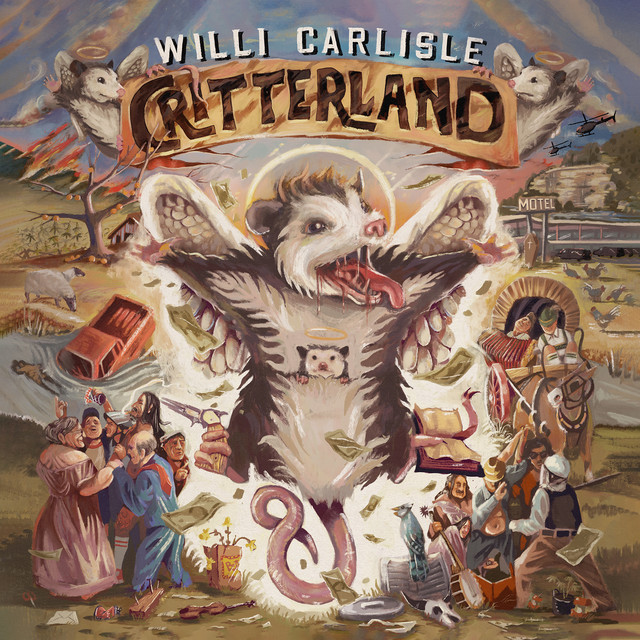 On Critterland, Willi Carlisle delivers a vibrant, heartbreaking and necessary collection of 10 songs about drug use, lovesick futures and the unavoidable, often-devastating convergence of both worlds. A song like “Dry County Dust” is centered around the POV of someone who retreats to their home to get clean, while “When the Pills Wear Off” is, plainly, about losing a friend to overdose. “Thank God forgiveness comes in so many shapes,” Carlisle sings on the former. “I been travelin’ in anger, tryna ditch the shakes. If you go blind in Texarkana, can you still wake up in grace?”; “I lost friends to heroin, plenty more to lovin’ them,” he croons on the latter. “Strung out on the highway like we couldn’t read the signs.” Something I’ve always appreciated about Carlisle’s work is how it examines the grim, relentless world we live in with a very kind and honest eye. There’s a lot of beauty juxtaposed with darkness and grief. On a song like “Two-Headed Lamb,” he sings about the titular God-made fuck-up—lamenting a life too strange to survive—while also reveling in the beauty of persimmons and singing robins; on “I Want No Children,” Carlisle ruminates on whether the measure of a man is made of love, and what it means to pass down a bloodline. Language is a gift, and he has crafted his own on Critterland, an album that is as forgiving as it is painful. —Matt Mitchell [Signature Sounds]
On Critterland, Willi Carlisle delivers a vibrant, heartbreaking and necessary collection of 10 songs about drug use, lovesick futures and the unavoidable, often-devastating convergence of both worlds. A song like “Dry County Dust” is centered around the POV of someone who retreats to their home to get clean, while “When the Pills Wear Off” is, plainly, about losing a friend to overdose. “Thank God forgiveness comes in so many shapes,” Carlisle sings on the former. “I been travelin’ in anger, tryna ditch the shakes. If you go blind in Texarkana, can you still wake up in grace?”; “I lost friends to heroin, plenty more to lovin’ them,” he croons on the latter. “Strung out on the highway like we couldn’t read the signs.” Something I’ve always appreciated about Carlisle’s work is how it examines the grim, relentless world we live in with a very kind and honest eye. There’s a lot of beauty juxtaposed with darkness and grief. On a song like “Two-Headed Lamb,” he sings about the titular God-made fuck-up—lamenting a life too strange to survive—while also reveling in the beauty of persimmons and singing robins; on “I Want No Children,” Carlisle ruminates on whether the measure of a man is made of love, and what it means to pass down a bloodline. Language is a gift, and he has crafted his own on Critterland, an album that is as forgiving as it is painful. —Matt Mitchell [Signature Sounds]
Read: “Willi Carlisle: The Best of What’s Next”
38. Allegra Krieger: Art of the Unseen Infinity Machine
 No more than 14 months have passed since Allegra Krieger released the very good I Keep My Feet on the Fragile Plane (and just 11 since she unvaulted that record’s B-sides), but this new batch of material, Art of the Unseen Infinity Machine, takes her penchant for dizzying, cresting acoustic guitar licks and coats them with an electric varnish. They reveal a layer of Krieger’s approach to performance that isn’t surface-level; they are a, as she puts it, “collection of different fragmented lyrical moments put together and musical ideas.” And that is how Krieger folds herself into her niche. Take a song like “Never Arriving” and how its lyrics form a string of observations that sound like a laundry list of considerations: “No crying, just lifting your chest to the sky,” she sings. “Part of the answering, a blue screen, forms things with which you align. There is no sharpness, no cutting, no anger under its breath. Just an unraveling, a traveling into a slow, wandering death.” Krieger may never pose a question in her music, but you certainly can’t help but search for answers while you’re listening to it. And “Never Arriving” is, as Krieger puts it, a song without enough information that needs a “driving energy” to make it stick the landing. It’s the type of song that she’d normally shy away from playing solo, because it demands a full-band environment and “doesn’t hit the same way” when it’s only backed by one acoustic guitar. But when she plugs in her custom-made Telecaster, she becomes immune to commonality, balancing a quick arc with a bombastic, soulful arrangement tinged with her one-of-a-kind lexicon. “Eliminate edges with wonder, for the sake of becoming light” rings in, and you’re left wondering: “How the hell did she come up with that?” Infinity Machine, like all of Krieger’s records, yanks connection out of a place of confusion, and she writes into that as a way of self-comfort. Her material is like a math problem—her music and lyrics are an equation with a resolution, and they offer answers to unanswerable questions. “The night moves as slow as a lifetime moves fast” finally makes sense once you’re living in it. —Matt Mitchell [Double Double Whammy]
No more than 14 months have passed since Allegra Krieger released the very good I Keep My Feet on the Fragile Plane (and just 11 since she unvaulted that record’s B-sides), but this new batch of material, Art of the Unseen Infinity Machine, takes her penchant for dizzying, cresting acoustic guitar licks and coats them with an electric varnish. They reveal a layer of Krieger’s approach to performance that isn’t surface-level; they are a, as she puts it, “collection of different fragmented lyrical moments put together and musical ideas.” And that is how Krieger folds herself into her niche. Take a song like “Never Arriving” and how its lyrics form a string of observations that sound like a laundry list of considerations: “No crying, just lifting your chest to the sky,” she sings. “Part of the answering, a blue screen, forms things with which you align. There is no sharpness, no cutting, no anger under its breath. Just an unraveling, a traveling into a slow, wandering death.” Krieger may never pose a question in her music, but you certainly can’t help but search for answers while you’re listening to it. And “Never Arriving” is, as Krieger puts it, a song without enough information that needs a “driving energy” to make it stick the landing. It’s the type of song that she’d normally shy away from playing solo, because it demands a full-band environment and “doesn’t hit the same way” when it’s only backed by one acoustic guitar. But when she plugs in her custom-made Telecaster, she becomes immune to commonality, balancing a quick arc with a bombastic, soulful arrangement tinged with her one-of-a-kind lexicon. “Eliminate edges with wonder, for the sake of becoming light” rings in, and you’re left wondering: “How the hell did she come up with that?” Infinity Machine, like all of Krieger’s records, yanks connection out of a place of confusion, and she writes into that as a way of self-comfort. Her material is like a math problem—her music and lyrics are an equation with a resolution, and they offer answers to unanswerable questions. “The night moves as slow as a lifetime moves fast” finally makes sense once you’re living in it. —Matt Mitchell [Double Double Whammy]
Read: “Allegra Krieger Remains Open”
37. Chief Keef: Almighty So 2
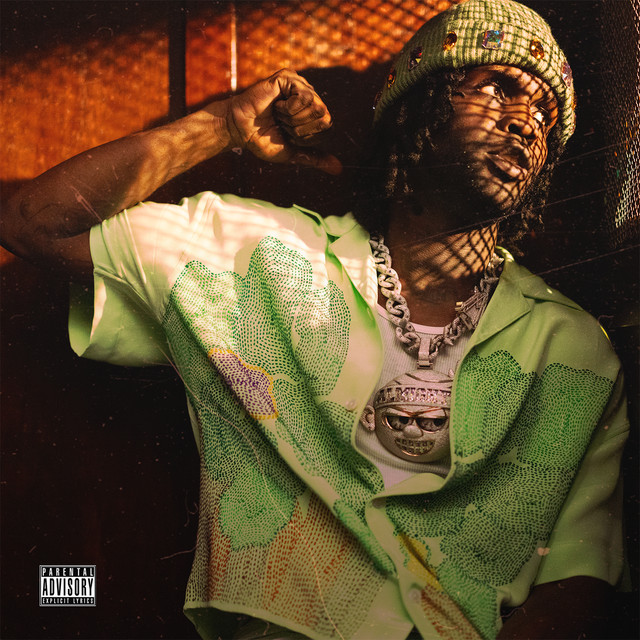 Though it has a certain polish that his breakout work shirked, Chief Keef’s Almighty So 2 has still got all the bluster of the 14-year-old kid who put out the UF Overload tape and the bombast of 18-year-old Keef who changed the game, maybe forever, rapping “This bitch just blew my high,” on the original Almighty So back in 2013. Put more simply: Chief Keef’s still got it. You can tell right from the intro track, the sample of Carl O’s classical choral “O Fortuna” wailing under the rolling snares, voices back and forth “I’m not putting up with this anymore,” “Putting up with what, huh?,” before Keef comes in, assured as ever, to tear it up. It’s grandiose as hell, but still with that irreverent rawness he’s always had. He goes bar for bar and growl for growl with Tierra Whack on “Banded Up,” an impossible feat for anyone besides Keef, it seems, as he’s effortlessly going “Give Chief So’ five hunnid thousand.” Doing the impossible seems to be Almighty So 2’s M.O., and so its madness. Who would have thought that 2024 would be the perfect time for Keef’s visionary drill reimagined under his own crisp and meticulous production? He has always had foresight for days, and a near supernatural awareness of his own necessity. Almighty So 2 is all the proof that even in his blunders, nothing that Chief Keef has done has ever been a fluke. He’s a restless legend—bouncing from Womack samples to bars about Fruit Loops—with a lucid consciousness of his still boundless potential. —Madelyn Dawson [Glo Gang]
Though it has a certain polish that his breakout work shirked, Chief Keef’s Almighty So 2 has still got all the bluster of the 14-year-old kid who put out the UF Overload tape and the bombast of 18-year-old Keef who changed the game, maybe forever, rapping “This bitch just blew my high,” on the original Almighty So back in 2013. Put more simply: Chief Keef’s still got it. You can tell right from the intro track, the sample of Carl O’s classical choral “O Fortuna” wailing under the rolling snares, voices back and forth “I’m not putting up with this anymore,” “Putting up with what, huh?,” before Keef comes in, assured as ever, to tear it up. It’s grandiose as hell, but still with that irreverent rawness he’s always had. He goes bar for bar and growl for growl with Tierra Whack on “Banded Up,” an impossible feat for anyone besides Keef, it seems, as he’s effortlessly going “Give Chief So’ five hunnid thousand.” Doing the impossible seems to be Almighty So 2’s M.O., and so its madness. Who would have thought that 2024 would be the perfect time for Keef’s visionary drill reimagined under his own crisp and meticulous production? He has always had foresight for days, and a near supernatural awareness of his own necessity. Almighty So 2 is all the proof that even in his blunders, nothing that Chief Keef has done has ever been a fluke. He’s a restless legend—bouncing from Womack samples to bars about Fruit Loops—with a lucid consciousness of his still boundless potential. —Madelyn Dawson [Glo Gang]
36. Hayden Pedigo: Live in Amarillo, Texas
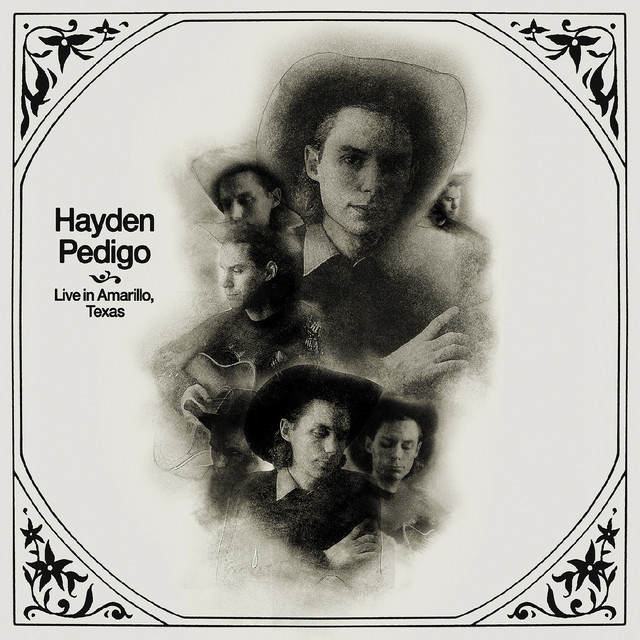 Live in Amarillo, Texas is not just a live record, it’s a book closing. Recorded two nights before Christmas at the Amarillo Globe-News Center in 2023, the seven-song (except, really, it’s eight) release captures Hayden Pedigo at the tail-end of a six-month, non-stop tour after his second Mexican Summer album, The Happiest Times I Ever Ignored, came out. It’s a hometown show that, without the occasional rambles of an audience hollering and clapping, is as passionate and definitive as any studio recording. According to Pedigo, Live in Amarillo, Texas is his attempt at “capturing what [John] Fahey did on his Great Santa Barbara Oil Slick live album, or Townes [Van Zandt’s] Live at the Old Quarter.” In an era where live records are as rare as they are perfect, Live in Amarillo, Texas is a miraculous and generous translation of some of the most important instrumental music of this generation. The project is a tapestry of The Happiest Times I Ever Ignored and its predecessor, Letting Go, both woven into one visceral template. Live in Amarillo, Texas is indescribable yet beautiful—an album without words that doesn’t need any. —Matt Mitchell [Mexican Summer]
Live in Amarillo, Texas is not just a live record, it’s a book closing. Recorded two nights before Christmas at the Amarillo Globe-News Center in 2023, the seven-song (except, really, it’s eight) release captures Hayden Pedigo at the tail-end of a six-month, non-stop tour after his second Mexican Summer album, The Happiest Times I Ever Ignored, came out. It’s a hometown show that, without the occasional rambles of an audience hollering and clapping, is as passionate and definitive as any studio recording. According to Pedigo, Live in Amarillo, Texas is his attempt at “capturing what [John] Fahey did on his Great Santa Barbara Oil Slick live album, or Townes [Van Zandt’s] Live at the Old Quarter.” In an era where live records are as rare as they are perfect, Live in Amarillo, Texas is a miraculous and generous translation of some of the most important instrumental music of this generation. The project is a tapestry of The Happiest Times I Ever Ignored and its predecessor, Letting Go, both woven into one visceral template. Live in Amarillo, Texas is indescribable yet beautiful—an album without words that doesn’t need any. —Matt Mitchell [Mexican Summer]
Read: “The Cosmic Truth of Hayden Pedigo, Texas’ Fingerstyling Prodigal Son”
35. Yaya Bey: Ten Fold
 On Ten Fold, Bey kicks into a new groove: freedom. And not just any kind of freedom—she rests in a freedom of knowing when to let go when the world around you is constantly changing. Bey is ever-evolving. Ten Fold sounds like Bey’s most liberating music to date. It’s a 16-track thesis on the essence of survival. In an Instagram post about the album, Bey described it as a “recording of the year I lost the things I thought I could not live without and the proof that I did indeed survive… and thrive.” Ten Fold sounds like the type of music you play when in dire need of motivation to get by. Sometimes it’s a cathartic gospel. Sometimes it’s a laugh-out-loud satirical croon. And other times, it’s just a free-flowing pose. Bey’s sense of humor shines. There are songs like the laugh-out-loud “Eric Adams in the Club,” which critiques the ways in which the New York mayor seeks to be the life of the party amid residents struggling to pay rent. There’s also the super romantic “Carl Thomas Sliding Down the Wall”—a nod to the ‘90’s R&B singer whose music instantly conjures the amatory feelings that one works so hard to suppress. Then there are the more serious ballads like “The Evidence,” which offers a poignant reminder that there are reasons to keep living. Elsewhere on the album, “Sir Princess Bad Bitch” is anchored by funky synths and an infectious confidence that makes you want to own the dance floor. It was the music Bey needed to hear at a time filled with so much uncertainty. —DeAsia Page [Big Dada]
On Ten Fold, Bey kicks into a new groove: freedom. And not just any kind of freedom—she rests in a freedom of knowing when to let go when the world around you is constantly changing. Bey is ever-evolving. Ten Fold sounds like Bey’s most liberating music to date. It’s a 16-track thesis on the essence of survival. In an Instagram post about the album, Bey described it as a “recording of the year I lost the things I thought I could not live without and the proof that I did indeed survive… and thrive.” Ten Fold sounds like the type of music you play when in dire need of motivation to get by. Sometimes it’s a cathartic gospel. Sometimes it’s a laugh-out-loud satirical croon. And other times, it’s just a free-flowing pose. Bey’s sense of humor shines. There are songs like the laugh-out-loud “Eric Adams in the Club,” which critiques the ways in which the New York mayor seeks to be the life of the party amid residents struggling to pay rent. There’s also the super romantic “Carl Thomas Sliding Down the Wall”—a nod to the ‘90’s R&B singer whose music instantly conjures the amatory feelings that one works so hard to suppress. Then there are the more serious ballads like “The Evidence,” which offers a poignant reminder that there are reasons to keep living. Elsewhere on the album, “Sir Princess Bad Bitch” is anchored by funky synths and an infectious confidence that makes you want to own the dance floor. It was the music Bey needed to hear at a time filled with so much uncertainty. —DeAsia Page [Big Dada]
34. Ezra Feinberg: Soft Power
 I happened across Ezra Feinberg’s exemplary third album, Soft Power, in my favorite way possible: by pure chance. My husband and I were listening to RTÉ lyric fm, Ireland’s classical radio station that gets turned over to the music weirdos after 7pm. On that particular Sunday evening, the DJ played a Feinberg track that immediately made me sit up a little straighter in bed. “Future Sands” (ft. David Lackner) sifted into my ears: lithe flute, hypnotically hand-picked guitar, delicate arpeggiated synth, a digital chorus and atmospheric whooshes of sound, like the wind whistling over desert dunes. The song was somehow peaceful while it surged with forward momentum, a mesmerizing paradox reminiscent of the ocean’s serene yet ever-churning waters. This sort of cerebral songwriting—with shifting layers and dynamics that seem to cast a spell on the listener—feels utterly fitting when you learn that Feinberg is a psychoanalyst, as well as being a composer, guitarist and a founding member of the psychedelic band Citay. He creates music that feels like a cheat code for my brain, the sort of sounds that, depending on what I need, can provide me with a moment of much-needed calm, or the right level of focus to get through the next task. Feinberg provides no swelling conclusions on Soft Power, just a wordless call to take a quiet moment for ourselves. The understated elegance of this album still manages to take my breath away on the umpteenth listen. With its minimalist tendencies yet maximalist feelings, Feinberg’s latest release reminds us all to marvel in the everyday wonders that surround us. —Clare Martin [Tonal Union]
I happened across Ezra Feinberg’s exemplary third album, Soft Power, in my favorite way possible: by pure chance. My husband and I were listening to RTÉ lyric fm, Ireland’s classical radio station that gets turned over to the music weirdos after 7pm. On that particular Sunday evening, the DJ played a Feinberg track that immediately made me sit up a little straighter in bed. “Future Sands” (ft. David Lackner) sifted into my ears: lithe flute, hypnotically hand-picked guitar, delicate arpeggiated synth, a digital chorus and atmospheric whooshes of sound, like the wind whistling over desert dunes. The song was somehow peaceful while it surged with forward momentum, a mesmerizing paradox reminiscent of the ocean’s serene yet ever-churning waters. This sort of cerebral songwriting—with shifting layers and dynamics that seem to cast a spell on the listener—feels utterly fitting when you learn that Feinberg is a psychoanalyst, as well as being a composer, guitarist and a founding member of the psychedelic band Citay. He creates music that feels like a cheat code for my brain, the sort of sounds that, depending on what I need, can provide me with a moment of much-needed calm, or the right level of focus to get through the next task. Feinberg provides no swelling conclusions on Soft Power, just a wordless call to take a quiet moment for ourselves. The understated elegance of this album still manages to take my breath away on the umpteenth listen. With its minimalist tendencies yet maximalist feelings, Feinberg’s latest release reminds us all to marvel in the everyday wonders that surround us. —Clare Martin [Tonal Union]
33. Fabiana Palladino: Fabiana Palladino
 On her self-titled debut album, Palladino’s breakup anthems offer the velveteen emotion of ‘80s soul pop with lyrics that don’t hold back. Where hazy, vintage production can erect a barrier between listener and singer, Palladino’s intimate, Janet Jacksonian musings feel immediate, breathing much-needed vitality into a recognizable sound. 21st century pop loves to play in the sandboxes of its progenitors, to varying degrees of success. In the underground, there is a wealth of musicians borrowing vintage pop’s tools and updating them just enough to bridge past and present. Fabiana Palladino approximates these gestures and more, incorporating soul and funk on tracks overcome with emotion. Her feelings are more kinetic, less contemplative. Whether on the guitar-driven balladry of “Give Me A Sign” or on the booming clarity of “I Can’t Dream Anymore,” Palladino’s breakup songs are rich in style and seriousness. It’s the kind of pop that’s meant to carry you away on a bed of pure feeling. With this album, Palladino recalls a time when pop craftsmanship didn’t require unfettered access to tabloid archives, when thematic relatability and sonic commitment could let anyone with reasonable talent top the charts. Say what you will about the Stock Aitken Waterman era of British radio pop—and there’s much to be said—but at least the Hit Factory’s assembly line could generate pop celebrity without relying on stars excavating the minutiae of their public personas for lyrical content. Palladino splits the difference between SAW cynicism and contemporary realities with pop that draws from personal experience but shared with bigger, universal questions in mind, supported by detailed, variegated production. It’s pop that works its way in with iron hooks arranged to stoke feelings of clarity, grief and desire. That’s what separates the flavor-of-the-month chart topper from a true classic: genuine depth and unsquashable memorability. —Devon Chodzin [XL]
On her self-titled debut album, Palladino’s breakup anthems offer the velveteen emotion of ‘80s soul pop with lyrics that don’t hold back. Where hazy, vintage production can erect a barrier between listener and singer, Palladino’s intimate, Janet Jacksonian musings feel immediate, breathing much-needed vitality into a recognizable sound. 21st century pop loves to play in the sandboxes of its progenitors, to varying degrees of success. In the underground, there is a wealth of musicians borrowing vintage pop’s tools and updating them just enough to bridge past and present. Fabiana Palladino approximates these gestures and more, incorporating soul and funk on tracks overcome with emotion. Her feelings are more kinetic, less contemplative. Whether on the guitar-driven balladry of “Give Me A Sign” or on the booming clarity of “I Can’t Dream Anymore,” Palladino’s breakup songs are rich in style and seriousness. It’s the kind of pop that’s meant to carry you away on a bed of pure feeling. With this album, Palladino recalls a time when pop craftsmanship didn’t require unfettered access to tabloid archives, when thematic relatability and sonic commitment could let anyone with reasonable talent top the charts. Say what you will about the Stock Aitken Waterman era of British radio pop—and there’s much to be said—but at least the Hit Factory’s assembly line could generate pop celebrity without relying on stars excavating the minutiae of their public personas for lyrical content. Palladino splits the difference between SAW cynicism and contemporary realities with pop that draws from personal experience but shared with bigger, universal questions in mind, supported by detailed, variegated production. It’s pop that works its way in with iron hooks arranged to stoke feelings of clarity, grief and desire. That’s what separates the flavor-of-the-month chart topper from a true classic: genuine depth and unsquashable memorability. —Devon Chodzin [XL]
32. Nilüfer Yanya: My Method Actor
 On her third studio album, Nilüfer Yanya is learning how to step into her own identity once again. My Method Actor is refreshingly introspective and truthful, and finds Yanya surrendering to the emotions and experience that overpower her by taking a look into her psyche, getting her own advice. It pours out of the London singer-songwriter like a warm honesty in the form of twangy reverb and edgy acoustics, grungy solos and layered melancholy. Yanya lays her worries on the line: “The minute I’m not in control / I’m tearing up inside,” she admits breathlessly on “Like I Say (I runaway).” She reasons with her fears of abandonment, loneliness and being the worst version of herself earnestly and eloquently, as if she’s relinquishing all of this in real time. My Method Actor is powerful in the way that it is established; Yanya’s hushed vocals flourish over lauding string symphonies as they intertwine with instrumentals that sound like early 2000s soft rock tracks. She finds her niche as she searches for herself, looking inward to figure out how her own method actor would behave in times like these. It’s devastatingly real in the same way it’s gorgeously lush: “Shut up won’t you listen, won’t you?” she desperately begs on “Just A Western.” As Yanya says herself, life isn’t a Western and the “beautiful lines that can make you feel something” can turn an acting role tragic at the same time. But, she’s trudging through the mess she’s found herself in, and My Method Actor proves that Yanya knows that destiny is around the corner. —Alli Dempsey [Ninja Tune]
On her third studio album, Nilüfer Yanya is learning how to step into her own identity once again. My Method Actor is refreshingly introspective and truthful, and finds Yanya surrendering to the emotions and experience that overpower her by taking a look into her psyche, getting her own advice. It pours out of the London singer-songwriter like a warm honesty in the form of twangy reverb and edgy acoustics, grungy solos and layered melancholy. Yanya lays her worries on the line: “The minute I’m not in control / I’m tearing up inside,” she admits breathlessly on “Like I Say (I runaway).” She reasons with her fears of abandonment, loneliness and being the worst version of herself earnestly and eloquently, as if she’s relinquishing all of this in real time. My Method Actor is powerful in the way that it is established; Yanya’s hushed vocals flourish over lauding string symphonies as they intertwine with instrumentals that sound like early 2000s soft rock tracks. She finds her niche as she searches for herself, looking inward to figure out how her own method actor would behave in times like these. It’s devastatingly real in the same way it’s gorgeously lush: “Shut up won’t you listen, won’t you?” she desperately begs on “Just A Western.” As Yanya says herself, life isn’t a Western and the “beautiful lines that can make you feel something” can turn an acting role tragic at the same time. But, she’s trudging through the mess she’s found herself in, and My Method Actor proves that Yanya knows that destiny is around the corner. —Alli Dempsey [Ninja Tune]
31. Uniform: American Standard
 “It’s something else / It can’t be me” screams Michael Berdan on the 21-minute title track to Uniform’s latest offering, American Standard. In his desperate, desolate recollection of living with bulimia, Berdan’s vocals draw from black metal and hardcore that producer Ben Greenberg frames with fiery industrial. In form and content, American Standard is dreadful and pain is abundant. As bleak as it proves—just listen to the last minute of “Permanent Embrace”—the rich, unnerving production and expert musicianship make for a listen that has a stark beauty only understood when putting the most dire emotions into words. There is nothing more affecting than bearing witness to all facets of experience, perhaps especially the most damning and disturbing representations of it. —Devon Chodzin [Sacred Bones]
“It’s something else / It can’t be me” screams Michael Berdan on the 21-minute title track to Uniform’s latest offering, American Standard. In his desperate, desolate recollection of living with bulimia, Berdan’s vocals draw from black metal and hardcore that producer Ben Greenberg frames with fiery industrial. In form and content, American Standard is dreadful and pain is abundant. As bleak as it proves—just listen to the last minute of “Permanent Embrace”—the rich, unnerving production and expert musicianship make for a listen that has a stark beauty only understood when putting the most dire emotions into words. There is nothing more affecting than bearing witness to all facets of experience, perhaps especially the most damning and disturbing representations of it. —Devon Chodzin [Sacred Bones]
30. Mustafa: Dunya
 On “Imaan,” Mustafa is, as he puts it, singing “a love song between two people in search of God and purpose.” It’s about “longing for all that we don’t have evidence of.” The Sudanese-Canadian singer-songwriter presents us with Muslims living through love while navigating Western contradictions. Mustafa uses Sudanese strings and Egyptian oud, along with a sample from Abel Gadir Salim and Americana chords to formulate his own kind of sonic love. His new album, Dunya, is titled after the Arabic word for “the world in all its flaws.” The 12 songs of this project speak effortlessly to that, as Mustafa preserves and celebrates “the ordinary life in the hood” through disarmingly raw and blended genres and stories. He works with Aaron Dessner, Clairo, Nicolas Jaar, Rosalía and others to fashion his vision into such a lived-in revelation; you can hear Dessner’s production style on the Big Red Machine-conjuring “I’ll Go Anywhere” and, on the potent “Gaza is Calling,” Mustafa speaks on a childhood friendship that captures a cross-generational, cross-continental struggle. In it, he sings of a humanity defined by suffering: “Every time I say your name, there’s a war that’s in the way.” It leaves you at a standstill. —Matt Mitchell [Jagjaguwar]
On “Imaan,” Mustafa is, as he puts it, singing “a love song between two people in search of God and purpose.” It’s about “longing for all that we don’t have evidence of.” The Sudanese-Canadian singer-songwriter presents us with Muslims living through love while navigating Western contradictions. Mustafa uses Sudanese strings and Egyptian oud, along with a sample from Abel Gadir Salim and Americana chords to formulate his own kind of sonic love. His new album, Dunya, is titled after the Arabic word for “the world in all its flaws.” The 12 songs of this project speak effortlessly to that, as Mustafa preserves and celebrates “the ordinary life in the hood” through disarmingly raw and blended genres and stories. He works with Aaron Dessner, Clairo, Nicolas Jaar, Rosalía and others to fashion his vision into such a lived-in revelation; you can hear Dessner’s production style on the Big Red Machine-conjuring “I’ll Go Anywhere” and, on the potent “Gaza is Calling,” Mustafa speaks on a childhood friendship that captures a cross-generational, cross-continental struggle. In it, he sings of a humanity defined by suffering: “Every time I say your name, there’s a war that’s in the way.” It leaves you at a standstill. —Matt Mitchell [Jagjaguwar]
29. The Lemon Twigs: A Dream is All We Know
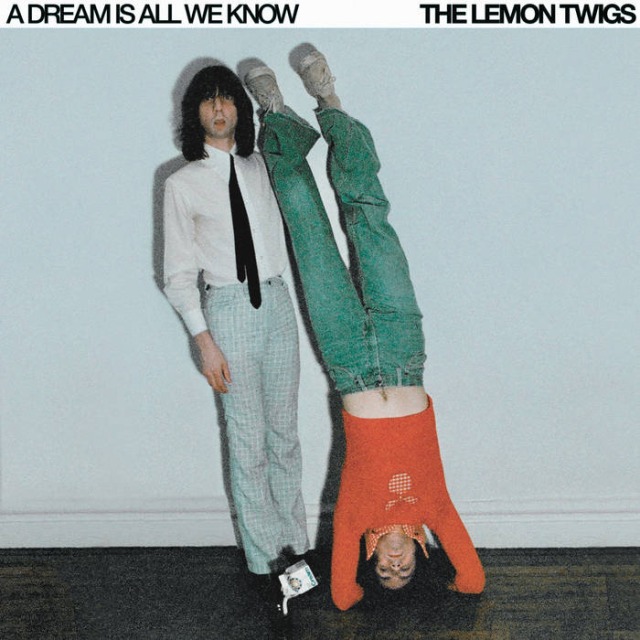 Not even a year ago, Long Island brothers Brian and Michael D’Addario—the Lemon Twigs—unveiled their best record yet, Everything Harmony. Cut to 2024, and they’re already onto their next vision: A Dream Is All We Know. Lead single “My Golden Years” very well might be the greatest song they’ve ever put out, as it is a miraculous display of sun-soaked, power-pop jamming that conjures attitudes of pre-Rubber Soul Beatles magic and impressive, meticulously layered vocals spurred by the Beach Boys, Monkees and the Byrds. There’s about 60 years of influence poking through this track (and it helps that the D’Addarios recorded it on era-specific equipment), but the result is something wholly modern and wholly Lemon Twigs. You can point at different landmarks in the pop music canon, but each direction taken will lead back to Brian and Michael. On a song like “How Can I Love Her More?,” it sounds like the percussion is coming from one stereo drum set in both ears. But, it’s actually two mono drum kits—one being played in each ear. Brian and Michael harmonize like they’re singing up a spiral staircase, as Brian takes the baroque lead and reshapes the horn melody into a Holland-era Beach Boys arrangement. Likewise, he and Michael ham up the whirring, theatrical highs of the title track by resurrecting the discarded pop detritus of proto-synth-pop and meshing it with gliding guitars that zig and zag concurrently with vignettes of vocal harmonies. It’s here that the backbone of their style comes to life: “Love isn’t something you know,” Michael sings out, with Brian sending missile harmonies into the sonic space behind him. “The more you choose it, you’re bound to lose it.” —Matt Mitchell [Captured Tracks]
Not even a year ago, Long Island brothers Brian and Michael D’Addario—the Lemon Twigs—unveiled their best record yet, Everything Harmony. Cut to 2024, and they’re already onto their next vision: A Dream Is All We Know. Lead single “My Golden Years” very well might be the greatest song they’ve ever put out, as it is a miraculous display of sun-soaked, power-pop jamming that conjures attitudes of pre-Rubber Soul Beatles magic and impressive, meticulously layered vocals spurred by the Beach Boys, Monkees and the Byrds. There’s about 60 years of influence poking through this track (and it helps that the D’Addarios recorded it on era-specific equipment), but the result is something wholly modern and wholly Lemon Twigs. You can point at different landmarks in the pop music canon, but each direction taken will lead back to Brian and Michael. On a song like “How Can I Love Her More?,” it sounds like the percussion is coming from one stereo drum set in both ears. But, it’s actually two mono drum kits—one being played in each ear. Brian and Michael harmonize like they’re singing up a spiral staircase, as Brian takes the baroque lead and reshapes the horn melody into a Holland-era Beach Boys arrangement. Likewise, he and Michael ham up the whirring, theatrical highs of the title track by resurrecting the discarded pop detritus of proto-synth-pop and meshing it with gliding guitars that zig and zag concurrently with vignettes of vocal harmonies. It’s here that the backbone of their style comes to life: “Love isn’t something you know,” Michael sings out, with Brian sending missile harmonies into the sonic space behind him. “The more you choose it, you’re bound to lose it.” —Matt Mitchell [Captured Tracks]
28. Mannequin Pussy: I Got Heaven
 Throughout I Got Heaven, Mannequin Pussy’s punk becomes more pliable, intermingling with sprightly synths (“I Don’t Know You”), breezy vocal hooks (“Nothing Like”) and a stripped-down bridge that builds into distant roars (“Softly”). That textural variety shines as one of I Got Heaven’s greatest assets, yet its most discordant songs remain the strongest of the lot. “I Got Heaven” rolls into the equally barbed tune “Loud Bark,” a segue so natural that the tracks feel like two acts of the same narrative. “I got a loud bark / Deep bite,” Dabice spits on the refrain, exhaling each word with a breathy heave. The divine one-two punch is the highlight of the record, a perfect pairing of songs that supplies an unwavering sense of protection and solidarity. The lyrics “For what they did to you / I will never lay to rest” from the title track remain the most poignant lines on the record—a mighty feat, considering “Of Her” professes the grisly chant “Yes I suffer for the money / Serve me on a platter and then cut me.” The back half of the record proves to be a bulldozer of sound, fueled by a high-octane clash between rage and yearning. Here lie the record’s most unrelenting moments, which pummel listeners through lyrical repetition: Dabice’s mounting howls of “I got to / I got to / I GOT to / I GOT TO BE FREE” on “Aching,” and the rapid-fire refrain of “OK? OK! OK? OK!,” a grinding duet that lends the mic to bassist Colins “Bear” Regisford. Mannequin Pussy’s map of utopia may span uneven terrain, but the band dominates every inch of it, forging cohesive paths between harsh and heavenly melodies. The feat renews one of punk’s lasting tenets for a new era of activism: to protect what’s precious—freedom, community or otherwise—you usually have to raise a little hell. —Victoria Wasylak [Epitaph]
Throughout I Got Heaven, Mannequin Pussy’s punk becomes more pliable, intermingling with sprightly synths (“I Don’t Know You”), breezy vocal hooks (“Nothing Like”) and a stripped-down bridge that builds into distant roars (“Softly”). That textural variety shines as one of I Got Heaven’s greatest assets, yet its most discordant songs remain the strongest of the lot. “I Got Heaven” rolls into the equally barbed tune “Loud Bark,” a segue so natural that the tracks feel like two acts of the same narrative. “I got a loud bark / Deep bite,” Dabice spits on the refrain, exhaling each word with a breathy heave. The divine one-two punch is the highlight of the record, a perfect pairing of songs that supplies an unwavering sense of protection and solidarity. The lyrics “For what they did to you / I will never lay to rest” from the title track remain the most poignant lines on the record—a mighty feat, considering “Of Her” professes the grisly chant “Yes I suffer for the money / Serve me on a platter and then cut me.” The back half of the record proves to be a bulldozer of sound, fueled by a high-octane clash between rage and yearning. Here lie the record’s most unrelenting moments, which pummel listeners through lyrical repetition: Dabice’s mounting howls of “I got to / I got to / I GOT to / I GOT TO BE FREE” on “Aching,” and the rapid-fire refrain of “OK? OK! OK? OK!,” a grinding duet that lends the mic to bassist Colins “Bear” Regisford. Mannequin Pussy’s map of utopia may span uneven terrain, but the band dominates every inch of it, forging cohesive paths between harsh and heavenly melodies. The feat renews one of punk’s lasting tenets for a new era of activism: to protect what’s precious—freedom, community or otherwise—you usually have to raise a little hell. —Victoria Wasylak [Epitaph]
Read: “Mannequin Pussy’s Divine Intervention”
27. Astrid Sonne: Great Doubt
 London-via-Copenhagen composer Astrid Sonne’s third album Great Doubt achieves what few experimentalists ever can: dabbling in familiar pop songwriting on directly personal topics without losing her edge. The strings and beat on “Give my all” are soothing and disorienting; the drums on “Do you wanna” are cacophonous but strangely charming. Sonne brings her voice, her electronics and her viola together flawlessly, reproducing the uncanny feelings associated with relationships in turmoil and making life changes while the years keep flying by. Even as she works with more familiar sonic structures, Great Doubt solidifies Sonne’s position as the Copenhagen scene’s experimental composer, straddling the familiar and the novel with surprising ease. —Devon Chodzin [Escho]
London-via-Copenhagen composer Astrid Sonne’s third album Great Doubt achieves what few experimentalists ever can: dabbling in familiar pop songwriting on directly personal topics without losing her edge. The strings and beat on “Give my all” are soothing and disorienting; the drums on “Do you wanna” are cacophonous but strangely charming. Sonne brings her voice, her electronics and her viola together flawlessly, reproducing the uncanny feelings associated with relationships in turmoil and making life changes while the years keep flying by. Even as she works with more familiar sonic structures, Great Doubt solidifies Sonne’s position as the Copenhagen scene’s experimental composer, straddling the familiar and the novel with surprising ease. —Devon Chodzin [Escho]
Read: “The Alt-Pop Scene in Copenhagen and Beyond”
26. Magdalena Bay: Imaginal Disk
 Magdalena Bay’s familiarity with rock subgenres undergirds much of the left-field choices on Imaginal Disk. The freewheeling, boundless spirit found in progressive rock is littered throughout. “Death & Romance” luxuriates for just over five minutes, but each icy piano stab makes the scope feel bigger and more all-consuming. The stunning “Tunnel Vision” is an odyssey all its own. At first a fluttering halcyon slice of synth-pop, but things take a turn a few minutes in. The song becomes heavier and more reliant on a rollicking guitar and live drums. Tenenbaum’s voice falls into the background, morphing into unruly snarls and screams. It feels destined to be a total showstopper in their live show, and hopefully, one that they’ll stretch out even further. Songs like “Tunnel Vision” offer a keyhole view into a world where Magdalena Bay is a jam band. With the amount of songs that begin and end in completely different worlds, sometimes even different genres, it’s as though Tenenbaum and Lewin set out not just to prove themselves as formidable pop stars, but as musicians through and through. They’re a pop act with a rockist core, but their insertions of prog, shoegaze, or even disco never feel done in a way that suggests pop is lesser without it, but adds muscularity to their music. This balance isn’t an easy one to find, but having done so with Imaginal Disk just acts as yet another flex. —Eric Bennett [Mom+Pop]
Magdalena Bay’s familiarity with rock subgenres undergirds much of the left-field choices on Imaginal Disk. The freewheeling, boundless spirit found in progressive rock is littered throughout. “Death & Romance” luxuriates for just over five minutes, but each icy piano stab makes the scope feel bigger and more all-consuming. The stunning “Tunnel Vision” is an odyssey all its own. At first a fluttering halcyon slice of synth-pop, but things take a turn a few minutes in. The song becomes heavier and more reliant on a rollicking guitar and live drums. Tenenbaum’s voice falls into the background, morphing into unruly snarls and screams. It feels destined to be a total showstopper in their live show, and hopefully, one that they’ll stretch out even further. Songs like “Tunnel Vision” offer a keyhole view into a world where Magdalena Bay is a jam band. With the amount of songs that begin and end in completely different worlds, sometimes even different genres, it’s as though Tenenbaum and Lewin set out not just to prove themselves as formidable pop stars, but as musicians through and through. They’re a pop act with a rockist core, but their insertions of prog, shoegaze, or even disco never feel done in a way that suggests pop is lesser without it, but adds muscularity to their music. This balance isn’t an easy one to find, but having done so with Imaginal Disk just acts as yet another flex. —Eric Bennett [Mom+Pop]
Read: “Magdalena Bay Want to Feel It All”
25. This Is Lorelei: Box For Buddy, Box For Star
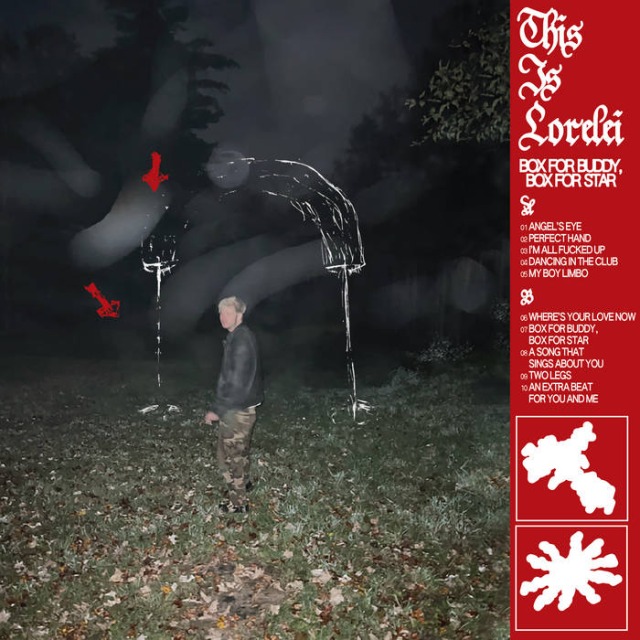 The endless exuberance and unpredictability that define Nate Amos’s style are especially prominent on his latest record, Box For Buddy, Box For Star, where he continues to hone in on his artistic versatility by dialing into a more earnest, singer-songwriter wavelength. In contrast to his earlier work, which is looser and scrappier in construction and concept, the 10-track Box For Buddy is tight and polished yet brims with the same nimble energy as the rest of his formidably abundant discography. Amos is still tinkering with different genres here—namely, mid-Aughts indie rock, folk, country and synth-pop—but he brings a much sharper focus to this material than anything else he’s done. All the pieces of the playground are still there, just a little more renovated. Amos’s straightforward approach results in a record that is both striking in its simplicity and downright seamless in its execution, allowing space for his desire to play around and be vulnerable in a way that he hasn’t before. —Sam Rosenberg [Double Double Whammy]
The endless exuberance and unpredictability that define Nate Amos’s style are especially prominent on his latest record, Box For Buddy, Box For Star, where he continues to hone in on his artistic versatility by dialing into a more earnest, singer-songwriter wavelength. In contrast to his earlier work, which is looser and scrappier in construction and concept, the 10-track Box For Buddy is tight and polished yet brims with the same nimble energy as the rest of his formidably abundant discography. Amos is still tinkering with different genres here—namely, mid-Aughts indie rock, folk, country and synth-pop—but he brings a much sharper focus to this material than anything else he’s done. All the pieces of the playground are still there, just a little more renovated. Amos’s straightforward approach results in a record that is both striking in its simplicity and downright seamless in its execution, allowing space for his desire to play around and be vulnerable in a way that he hasn’t before. —Sam Rosenberg [Double Double Whammy]
Read: “Feeling the Heart of This Is Lorelei in Spades”
24. Sharp Pins: Radio DDR
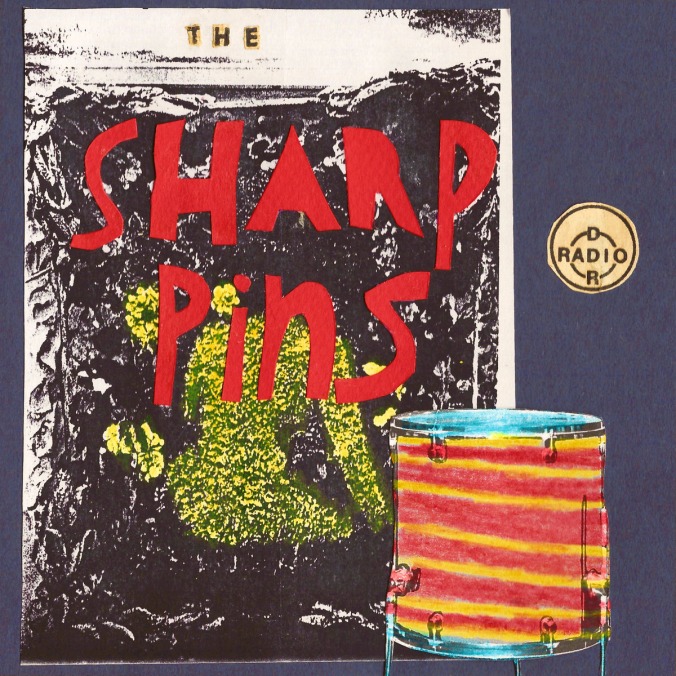 No album better conjured the vibrancy of Guided By Voices’ Alien Lanes in 2024 than Sharp Pins’ Radio DDR. Bandleader Kai Slater—who also leads a noisy Chicago art-punk band called Lifeguard and founded the Hallogallo zine—wasn’t even alive when Alien Lanes came out, but you’d never know that by hearing the metallic jangles of “If I Ever Was Lonely” pour out of a speaker. Radio DDR deserves to be played at full volume. Lifeguard, along with Horsegirl, Friko, Free Range and more, kick-started a teenage wave of very good and very important indie making waves in the Windy City and nationwide, but Slater simmers in a certain kind of rock ‘n’ roll jubilance when performing as Sharp Pins. The sugary lullaby “You Don’t Live Here Anymore” is one of the best songs of the year, while “Sycophant” is maybe Slater’s greatest homage to Elliott Smith yet. “Circle All the Dots” siphons guitar notes from the first Byrds album, while “Lorelei” and “You Have a Way” sound like jangle-pop pulled through a paper shredder. “Every Time I Hear” is a “That Thing You Do!”-worthy joint that would have done numbers at sweethearts dances 50, 60 years ago. Radio DDR is like if the Beatles recorded their early albums in a trash can, and I love every second of its lo-fi sentimentality. It’s hard not to gush over every speck of Sharp Pins’ sophomore release. They deserve the world. —Matt Mitchell [Self-Released]
No album better conjured the vibrancy of Guided By Voices’ Alien Lanes in 2024 than Sharp Pins’ Radio DDR. Bandleader Kai Slater—who also leads a noisy Chicago art-punk band called Lifeguard and founded the Hallogallo zine—wasn’t even alive when Alien Lanes came out, but you’d never know that by hearing the metallic jangles of “If I Ever Was Lonely” pour out of a speaker. Radio DDR deserves to be played at full volume. Lifeguard, along with Horsegirl, Friko, Free Range and more, kick-started a teenage wave of very good and very important indie making waves in the Windy City and nationwide, but Slater simmers in a certain kind of rock ‘n’ roll jubilance when performing as Sharp Pins. The sugary lullaby “You Don’t Live Here Anymore” is one of the best songs of the year, while “Sycophant” is maybe Slater’s greatest homage to Elliott Smith yet. “Circle All the Dots” siphons guitar notes from the first Byrds album, while “Lorelei” and “You Have a Way” sound like jangle-pop pulled through a paper shredder. “Every Time I Hear” is a “That Thing You Do!”-worthy joint that would have done numbers at sweethearts dances 50, 60 years ago. Radio DDR is like if the Beatles recorded their early albums in a trash can, and I love every second of its lo-fi sentimentality. It’s hard not to gush over every speck of Sharp Pins’ sophomore release. They deserve the world. —Matt Mitchell [Self-Released]
23. The Messthetics: The Messthetics and James Brandon Lewis
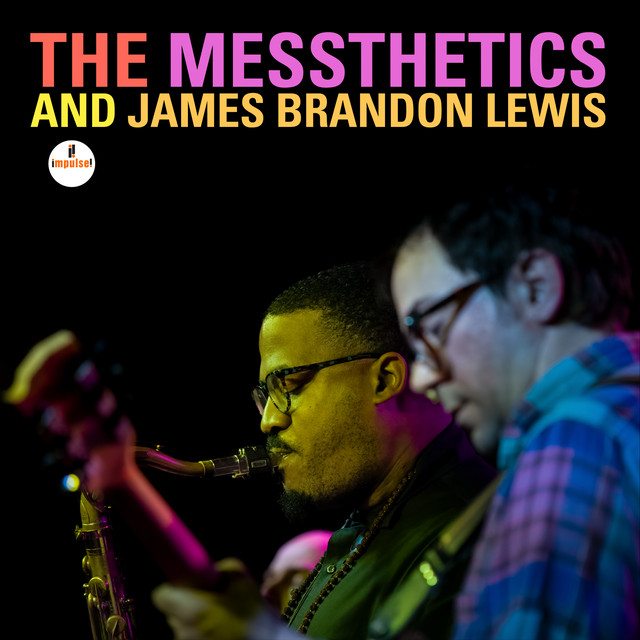 The Messthetics formed in 2018 after Fugazi’s bassist and drummer Joe Lally and Brenden Canty linked up with guitarist Anthony Pirog. As they played together, the trio noticed their musical chemistry “almost immediately.” The Messthetics’ first two albums explored the cross-section between jazz and punk. They made music that’s both dissonant and groovy, busy but focused, technically challenging but riff-ready. For their big 2024 release, the trio teamed up with saxophonist James Brandon Lewis. If this album of experimental-punk-fusion featuring a free-jazz saxophonist comes across as heady, intellectual or potentially stuffy music, don’t worry. The Messthetics and James Brandon Lewis is not that. It’s all physical, careening with intensity as much as any good rock album. Lally cranks his bass to fill up the low end, and Canty drums with relentlessness on closer “Fourth Wall.” Lewis and Pirog trade off the melody, ominously gentle like on “Boatly” or funky like “That Thang.” At the intersection of jazz and punk–between Fugazi’s rhythm section and two virtuoso musicians–you get one of 2024’s hardest-rocking records. —Andy Steiner [Impulse!]
The Messthetics formed in 2018 after Fugazi’s bassist and drummer Joe Lally and Brenden Canty linked up with guitarist Anthony Pirog. As they played together, the trio noticed their musical chemistry “almost immediately.” The Messthetics’ first two albums explored the cross-section between jazz and punk. They made music that’s both dissonant and groovy, busy but focused, technically challenging but riff-ready. For their big 2024 release, the trio teamed up with saxophonist James Brandon Lewis. If this album of experimental-punk-fusion featuring a free-jazz saxophonist comes across as heady, intellectual or potentially stuffy music, don’t worry. The Messthetics and James Brandon Lewis is not that. It’s all physical, careening with intensity as much as any good rock album. Lally cranks his bass to fill up the low end, and Canty drums with relentlessness on closer “Fourth Wall.” Lewis and Pirog trade off the melody, ominously gentle like on “Boatly” or funky like “That Thang.” At the intersection of jazz and punk–between Fugazi’s rhythm section and two virtuoso musicians–you get one of 2024’s hardest-rocking records. —Andy Steiner [Impulse!]
22. Gillian Welch & David Rawlings: Woodland
 Woodland is the first compilation of new material that Gillian Welch and David Rawlings have released in 13 years, and it’s the second album attributed to both singer-songwriters, after the Grammy-winning All the Good Times (Are Past & Gone) in 2020, though the duo have been making recorded music together since Welch uttered the “I am an orphan on God’s highway” line at the dawn of Revival 28 years ago. The songs Rawlings and Welch wrote for Woodland are so often chronicling a moment and, so often, Rawlings’s chords accentuate these stories—like daylight becoming a revelation on “Empty Trainload of Sky,” or easy-living thinning like blood on “North Country”—as notes stretch and fold back into themselves. If Welch’s words are small acts of survival, then Rawlings’s pickings are the much-needed noise carrying them toward safety. And while a lyric like “All my world is changing, I don’t know where I’m going” may sound uncertain when it welcomes “What We Had” into focus, Welch and Rawlings would never let us off that easily. Instead, it’s a very Hemingway-like perspective on a conversation, as if the duo are reflecting on their own shared and separate humanity mid-song—two 50-something-year-olds debating over whether it’s a train or a sky lingering ahead of them. What feels memorable about Woodland is that Welch and Rawlings sing through intuition, not catharsis. These tales don’t all have the endings we want them to; “When will we become ourselves?” is the line that ends “Hashtag” and it’s a rhetorical question, because there is something about resolution that feels faraway on an album like this, and sometimes that is because life itself is often not resolute. And yet, to exist is to demand an ending—to demand closure—but Woodland closes the door without ever turning the lock. —Matt Mitchell [Acony]
Woodland is the first compilation of new material that Gillian Welch and David Rawlings have released in 13 years, and it’s the second album attributed to both singer-songwriters, after the Grammy-winning All the Good Times (Are Past & Gone) in 2020, though the duo have been making recorded music together since Welch uttered the “I am an orphan on God’s highway” line at the dawn of Revival 28 years ago. The songs Rawlings and Welch wrote for Woodland are so often chronicling a moment and, so often, Rawlings’s chords accentuate these stories—like daylight becoming a revelation on “Empty Trainload of Sky,” or easy-living thinning like blood on “North Country”—as notes stretch and fold back into themselves. If Welch’s words are small acts of survival, then Rawlings’s pickings are the much-needed noise carrying them toward safety. And while a lyric like “All my world is changing, I don’t know where I’m going” may sound uncertain when it welcomes “What We Had” into focus, Welch and Rawlings would never let us off that easily. Instead, it’s a very Hemingway-like perspective on a conversation, as if the duo are reflecting on their own shared and separate humanity mid-song—two 50-something-year-olds debating over whether it’s a train or a sky lingering ahead of them. What feels memorable about Woodland is that Welch and Rawlings sing through intuition, not catharsis. These tales don’t all have the endings we want them to; “When will we become ourselves?” is the line that ends “Hashtag” and it’s a rhetorical question, because there is something about resolution that feels faraway on an album like this, and sometimes that is because life itself is often not resolute. And yet, to exist is to demand an ending—to demand closure—but Woodland closes the door without ever turning the lock. —Matt Mitchell [Acony]
Read: “Gillian Welch & David Rawlings: Just the Two of Us”
21. Ducks Ltd.: Harm’s Way
 Harm’s Way is frenetic and warm, seamless yet meticulous. Tom McGreevy and Evan Lewis wrote the album while on tour opening for bands like Nation of Language and Archers of Loaf, and the bustling, spacious instrumentation mirrors that period of travel and of new stages spent in new cities. Recalling the work Ducks Ltd. did on their 2021 LP Modern Fiction, McGreevy and Lewis are unabashedly content with recycling licks and offering no solutions to the anguish they sing about. They aren’t making nihilistic music, instead engaging with stories that tug on hope yet don’t ignore the dreariness of it all. And it can be easy to overlook that push-and-pull, given that Harm’s Way lingers in its own jitteriness and wants you to feel first, think next. It’s what makes songs like The Smiths’s “This Charming Man” or Orange Juice’s “Rip It Up” timeless, this propulsive, aching urge to play fast, sing about being bruised and, most of all, juxtapose thrashing, explosive tempos with tender, sugary octaves. Harm’s Way is an album about cyclicality written during a cyclical tour spent nursing cross-country exhaustion. Ducks Ltd.’s approach to heaviness sticks out like a sore thumb, as if they intentionally want you to remember that, at its jangly, syrupy core, Harm’s Way is a sad album with no conclusion other than it’s dark outside all the time. They’ve earned this record and these tracks, and their attention to repurposing riffs runs deeper than McGreevy’s vocals or Lewis’s shredding: When you strip away all of the language and percussion and catchiness of Harm’s Way, the sorrow we’re left with sounds the same. —Matt Mitchell [Carpark]
Harm’s Way is frenetic and warm, seamless yet meticulous. Tom McGreevy and Evan Lewis wrote the album while on tour opening for bands like Nation of Language and Archers of Loaf, and the bustling, spacious instrumentation mirrors that period of travel and of new stages spent in new cities. Recalling the work Ducks Ltd. did on their 2021 LP Modern Fiction, McGreevy and Lewis are unabashedly content with recycling licks and offering no solutions to the anguish they sing about. They aren’t making nihilistic music, instead engaging with stories that tug on hope yet don’t ignore the dreariness of it all. And it can be easy to overlook that push-and-pull, given that Harm’s Way lingers in its own jitteriness and wants you to feel first, think next. It’s what makes songs like The Smiths’s “This Charming Man” or Orange Juice’s “Rip It Up” timeless, this propulsive, aching urge to play fast, sing about being bruised and, most of all, juxtapose thrashing, explosive tempos with tender, sugary octaves. Harm’s Way is an album about cyclicality written during a cyclical tour spent nursing cross-country exhaustion. Ducks Ltd.’s approach to heaviness sticks out like a sore thumb, as if they intentionally want you to remember that, at its jangly, syrupy core, Harm’s Way is a sad album with no conclusion other than it’s dark outside all the time. They’ve earned this record and these tracks, and their attention to repurposing riffs runs deeper than McGreevy’s vocals or Lewis’s shredding: When you strip away all of the language and percussion and catchiness of Harm’s Way, the sorrow we’re left with sounds the same. —Matt Mitchell [Carpark]
Read: “Hitting the Lanes With Ducks Ltd.”
20. Cassandra Jenkins: My Light, My Destroyer
 My Light, My Destroyer is everything a third Cassandra Jenkins album should be: Across 13 pieces of music, dialogue and field recordings, Jenkins invites us closer to home and takes us further away. We’re in the flower shop where she works, then in Illinois, then Phoenix, then at her local pet store, then with her on an airplane, then on a balcony with her mother Sandra, marveling at an asteroid. On a macro level, space is to My Light, My Destroyer what the ocean, and nature more broadly, was to An Overview on Phenomenal Nature: the gateway to inspiration and perspective. During “Aurora, IL,” Jenkins finds herself secluded in a hotel a thousand miles from home, staving off boredom by “circling the parking lot just to see blue sky / I watch planes fly / Over the city / Caught in space, time / Nowhere to be.” A take on the Gram Parsons school of ‘70s country rock, the arrangement is blissfully lackadaisical; her Stratocaster plods lazily through crisp major chords in keeping with that “nowhere to be” vibe. Eventually, the song blasts off with a rush of guitars that tear through the balmy afternoon. The stunning “Delphinium Blue” is centered on the meditative mundanities of Jenkins’s part-time florist job, recounted in a way that fills them with as much purpose and consequence as the things visible through Sandra’s telescope. Either way, you need your eyes level. “Chin up, stay on task, wash the windows, count the cash.” —Hayden Merrick [Dead Oceans]
My Light, My Destroyer is everything a third Cassandra Jenkins album should be: Across 13 pieces of music, dialogue and field recordings, Jenkins invites us closer to home and takes us further away. We’re in the flower shop where she works, then in Illinois, then Phoenix, then at her local pet store, then with her on an airplane, then on a balcony with her mother Sandra, marveling at an asteroid. On a macro level, space is to My Light, My Destroyer what the ocean, and nature more broadly, was to An Overview on Phenomenal Nature: the gateway to inspiration and perspective. During “Aurora, IL,” Jenkins finds herself secluded in a hotel a thousand miles from home, staving off boredom by “circling the parking lot just to see blue sky / I watch planes fly / Over the city / Caught in space, time / Nowhere to be.” A take on the Gram Parsons school of ‘70s country rock, the arrangement is blissfully lackadaisical; her Stratocaster plods lazily through crisp major chords in keeping with that “nowhere to be” vibe. Eventually, the song blasts off with a rush of guitars that tear through the balmy afternoon. The stunning “Delphinium Blue” is centered on the meditative mundanities of Jenkins’s part-time florist job, recounted in a way that fills them with as much purpose and consequence as the things visible through Sandra’s telescope. Either way, you need your eyes level. “Chin up, stay on task, wash the windows, count the cash.” —Hayden Merrick [Dead Oceans]
Read: “Where Cassandra Jenkins Went Once the Laughter Stopped”
19. Kendrick Lamar: GNX
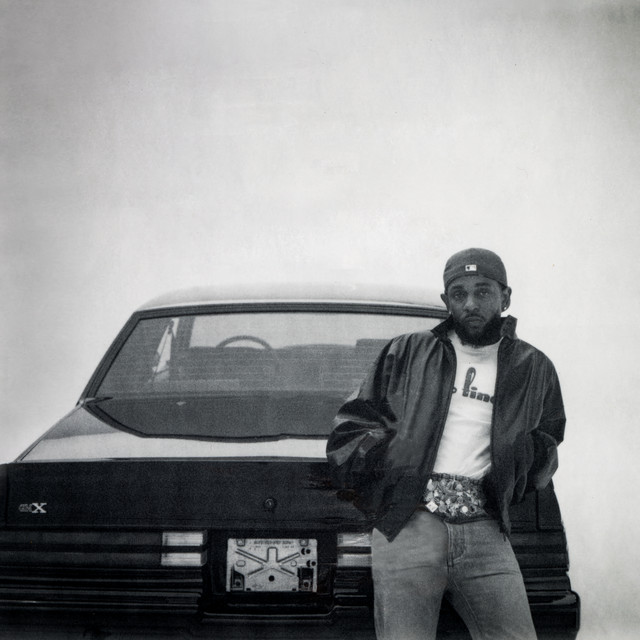 The peace and love Kendrick Lamar yearns for on GNX is mixed with “fuck you” platitudes and skyscraper-sized middle fingers. That affection, the first brick gets laid down at home. The Pirus and Crips come together on a California stage and shout “Not Like Us” together—who gives a damn about the rest of the world? This an album begging for rap’s glory days to be resurrected, a love letter to Southern California disguised as a #1 record. On “wacced out murals,” Kendrick laments the destruction of a mural of him in Compton; K.Dot only raps the hook on “gnx,” letting Los Angeles’ future (Hitta J3, Peysoh, YoungThreat) take the wheel; he name-drops Kobe Bryant’s 81-point game on “peekaboo”; “dodger blue” is a major cypher of SoCal, measuring gang rivalries like “Dreamers and the Jets” and calling bullshit on posturing locals who don’t drive on the 10: “Don’t say you hate L.A., but live in L.A. and pretend / “My neck on Tarantino, Alejandro, Spike Lee / Just know you took the scenic route if you stand by me, stupid.” Kendrick summons G-funk, mariachi and hyphy music all on one album; as Joseph Campbell once wrote: “The labyrinth is thoroughly known.” GNX is a fascinating listen that’s as flawed as any of Kendrick’s previous albums. He converses with the divine, walks the margins that separate good and evil, takes a dive but hits on the cash-out, puts his next-up disciples under the light and calls upon pop music’s most in-demand producer to make his West Coast domination legible. Coastal beefs, yesteryear-beckoning factions, victory laps coalesced with brotherhood, a vow to “live one in harmony now”—GNX contends that it’s time to fill rap music with the politicking of old, where powerful people coalesce selfishness with gain for the greater good and artists take their time with their art. —Matt Mitchell [pgLang/Interscope]
The peace and love Kendrick Lamar yearns for on GNX is mixed with “fuck you” platitudes and skyscraper-sized middle fingers. That affection, the first brick gets laid down at home. The Pirus and Crips come together on a California stage and shout “Not Like Us” together—who gives a damn about the rest of the world? This an album begging for rap’s glory days to be resurrected, a love letter to Southern California disguised as a #1 record. On “wacced out murals,” Kendrick laments the destruction of a mural of him in Compton; K.Dot only raps the hook on “gnx,” letting Los Angeles’ future (Hitta J3, Peysoh, YoungThreat) take the wheel; he name-drops Kobe Bryant’s 81-point game on “peekaboo”; “dodger blue” is a major cypher of SoCal, measuring gang rivalries like “Dreamers and the Jets” and calling bullshit on posturing locals who don’t drive on the 10: “Don’t say you hate L.A., but live in L.A. and pretend / “My neck on Tarantino, Alejandro, Spike Lee / Just know you took the scenic route if you stand by me, stupid.” Kendrick summons G-funk, mariachi and hyphy music all on one album; as Joseph Campbell once wrote: “The labyrinth is thoroughly known.” GNX is a fascinating listen that’s as flawed as any of Kendrick’s previous albums. He converses with the divine, walks the margins that separate good and evil, takes a dive but hits on the cash-out, puts his next-up disciples under the light and calls upon pop music’s most in-demand producer to make his West Coast domination legible. Coastal beefs, yesteryear-beckoning factions, victory laps coalesced with brotherhood, a vow to “live one in harmony now”—GNX contends that it’s time to fill rap music with the politicking of old, where powerful people coalesce selfishness with gain for the greater good and artists take their time with their art. —Matt Mitchell [pgLang/Interscope]
18. Jack White: No Name
 The beauty of No Name is that it’s stuck at an 11 from the first licks of “Old Scratch Blues” to the final quakes of “Terminal Archenemy Endling.” Jack White goes heavy on the hard stuff just as often as he scales back into melancholia. The darkness is physical but not without grace. “What’s the Rumpus?” is a no-fuss, anthemic ballast that tumbles into disarray. “It’s not out of context, our love is not a contest,” White declares. “I’ve got a feeling that the truth’s become opinion these days. That train has left the station, but our love will grow.” In an election year, White’s commitment to hope—told through wall-to-wall images of a dystopian present—feels especially punctuated on No Name. The album rarely simmers and is full of juxtapositions. For every mystical turn the songs take, White drops a guitar lick that’ll shuck the skin clean off your bones. Even when No Name gets into a groove on “Bombing Out,” “Tonight (Was A Long Time Ago)” and “Underground,” the impetus never lets up: White wants to tear every wall down, and he wants you to feel every nail yanked out of the woodwork. It’s powerful stuff, especially when he sounds like a frontman again. Perhaps that was why Fear of the Dawn and Entering Heaven Alive careened into underwhelming territory, because those records sound like they were made by a producer who sometimes also played guitar. The playing here is terrific and as good as, if not better than, anything on De Stijl, Elephant and Icky Thump; the writing is locked in and the production sounds as consistent as anything he’s ever manned. Throughout the 43 minute-runtime of No Name, Jack White sounds like everything you need him to be. —Matt Mitchell [Third Man Records]
The beauty of No Name is that it’s stuck at an 11 from the first licks of “Old Scratch Blues” to the final quakes of “Terminal Archenemy Endling.” Jack White goes heavy on the hard stuff just as often as he scales back into melancholia. The darkness is physical but not without grace. “What’s the Rumpus?” is a no-fuss, anthemic ballast that tumbles into disarray. “It’s not out of context, our love is not a contest,” White declares. “I’ve got a feeling that the truth’s become opinion these days. That train has left the station, but our love will grow.” In an election year, White’s commitment to hope—told through wall-to-wall images of a dystopian present—feels especially punctuated on No Name. The album rarely simmers and is full of juxtapositions. For every mystical turn the songs take, White drops a guitar lick that’ll shuck the skin clean off your bones. Even when No Name gets into a groove on “Bombing Out,” “Tonight (Was A Long Time Ago)” and “Underground,” the impetus never lets up: White wants to tear every wall down, and he wants you to feel every nail yanked out of the woodwork. It’s powerful stuff, especially when he sounds like a frontman again. Perhaps that was why Fear of the Dawn and Entering Heaven Alive careened into underwhelming territory, because those records sound like they were made by a producer who sometimes also played guitar. The playing here is terrific and as good as, if not better than, anything on De Stijl, Elephant and Icky Thump; the writing is locked in and the production sounds as consistent as anything he’s ever manned. Throughout the 43 minute-runtime of No Name, Jack White sounds like everything you need him to be. —Matt Mitchell [Third Man Records]
17. Mabe Fratti: Sentir Que No Sabes
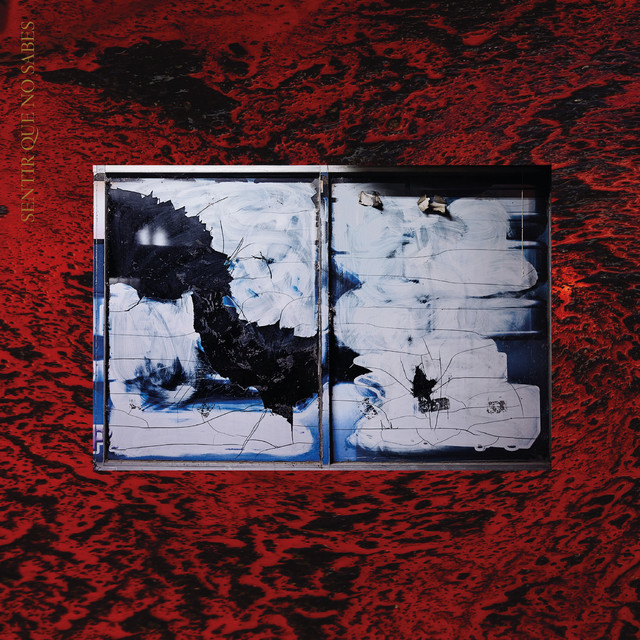 For Guatemala-born, Mexico City-based experimental musician Mabe Fratti, sound is a matter of subtraction—letting minimalist arrangements and honey-sweet vocals supplement the harsh, percussive cut of her cello. Yet, the songs on Sentir Que No Sabes (which translates to To Feel Like You Don’t Know) feel fully-realized, leaning further into the world of pop than any of Fratti’s prior releases with thundering beats and bright choirs of voices lining the interior of her multifaceted songs. In the pull between the esoteric and the straightforward pop world, Fratti strikes a stirring balance, positioning her as one of the most exciting artists currently working. There’s not a single moment on Sentir that doesn’t feel both beautiful and violently alive, a feat worth celebrating. —Elise Soutar [Unheard of Hope]
For Guatemala-born, Mexico City-based experimental musician Mabe Fratti, sound is a matter of subtraction—letting minimalist arrangements and honey-sweet vocals supplement the harsh, percussive cut of her cello. Yet, the songs on Sentir Que No Sabes (which translates to To Feel Like You Don’t Know) feel fully-realized, leaning further into the world of pop than any of Fratti’s prior releases with thundering beats and bright choirs of voices lining the interior of her multifaceted songs. In the pull between the esoteric and the straightforward pop world, Fratti strikes a stirring balance, positioning her as one of the most exciting artists currently working. There’s not a single moment on Sentir that doesn’t feel both beautiful and violently alive, a feat worth celebrating. —Elise Soutar [Unheard of Hope]
16. Adrianne Lenker: Bright Future
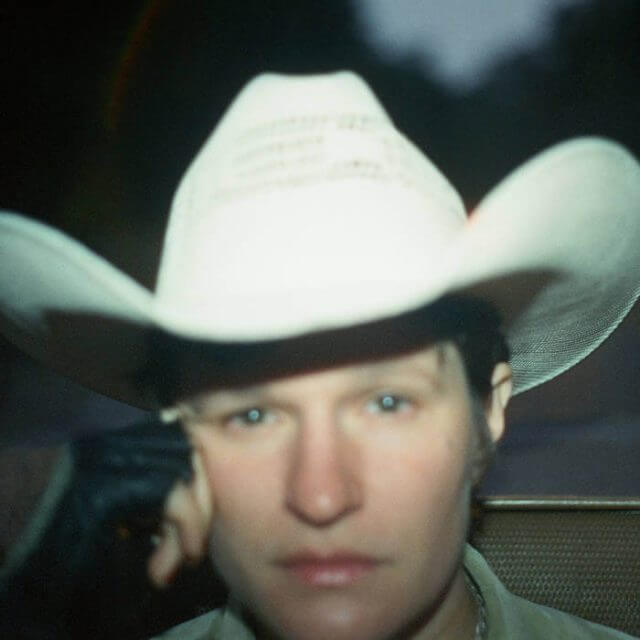 The varying strength of relationships in Adrianne Lenker’s life thread many of Bright Future’s dozen songs together. On the breezy “Fool,” she imagines all sorts of lives she might live with someone else—“we could be friends, you could love me through and through.” She also makes a laundry list of what the people in her circle are up to, as if she plays the role of a mutual friend catching you up to speed with a warm temperament. You don’t have to know who Tommy is, but he had twins, and in that moment, you can just share the joy Lenker gives off as she tells you that. “Fool” is followed quickly by “No Machine,” a song most noticeable for how distinct her delivery of “I don’t know what I’d do without you” is. Lenker’s voice becomes decidedly sweeter, but it also carries the weight of someone about to burst into tears. The bond she shares with whoever she’s written the song about feels fundamental to her life, but not so specific that you can’t find parallels in your own—which is the undeniable, always-present treasure of her work in the first place. Bright Future is an album that, while often hushed in tone, is deeply emotionally complex—thanks to Lenker’s songwriting style. Her music is deeply human, often placing great focus on humanity itself. She’s able to imbue even our most mundane feelings and experiences with a renewed allure just by taking them seriously. Her masterpiece, it asks us through a demonstration of grace to lean on each other and extend versions of our own. Sometimes, it feels like she’s creating these beautiful, lived-in worlds that exist only while the song is playing. The beautiful truth of it, though, is that the only magical world Adrianne Lenker writes about is the one we all live in together. —Eric Bennett [4AD]
The varying strength of relationships in Adrianne Lenker’s life thread many of Bright Future’s dozen songs together. On the breezy “Fool,” she imagines all sorts of lives she might live with someone else—“we could be friends, you could love me through and through.” She also makes a laundry list of what the people in her circle are up to, as if she plays the role of a mutual friend catching you up to speed with a warm temperament. You don’t have to know who Tommy is, but he had twins, and in that moment, you can just share the joy Lenker gives off as she tells you that. “Fool” is followed quickly by “No Machine,” a song most noticeable for how distinct her delivery of “I don’t know what I’d do without you” is. Lenker’s voice becomes decidedly sweeter, but it also carries the weight of someone about to burst into tears. The bond she shares with whoever she’s written the song about feels fundamental to her life, but not so specific that you can’t find parallels in your own—which is the undeniable, always-present treasure of her work in the first place. Bright Future is an album that, while often hushed in tone, is deeply emotionally complex—thanks to Lenker’s songwriting style. Her music is deeply human, often placing great focus on humanity itself. She’s able to imbue even our most mundane feelings and experiences with a renewed allure just by taking them seriously. Her masterpiece, it asks us through a demonstration of grace to lean on each other and extend versions of our own. Sometimes, it feels like she’s creating these beautiful, lived-in worlds that exist only while the song is playing. The beautiful truth of it, though, is that the only magical world Adrianne Lenker writes about is the one we all live in together. —Eric Bennett [4AD]
Read: “Adrianne Lenker Gets Closer”
15. Beth Gibbons: Lives Outgrown
 If you arrive at Lives Outgrown looking for something that sounds like Portishead, you might find your thirst briefly satiated by “Floating on a Moment”—but it’s only a slight parallel. The song is melancholic yet enchanting, as Beth Gibbons finds herself trapped in a purgatory of middle-age—the prosperous hope of the future suddenly feels dimmer, and retrospect snaps itself back into place with a much less graceful ferocity. Lives Outgrown achieves a wondrous feat of relatability—even if what inspired these songs are not universal feelings. Gibbons’s splendor is her innate ability to make our own experiences feel denser and louder. When she sings about the timing never being right “when you’re losing a soul” on “Burden of Life,” anyone who has confronted the monstrous clamors of grief may feel it deeply. Gibbons likens her response to lostness to pebbles holding court on a shoreside, to understanding why generations dwindle. “I used to feel the feelings,” she admits, over the strums of her own acoustic guitar and Lee Harris’s percussive thrums. “Love that I once said I’d never rile.” Gibbons’s first solo record is embroidered with raw, cherished instrumentation that duets with open spaces. It is sometimes beautiful, sometimes jagged and worrisome. —Matt Mitchell [Domino]
If you arrive at Lives Outgrown looking for something that sounds like Portishead, you might find your thirst briefly satiated by “Floating on a Moment”—but it’s only a slight parallel. The song is melancholic yet enchanting, as Beth Gibbons finds herself trapped in a purgatory of middle-age—the prosperous hope of the future suddenly feels dimmer, and retrospect snaps itself back into place with a much less graceful ferocity. Lives Outgrown achieves a wondrous feat of relatability—even if what inspired these songs are not universal feelings. Gibbons’s splendor is her innate ability to make our own experiences feel denser and louder. When she sings about the timing never being right “when you’re losing a soul” on “Burden of Life,” anyone who has confronted the monstrous clamors of grief may feel it deeply. Gibbons likens her response to lostness to pebbles holding court on a shoreside, to understanding why generations dwindle. “I used to feel the feelings,” she admits, over the strums of her own acoustic guitar and Lee Harris’s percussive thrums. “Love that I once said I’d never rile.” Gibbons’s first solo record is embroidered with raw, cherished instrumentation that duets with open spaces. It is sometimes beautiful, sometimes jagged and worrisome. —Matt Mitchell [Domino]
14. Tyler, the Creator: CHROMAKOPIA
 Tyler, the Creator’s story inside of those sepia-toned cardboard walls of CHROMAKOPIA bursts with color and, miraculously, shows us more of him than all of his previous albums combined. And yet, Tyler’s seventh album still ends without resolution, only contradiction, shit-talking and gang politics lost to middle class autoclaves. He’s strapped with grandeur and growth to the gills. Age is catching up with him, but he’s not slowing down anytime soon. The mask stays on—good luck locking down just who Tyler Okonma is. The guest list on CHROMAKOPIA is extensive and impressive. Along with Caesar featuring on two tracks and Teezo filling out the shape of “Darling, I,” “Sticky” is an “Oldie”-style cypher featuring verses from Sexyy Red, Lil Wayne and GloRilla. Childish Gambino, fresh off his “final” album Bando Stone & the New World, appears on “I Killed You” and, potentially, “Judge Judy.” Schoolboy Q and Santigold hop on the mike on “Thought I Was Dead,” while Doechii carries on “Balloon” (“I air this bitch out like a queef / I’ll send your ass back to the streets”). No two songs on this record sound alike, offering a kind of sonic whiplash that’ll surely be revered by some and bemoaned by others. There is no musical throughline present; consistency is a matter of singular, track-by-track excellence folded into a collection of oneness. Tyler won a Best Rap Album Grammy for CALL ME IF YOU GET LOST and the cord between it and his heart is still too short. So, he’s turned toward celebrity culture, parasociality, fatherhood (both absent and impending), desire, excess and monogamy. With industry praise comes irreversible loneliness; distance turns into a requisite. When schedules get claustrophobic, grief grows thicker. Tyler, the Creator has a lot to get off his chest, but he’ll probably still keep all of his cars in the meantime. It’s taken him 33 years to figure this much out, that fame has a caveat: with finesse comes sacrifice. You might as well make your suffering look good. —Matt Mitchell [Columbia]
Tyler, the Creator’s story inside of those sepia-toned cardboard walls of CHROMAKOPIA bursts with color and, miraculously, shows us more of him than all of his previous albums combined. And yet, Tyler’s seventh album still ends without resolution, only contradiction, shit-talking and gang politics lost to middle class autoclaves. He’s strapped with grandeur and growth to the gills. Age is catching up with him, but he’s not slowing down anytime soon. The mask stays on—good luck locking down just who Tyler Okonma is. The guest list on CHROMAKOPIA is extensive and impressive. Along with Caesar featuring on two tracks and Teezo filling out the shape of “Darling, I,” “Sticky” is an “Oldie”-style cypher featuring verses from Sexyy Red, Lil Wayne and GloRilla. Childish Gambino, fresh off his “final” album Bando Stone & the New World, appears on “I Killed You” and, potentially, “Judge Judy.” Schoolboy Q and Santigold hop on the mike on “Thought I Was Dead,” while Doechii carries on “Balloon” (“I air this bitch out like a queef / I’ll send your ass back to the streets”). No two songs on this record sound alike, offering a kind of sonic whiplash that’ll surely be revered by some and bemoaned by others. There is no musical throughline present; consistency is a matter of singular, track-by-track excellence folded into a collection of oneness. Tyler won a Best Rap Album Grammy for CALL ME IF YOU GET LOST and the cord between it and his heart is still too short. So, he’s turned toward celebrity culture, parasociality, fatherhood (both absent and impending), desire, excess and monogamy. With industry praise comes irreversible loneliness; distance turns into a requisite. When schedules get claustrophobic, grief grows thicker. Tyler, the Creator has a lot to get off his chest, but he’ll probably still keep all of his cars in the meantime. It’s taken him 33 years to figure this much out, that fame has a caveat: with finesse comes sacrifice. You might as well make your suffering look good. —Matt Mitchell [Columbia]
13. Fontaines D.C.: Romance
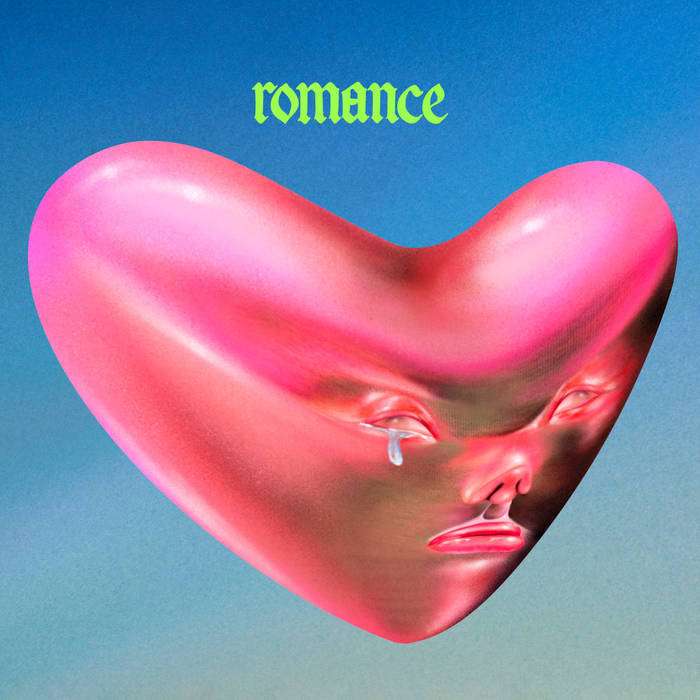 Fontaines D.C. aren’t concerned with making their image fit into someone else’s vision. They employ a Rolodex of citations on Romance—like the Cure, Deftones, Pixies, amorphous grunge collages and a smorgasbord of ‘90s alt-pop bands that faded into obscurity just as soon as they detonated—but never sound like anything other than themselves. You can hear that truth from the first note of Romance, as the title track begins with an arresting, menacing slow-burn of plucky, crucified singing from Chatten, who bellows “I will be beside you ‘til you’re dead” with a lick of delicacy that becomes enraptured in a tempest blow-out of shivering, droning distortion. It’s an announcement and a battlecry: “Maybe romance is the place for me and you, and you, and you,” Chatten confides, as his bandmates swirl into each other and puncture the tempo with a cinematic climax that is as bombastically poisonous as it is, under its bruising skin, reflective and hopeful. On Romance, defying expectations becomes fashionable for Fontaines D.C. Love the band or hate them, these 11 tracks never simmer in the aesthetic tropes they wore well on A Hero’s Death or Skinty Fia. The guitars are far more lush, and even the most onerous, deafening comedowns of distortion sound poppier and histrionic than what we’re used to hearing from Chatten, O’Connell, Curley, Coll and Deegan. The stories are tragic and the days within them are numbered, but Romance is an essay of mosh-pit guitars careening into baggy desires and stringed visions of mercy. This album’s violence stretches itself around the cinema of living. One of the last lines Chatten sings on it is “each new day, I get another year older.” Like yesterday and tomorrow, Romance is a bloody mess. I adore every second of it. —Matt Mitchell [XL]
Fontaines D.C. aren’t concerned with making their image fit into someone else’s vision. They employ a Rolodex of citations on Romance—like the Cure, Deftones, Pixies, amorphous grunge collages and a smorgasbord of ‘90s alt-pop bands that faded into obscurity just as soon as they detonated—but never sound like anything other than themselves. You can hear that truth from the first note of Romance, as the title track begins with an arresting, menacing slow-burn of plucky, crucified singing from Chatten, who bellows “I will be beside you ‘til you’re dead” with a lick of delicacy that becomes enraptured in a tempest blow-out of shivering, droning distortion. It’s an announcement and a battlecry: “Maybe romance is the place for me and you, and you, and you,” Chatten confides, as his bandmates swirl into each other and puncture the tempo with a cinematic climax that is as bombastically poisonous as it is, under its bruising skin, reflective and hopeful. On Romance, defying expectations becomes fashionable for Fontaines D.C. Love the band or hate them, these 11 tracks never simmer in the aesthetic tropes they wore well on A Hero’s Death or Skinty Fia. The guitars are far more lush, and even the most onerous, deafening comedowns of distortion sound poppier and histrionic than what we’re used to hearing from Chatten, O’Connell, Curley, Coll and Deegan. The stories are tragic and the days within them are numbered, but Romance is an essay of mosh-pit guitars careening into baggy desires and stringed visions of mercy. This album’s violence stretches itself around the cinema of living. One of the last lines Chatten sings on it is “each new day, I get another year older.” Like yesterday and tomorrow, Romance is a bloody mess. I adore every second of it. —Matt Mitchell [XL]
Read: “Fontaines D.C. Learn, Rise and Return”
12. Hurray for the Riff Raff: The Past Is Still Alive
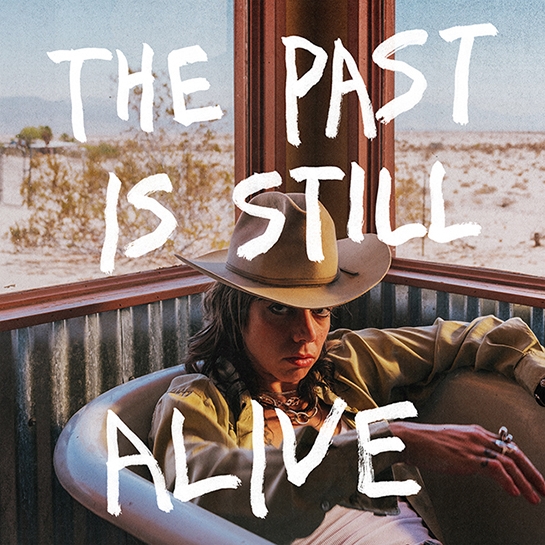 The Past Is Still Alive returns to the folk sounds of Hurray for the Riff Raff’s earliest work, with an electric rock current and a focus on solidarity among the oppressed—as well as a community around Alynda Segarra that includes Meg Duffy, Anjimile, SG Goodman, Phil and Brad Cook and Conor Oberst. In a 2015 op-ed for The Bluegrass Situation, Segarra described folk as “music that lifts the human spirit out of the terror and anguish of oppression,” and there is definitely something subversive about this music—as well as the album’s cover, which depicts Segarra reclining in a dry desert bathtub in cowboy clothes, eyeing the camera head-on. The album opens with “Alibi,” rooted in love and defiance and addressed to an addict. Segarra has often explored the complicated rites of loving, particularly loving those on the edge, and on “Alibi” they pair this with a reminder of the need to take care of yourself. Kind but firm, it seems a direct response to the casual drug use and self-destruction of The Navigator’s “Living in the City”: “You don’t have to die if you don’t want to die.” The Navigator painted addiction as a kind of symbol, a symptom of city suffocation that its leading character Navita had to escape. A few years out and stripped of the veneer of a concept album, The Past Is Still Alive confronts it directly, and focuses on finding an answer. This is a theme that runs through The Past Is Still Alive—feeling doomed, but finding the will to keep going anyway. Segarra has confessed to fearing their lived experiences were too much for the music industry, too real to take center stage in their work, but on this album, they buck those fears with radical honesty. “Snake Plant (The Past Is Still Alive)” charts memories of shoplifting for food and childhood beach vacations, the healing powers of Florida water and Narcan; “Buffalo” compares a new relationship to extinct and endangered species, a pairing of personal and environmental turmoil that still holds fast to optimism. This is the sound of making a home in a wasteland. “I’ll jump off this cliff with you, if it means we will survive,” Segarra promises, ready to endure the impossible for the sake of a better future. What’s particularly striking is the lightness Segarra delivers these desperate lines with. In their hands, the trauma of the present day is a prelude to the possibilities of a better tomorrow. —Annie Parnell [Nonesuch]
The Past Is Still Alive returns to the folk sounds of Hurray for the Riff Raff’s earliest work, with an electric rock current and a focus on solidarity among the oppressed—as well as a community around Alynda Segarra that includes Meg Duffy, Anjimile, SG Goodman, Phil and Brad Cook and Conor Oberst. In a 2015 op-ed for The Bluegrass Situation, Segarra described folk as “music that lifts the human spirit out of the terror and anguish of oppression,” and there is definitely something subversive about this music—as well as the album’s cover, which depicts Segarra reclining in a dry desert bathtub in cowboy clothes, eyeing the camera head-on. The album opens with “Alibi,” rooted in love and defiance and addressed to an addict. Segarra has often explored the complicated rites of loving, particularly loving those on the edge, and on “Alibi” they pair this with a reminder of the need to take care of yourself. Kind but firm, it seems a direct response to the casual drug use and self-destruction of The Navigator’s “Living in the City”: “You don’t have to die if you don’t want to die.” The Navigator painted addiction as a kind of symbol, a symptom of city suffocation that its leading character Navita had to escape. A few years out and stripped of the veneer of a concept album, The Past Is Still Alive confronts it directly, and focuses on finding an answer. This is a theme that runs through The Past Is Still Alive—feeling doomed, but finding the will to keep going anyway. Segarra has confessed to fearing their lived experiences were too much for the music industry, too real to take center stage in their work, but on this album, they buck those fears with radical honesty. “Snake Plant (The Past Is Still Alive)” charts memories of shoplifting for food and childhood beach vacations, the healing powers of Florida water and Narcan; “Buffalo” compares a new relationship to extinct and endangered species, a pairing of personal and environmental turmoil that still holds fast to optimism. This is the sound of making a home in a wasteland. “I’ll jump off this cliff with you, if it means we will survive,” Segarra promises, ready to endure the impossible for the sake of a better future. What’s particularly striking is the lightness Segarra delivers these desperate lines with. In their hands, the trauma of the present day is a prelude to the possibilities of a better tomorrow. —Annie Parnell [Nonesuch]
Read: “Hurray for the Riff Raff’s American Pastoral of Radicalized Memory”
11. The Cure: Songs of a Lost World
 To directly compare the new record, Songs of a Lost World, to another Cure album—just as a barometer of quality compared to more familiar corners of the back catalog—is to misunderstand its purpose in the band’s canon. If Robert Smith, on the brink of turning 30, made his masterpiece lined with hope’s starlit glimmer on Disintegration and howled to emerge from the drug-fueled, claustrophobic paranoia of Pornography in his early twenties, Songs of a Lost World is tired of flailing, having no time for ripping at the seams of his life’s work to look for further meaning. The shaky hand that scribbled the line “It doesn’t matter if we all die” belongs to an artist who now knows there’s never been a statement further from the truth, re-reading Ernest Dowson’s poem “Dregs” until his eyes go weak and begging loved ones to fight for his place in their life while they still can. Confronted with the deaths of multiple family members and a world crashing around him, Robert Smith can’t simply “return to form.” He’s metamorphosed into a new form that suits both our larger societal moment and his own meditations on existence. He and the band have made a better album as a result. There are two elements which make up the quintessential Cure recording, both of which are present here. The first is expressive, sweeping instrumentals—which Perry Bamonte, Jason Cooper and Reeves Gabrels, Simon Gallup and Roger O’Donnell craft and deliver with aplomb on opener “Alone.”
To directly compare the new record, Songs of a Lost World, to another Cure album—just as a barometer of quality compared to more familiar corners of the back catalog—is to misunderstand its purpose in the band’s canon. If Robert Smith, on the brink of turning 30, made his masterpiece lined with hope’s starlit glimmer on Disintegration and howled to emerge from the drug-fueled, claustrophobic paranoia of Pornography in his early twenties, Songs of a Lost World is tired of flailing, having no time for ripping at the seams of his life’s work to look for further meaning. The shaky hand that scribbled the line “It doesn’t matter if we all die” belongs to an artist who now knows there’s never been a statement further from the truth, re-reading Ernest Dowson’s poem “Dregs” until his eyes go weak and begging loved ones to fight for his place in their life while they still can. Confronted with the deaths of multiple family members and a world crashing around him, Robert Smith can’t simply “return to form.” He’s metamorphosed into a new form that suits both our larger societal moment and his own meditations on existence. He and the band have made a better album as a result. There are two elements which make up the quintessential Cure recording, both of which are present here. The first is expressive, sweeping instrumentals—which Perry Bamonte, Jason Cooper and Reeves Gabrels, Simon Gallup and Roger O’Donnell craft and deliver with aplomb on opener “Alone.”
There are moments of restraint to underpin orchestral passages, but these opulent soundscapes continue to be so central to the band’s sound, say, post-1985 because they do so much of the heavy lifting atmospherically. There’s a reason so many Cure songs withstand the weight of these sprawling introductions they’re so fond of, why our diminished attention spans still don’t seem to feel the time pass when we’re locked into the emotive swirl of sound. If you believe Smith’s claim that the band will cease to exist after its 50th anniversary, giving the Cure about four years’ time to release however much more material they supposedly have ready to go, Songs of a Lost World will be an album we’ll have to re-contextualize a few times over. Then again, Robert Smith has famously threatened to blow the band up whenever he wraps up a Cure project, so we may all be prepping for the next few years of goodbyes in vain. Yet, there will never be a time when a song centering his voice won’t be welcome—all worth it for an avalanche of guitars clearing the aisles for that voice to sing, “Promise you’ll be with me in the end.” The words may not be comforting, but with our hands on Songs of a Lost World after so much time away, you’ve never been more glad it’s him saying them. —Elise Soutar [Polydor]
10. Nala Sinephro: Endlessness
 On day three of what I didn’t know at the time would be the very last Pitchfork Music Festival (RIP), I lucked into an early afternoon Blue Stage set from an artist I was, admittedly, unfamiliar with. Stumbling unplanned into a quietly electrifying swell of instrumental ambient jazz in this shrouded corner of Union Park might as well have been finding a crash-landed spaceship from some utopian planet. It’s not an overstatement to say that Nala Sinephro’s ethereal stylings sound otherworldly, at times so enchanting that they feel like an intergalactic transmission that I wasn’t supposed to hear. I think often of the images and sounds contained on the Voyager Golden Record, launched into space in 1977 for unknown extraterrestrial lifeforms to find—or not, there’s really no way of knowing. Endlessness would be at home on a future updated iteration of the Golden Record, but at times also sounds like an approximation of a response to it. It’s tangled up in the cosmos, untethered and uncertain, a constellation of sounds to and from oblivion. —Grace Robins-Somerville [Warp]
On day three of what I didn’t know at the time would be the very last Pitchfork Music Festival (RIP), I lucked into an early afternoon Blue Stage set from an artist I was, admittedly, unfamiliar with. Stumbling unplanned into a quietly electrifying swell of instrumental ambient jazz in this shrouded corner of Union Park might as well have been finding a crash-landed spaceship from some utopian planet. It’s not an overstatement to say that Nala Sinephro’s ethereal stylings sound otherworldly, at times so enchanting that they feel like an intergalactic transmission that I wasn’t supposed to hear. I think often of the images and sounds contained on the Voyager Golden Record, launched into space in 1977 for unknown extraterrestrial lifeforms to find—or not, there’s really no way of knowing. Endlessness would be at home on a future updated iteration of the Golden Record, but at times also sounds like an approximation of a response to it. It’s tangled up in the cosmos, untethered and uncertain, a constellation of sounds to and from oblivion. —Grace Robins-Somerville [Warp]
9. Wild Pink: Dulling the Horns
 There’s a moment on “Cloud or Mountain,” a cut from Dulling the Horns, Wild Pink’s masterpiece fifth album, where the guitars fake you out. After a few seconds of jangling and the band’s typical warmth, they come hailing down like a roof collapsing over your head. The shredding is euphoric, even as John Ross sings of illness, federal investigations and cult leaders getting their way. Dialed up to an 11 and leagues more efficient, Dulling the Horns is a record that blazes past you even in its more meditative moments. Written in the wake of a whirlwind few years for John Ross, his exhaustion is palpable. Amid guitars that flit from sludgy to jagged to wandering, sometimes in the same song, Ross sings as though he’s coming apart at the seams. Despite its guiding principle of “burn it all down, keep moving,” Dulling the Horns acts as a capstone, a glorious culmination of all Ross and company have accomplished thus far. The sunlit grandeur of A Billion Little Lights brightens the background of songs like “Catholic Dracula” and “Eating The Egg Whole. “Disintegrate” and “St. Catherine St.” pull their rich ambiance from ILYSM and Yolk in the Fur. “Sprinter Brain” feels like an echo of “Nothing to Show” from the band’s self-titled album. No matter the music’s shape, John Ross and his inimitable pen remain at the core of it all. Whether writing from the perspective of runaway dogs or exploring the typical Catholic upbringing through a famed vampire, Ross anchors real feelings in even the most enthralling absurdities. —Eric Bennett [Fire Talk]
There’s a moment on “Cloud or Mountain,” a cut from Dulling the Horns, Wild Pink’s masterpiece fifth album, where the guitars fake you out. After a few seconds of jangling and the band’s typical warmth, they come hailing down like a roof collapsing over your head. The shredding is euphoric, even as John Ross sings of illness, federal investigations and cult leaders getting their way. Dialed up to an 11 and leagues more efficient, Dulling the Horns is a record that blazes past you even in its more meditative moments. Written in the wake of a whirlwind few years for John Ross, his exhaustion is palpable. Amid guitars that flit from sludgy to jagged to wandering, sometimes in the same song, Ross sings as though he’s coming apart at the seams. Despite its guiding principle of “burn it all down, keep moving,” Dulling the Horns acts as a capstone, a glorious culmination of all Ross and company have accomplished thus far. The sunlit grandeur of A Billion Little Lights brightens the background of songs like “Catholic Dracula” and “Eating The Egg Whole. “Disintegrate” and “St. Catherine St.” pull their rich ambiance from ILYSM and Yolk in the Fur. “Sprinter Brain” feels like an echo of “Nothing to Show” from the band’s self-titled album. No matter the music’s shape, John Ross and his inimitable pen remain at the core of it all. Whether writing from the perspective of runaway dogs or exploring the typical Catholic upbringing through a famed vampire, Ross anchors real feelings in even the most enthralling absurdities. —Eric Bennett [Fire Talk]
8. Vince Staples: Dark Times
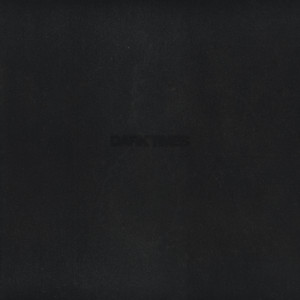 In May, Vince Staples gave us only a few days to prepare for his sixth studio album, Dark Times. Not only do the 13 songs run on a perfect loop (a small, missable triumph on a record full of them), but Dark Times is the Long Beach rapper’s final Def Jam album and best work since Big Fish Theory. Even more so, tracks like “Nothing Matters” and “Little Homies” are like exclamation points on one of the greatest decades a rap star has ever had—even if Vince continues to hold court as the least-celebrity celebrity around. Featuring samples from the 2014 cut “Blue Suede” and transitions that’ll stop you in your tracks (“Children’s Song” into “Shame on the Devil,” for one), Dark Times holds a level of bombast that comes from a rapper who is at his most comfortable. Combining samples from Thee Sacred Souls’ “Weak For Your Love” and DJ Screw’s “Pimp Tha Pen,” the beat on “Black&Blue” will put you in the air. It’s clear that Vince is at his very best when he’s slowing down and letting a hook speak for itself—which takes flight through the “Weak For Your Love” sample. The mixing on Dark Times is phenomenal, too, thanks to Joe Visciano, as he adds a bit of reverb/delay to Vince’s vocals on the verses. The “in the ghetto I’m a martian, crash-landed” hook on “Étouffée” is bonkers, and the song might go down as one of his all-time best. But then there’s instant classics like “Radio” and “Government Cheese.” But what makes this part of Dark Times glow is how Vince reckons with the loss of Black loved ones and heroes, professing that not even the money and glory can patch up the holes left by his West Coast family, peers and friends who’ve passed. “Where did 2Pac and ‘nem go? Where Nipsey Hussle ‘nem go? Swavey and Drakeo? Richee and Slim Foe? I spent a lot of my time missing our kinfolk,” Vince raps on “Black&Blue.” “Put ‘em inside of a rhyme hoping they live on.” Dark Times is an archive of Blackness, making space for the work of James Baldwin, Lil’ Keke, Nikki Giovanni, D’Angelo, Lauryn Hill, Rock Master Scott & the Dynamic Three and Marvin Gaye in 35 minutes of cultural command. —Matt Mitchell [Def Jam]
In May, Vince Staples gave us only a few days to prepare for his sixth studio album, Dark Times. Not only do the 13 songs run on a perfect loop (a small, missable triumph on a record full of them), but Dark Times is the Long Beach rapper’s final Def Jam album and best work since Big Fish Theory. Even more so, tracks like “Nothing Matters” and “Little Homies” are like exclamation points on one of the greatest decades a rap star has ever had—even if Vince continues to hold court as the least-celebrity celebrity around. Featuring samples from the 2014 cut “Blue Suede” and transitions that’ll stop you in your tracks (“Children’s Song” into “Shame on the Devil,” for one), Dark Times holds a level of bombast that comes from a rapper who is at his most comfortable. Combining samples from Thee Sacred Souls’ “Weak For Your Love” and DJ Screw’s “Pimp Tha Pen,” the beat on “Black&Blue” will put you in the air. It’s clear that Vince is at his very best when he’s slowing down and letting a hook speak for itself—which takes flight through the “Weak For Your Love” sample. The mixing on Dark Times is phenomenal, too, thanks to Joe Visciano, as he adds a bit of reverb/delay to Vince’s vocals on the verses. The “in the ghetto I’m a martian, crash-landed” hook on “Étouffée” is bonkers, and the song might go down as one of his all-time best. But then there’s instant classics like “Radio” and “Government Cheese.” But what makes this part of Dark Times glow is how Vince reckons with the loss of Black loved ones and heroes, professing that not even the money and glory can patch up the holes left by his West Coast family, peers and friends who’ve passed. “Where did 2Pac and ‘nem go? Where Nipsey Hussle ‘nem go? Swavey and Drakeo? Richee and Slim Foe? I spent a lot of my time missing our kinfolk,” Vince raps on “Black&Blue.” “Put ‘em inside of a rhyme hoping they live on.” Dark Times is an archive of Blackness, making space for the work of James Baldwin, Lil’ Keke, Nikki Giovanni, D’Angelo, Lauryn Hill, Rock Master Scott & the Dynamic Three and Marvin Gaye in 35 minutes of cultural command. —Matt Mitchell [Def Jam]
Read: “Vince Staples and His Comedic Dystopia”
7. MJ Lenderman: Manning Fireworks
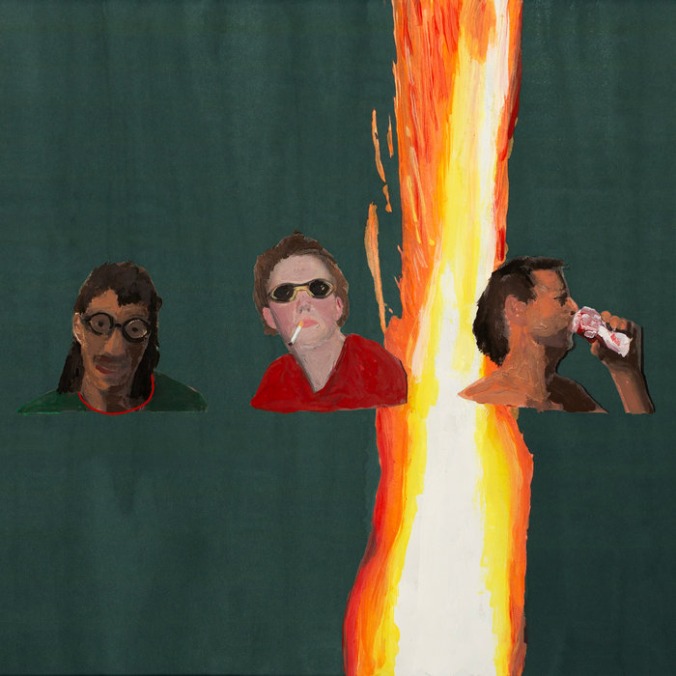 MJ Lenderman could’ve taken the mantle of indie rock stardom in a much more obvious way. Instead, he quietly shakes off these expectations with his fourth album, Manning Fireworks. Where Boat Songs jumped into a guitar riff in its first five seconds, Manning Fireworks starts off bare and acoustic. This is a record about consequences, about the things that happen once you shake off your beer-buzz and face reality. Its characters are not the sports lovers or boat owners from Boat Songs. They’re drowning in debt after they impulsively bought a boat. Caricatures define the record, as people comfort themselves with useless objects like “a wristwatch that’s a pocket knife and a megaphone” or “betting on horses named ‘Johnny Come Lately.’” Lenderman’s scenes toe the line between humor and shame and reckon with the shame and bad luck of passing out into a bowl of Lucky Charms; Cars’ Lightning McQueen gets “blacked out at full speed”; drink some water, it’ll “kill the need to puke,” as Lenderman advises on “Riptorn.” Still, Manning Fireworks is never pessimistic. As self-destructive as Lenderman’s characters can be, they’re always funny in an insistent, hopeful way. It doesn’t matter if “you say I’ve wasted my life away,” as the narrator on “Wristwatch” admonishes. He’s still got that cool wristwatch. Lenderman summarizes this ethos best in “On My Knees”: “Every day is a miracle / Not to mention a threat.” As a lyricist, he writes songs where both feel true in equal measure. The music is both pitiful and reflective of our worst selves. You can’t help but root for them. —Andy Steiner [ANTI-]
MJ Lenderman could’ve taken the mantle of indie rock stardom in a much more obvious way. Instead, he quietly shakes off these expectations with his fourth album, Manning Fireworks. Where Boat Songs jumped into a guitar riff in its first five seconds, Manning Fireworks starts off bare and acoustic. This is a record about consequences, about the things that happen once you shake off your beer-buzz and face reality. Its characters are not the sports lovers or boat owners from Boat Songs. They’re drowning in debt after they impulsively bought a boat. Caricatures define the record, as people comfort themselves with useless objects like “a wristwatch that’s a pocket knife and a megaphone” or “betting on horses named ‘Johnny Come Lately.’” Lenderman’s scenes toe the line between humor and shame and reckon with the shame and bad luck of passing out into a bowl of Lucky Charms; Cars’ Lightning McQueen gets “blacked out at full speed”; drink some water, it’ll “kill the need to puke,” as Lenderman advises on “Riptorn.” Still, Manning Fireworks is never pessimistic. As self-destructive as Lenderman’s characters can be, they’re always funny in an insistent, hopeful way. It doesn’t matter if “you say I’ve wasted my life away,” as the narrator on “Wristwatch” admonishes. He’s still got that cool wristwatch. Lenderman summarizes this ethos best in “On My Knees”: “Every day is a miracle / Not to mention a threat.” As a lyricist, he writes songs where both feel true in equal measure. The music is both pitiful and reflective of our worst selves. You can’t help but root for them. —Andy Steiner [ANTI-]
Read: “MJ Lenderman: Miracles in the Mundane”
6. Charli XCX: BRAT
 On BRAT, Charli XCX is once again channeling her experiences into radical, bite-sized pop songs. It makes CRASH feel even more like an aberration, drawing way closer from the forthright nature of how i’m feeling now. BRAT, though, is messy and vulnerable—in a way Charli’s work has lacked over the last decade. Her own framing positions the album as a club record, written as though she’s spouting these songs off via drunk texts to a friend. That last part is unambiguously true, right down to the sentence case titling. Calling BRAT a club record isn’t wrong, though, per se—fans breathlessly awaiting something that sounds like her lauded Boiler Room set might be left scratching their heads, though. Instead, BRAT is a love letter to the sounds of electroclash. Charli, with an assist from producers like EasyFun, Gesaffelstein, George Daniel and, of course, A.G. Cook, has built her sound into something sparse, stimulating and strange, as BRAT offers a direct perspective into Charli’s psyche, illuminating the insecurities she feels when she looks backwards and forwards at her career. Whether it’s guilt about calling the paparazzi on herself, or feeling out of place at glitzy parties, she’s aware of her own marginality. As she puts it on “I might say something stupid”:: “I’m famous, but not quite.” In a move that feels equal parts brave and chaotic, Charli XCX doesn’t shy away from acknowledging her discomfort with the way the current pop landscape pits women against each other. Even an artist as siloed as she is can’t seem to escape the constant comparisons, an insecurity among her peers that gets a closer reckoning on several of BRAT’s songs. The album puts Charli XCX in a curious position: Even as she ponders her future and reflects on her career, she’s doing it in a way that burrows further into her own niches. BRAT is one of her least immediately accessible records yet. Instead, it plays up the aspects of her campy, fascinating sound that longtime fans love. In that sense, she’s following the lead of the artists at her level. Luckily for Charli, none of her peers are making anything as singular as she is. —Eric Bennett [Atlantic]
On BRAT, Charli XCX is once again channeling her experiences into radical, bite-sized pop songs. It makes CRASH feel even more like an aberration, drawing way closer from the forthright nature of how i’m feeling now. BRAT, though, is messy and vulnerable—in a way Charli’s work has lacked over the last decade. Her own framing positions the album as a club record, written as though she’s spouting these songs off via drunk texts to a friend. That last part is unambiguously true, right down to the sentence case titling. Calling BRAT a club record isn’t wrong, though, per se—fans breathlessly awaiting something that sounds like her lauded Boiler Room set might be left scratching their heads, though. Instead, BRAT is a love letter to the sounds of electroclash. Charli, with an assist from producers like EasyFun, Gesaffelstein, George Daniel and, of course, A.G. Cook, has built her sound into something sparse, stimulating and strange, as BRAT offers a direct perspective into Charli’s psyche, illuminating the insecurities she feels when she looks backwards and forwards at her career. Whether it’s guilt about calling the paparazzi on herself, or feeling out of place at glitzy parties, she’s aware of her own marginality. As she puts it on “I might say something stupid”:: “I’m famous, but not quite.” In a move that feels equal parts brave and chaotic, Charli XCX doesn’t shy away from acknowledging her discomfort with the way the current pop landscape pits women against each other. Even an artist as siloed as she is can’t seem to escape the constant comparisons, an insecurity among her peers that gets a closer reckoning on several of BRAT’s songs. The album puts Charli XCX in a curious position: Even as she ponders her future and reflects on her career, she’s doing it in a way that burrows further into her own niches. BRAT is one of her least immediately accessible records yet. Instead, it plays up the aspects of her campy, fascinating sound that longtime fans love. In that sense, she’s following the lead of the artists at her level. Luckily for Charli, none of her peers are making anything as singular as she is. —Eric Bennett [Atlantic]
5. Johnny Blue Skies: Passage Du Desir
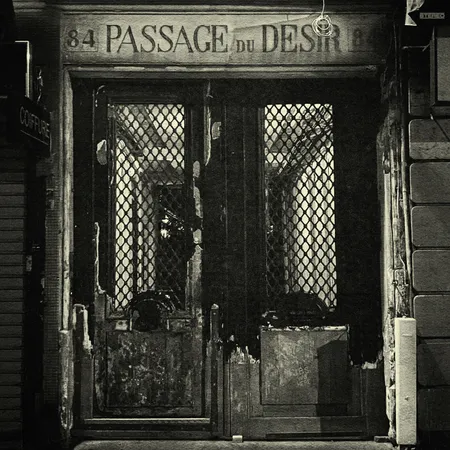 If one thing is made clear on Passage Du Desir, it’s that Sturgill Simpson remains transient but yearns to be still. “Spend my days in a haze floating around in the Marais,” he sings on the opening track, “Swamp of Sadness.” “Nights under the bright lights at Mignon on Beaumarchais, rouge wave gets me mumbling, then tumbling it takes me, bouncing and rolling like a cork lost out at sea.” This album is a French odyssey from the jump, fused with the kind of melancholia that is globally prescient but has long been affixed to the very Americana roots Simpson has made a calling card. Centerpiece “Jupiter’s Faerie” clocks in at seven minutes, bursting from a piano-and-microphone ballad into the type of on-record grieving that’d bring an entire stadium to its knees with its chronicles of reconciliation. “We belonged to the darkness and the moon, but I found a light so bright, though I might live in its sun,” Simpson sings, swapping his recognizable croon for a tender, tenor whisper. “Then today, while walking lost, I saw a sign that, without effort, brought your name to mind. So, I decided to reach out after so long—decided how we left it was all wrong.” Much of Passage Du Desir copes with isolation and alienation with a beer in hand and a boat nearby, but the album also suggests that facing those forces head-on with a loved one is just as beautiful and necessary. It’s humanistic in that way, in how Simpson’s new identity as Johnny Blue Skies does not exist without the well-worn connections he’s picked up along the way. The tomes of peace and clarity that sustain Passage Du Desir sound a lot like a kind of closure that isn’t so finite. The record arrives on the same spiritual plane as A Sailor’s Guide to Earth did eight years ago—even if Simpson’s name has changed. Gone now are the odes to psilocybin and weed, horns and Bakersfield stylings of old, as he’s opted for bluesy guitar-playing, ornate set dressings and rock ballad pianos quaking through intervals of timelessness. It’s, all at once, a stroke of outlaw country genius and a massive, psychedelic vacuum of singer-songwriter reckonings and pensive, concerto swells. I wouldn’t call Passage Du Desir a comeback. No, this is a recalibration firing on all cylinders—its only flaw being that it eventually ends. —Matt Mitchell [High Top Mountain]
If one thing is made clear on Passage Du Desir, it’s that Sturgill Simpson remains transient but yearns to be still. “Spend my days in a haze floating around in the Marais,” he sings on the opening track, “Swamp of Sadness.” “Nights under the bright lights at Mignon on Beaumarchais, rouge wave gets me mumbling, then tumbling it takes me, bouncing and rolling like a cork lost out at sea.” This album is a French odyssey from the jump, fused with the kind of melancholia that is globally prescient but has long been affixed to the very Americana roots Simpson has made a calling card. Centerpiece “Jupiter’s Faerie” clocks in at seven minutes, bursting from a piano-and-microphone ballad into the type of on-record grieving that’d bring an entire stadium to its knees with its chronicles of reconciliation. “We belonged to the darkness and the moon, but I found a light so bright, though I might live in its sun,” Simpson sings, swapping his recognizable croon for a tender, tenor whisper. “Then today, while walking lost, I saw a sign that, without effort, brought your name to mind. So, I decided to reach out after so long—decided how we left it was all wrong.” Much of Passage Du Desir copes with isolation and alienation with a beer in hand and a boat nearby, but the album also suggests that facing those forces head-on with a loved one is just as beautiful and necessary. It’s humanistic in that way, in how Simpson’s new identity as Johnny Blue Skies does not exist without the well-worn connections he’s picked up along the way. The tomes of peace and clarity that sustain Passage Du Desir sound a lot like a kind of closure that isn’t so finite. The record arrives on the same spiritual plane as A Sailor’s Guide to Earth did eight years ago—even if Simpson’s name has changed. Gone now are the odes to psilocybin and weed, horns and Bakersfield stylings of old, as he’s opted for bluesy guitar-playing, ornate set dressings and rock ballad pianos quaking through intervals of timelessness. It’s, all at once, a stroke of outlaw country genius and a massive, psychedelic vacuum of singer-songwriter reckonings and pensive, concerto swells. I wouldn’t call Passage Du Desir a comeback. No, this is a recalibration firing on all cylinders—its only flaw being that it eventually ends. —Matt Mitchell [High Top Mountain]
4. Friko: Where we’ve been, Where we go from here
 “20 years spent above this place, you could smell the iron from the room,” Niko Kapetan hums at the opening of Where we’ve been, Where we go from here. “And the train was running through the window, carrying a pillow so I could lay my head down onto you.” His vocals galvanize saccharine guitar chords into an oblivion of noise, gang vocals and a wallpaper of distorted gibberish. It’s what I’d imagine Conor Oberst making a pre-OK Computer Radiohead song in 2024 might sound like; this is how Friko has chosen to introduce themselves to us, with phantasmic guitars and a volcanic wall of sound so arresting and mythical you’ll have to run the whole track back just as soon as it fades out. It’s one hell of a hello. Where we’ve been, Where we go from here is inspired by everything from classical concertos to the Garden State soundtrack to Led Zeppelin. Everything they’ve connected with or have listened to, even passively, enforces the way Kapetan and Bailey Minzenberger play alone and together. At the heart of Where we’ve been, Where we go from here, there is a lingering sense of intensity, renewal and out-of-body connections to performance and writing. The whole record is one big thesis statement on, as Kapetan puts it, “wanting better for yourself and the people around you, but wondering how you can possibly do that with the world we live in.” Thus, there is burning. There is despair. But, there is also salvation and closure and resolution. In just a matter of minutes, Where we’ve been, Where we go from here will make you run through a turnstile of emotions. “I’ll write a song, you’ll sing along,” Kapetan sings on “Until I’m With You Again.” “I’ll laugh, you’ll cry, our world inside a song.” It’s risky, poetic, sublime and intimate music that, subsequently, fits perfectly into the framework of Chicago’s lineage of boundary-pushing rock ‘n’ roll while also obliterating any preconceptions of what brutal, complex, feverish and experimental work is supposed to look and sound like. Through Kapetan’s lyricism, Minzenberger’s instrumentation and the collectively massive, beautiful love they hold for one another, Friko are animated, direct and vividly in-sync. And the world has never needed that kind of joyous, purposeful brilliance more than it does right now. —Matt Mitchell [ATO Records]
“20 years spent above this place, you could smell the iron from the room,” Niko Kapetan hums at the opening of Where we’ve been, Where we go from here. “And the train was running through the window, carrying a pillow so I could lay my head down onto you.” His vocals galvanize saccharine guitar chords into an oblivion of noise, gang vocals and a wallpaper of distorted gibberish. It’s what I’d imagine Conor Oberst making a pre-OK Computer Radiohead song in 2024 might sound like; this is how Friko has chosen to introduce themselves to us, with phantasmic guitars and a volcanic wall of sound so arresting and mythical you’ll have to run the whole track back just as soon as it fades out. It’s one hell of a hello. Where we’ve been, Where we go from here is inspired by everything from classical concertos to the Garden State soundtrack to Led Zeppelin. Everything they’ve connected with or have listened to, even passively, enforces the way Kapetan and Bailey Minzenberger play alone and together. At the heart of Where we’ve been, Where we go from here, there is a lingering sense of intensity, renewal and out-of-body connections to performance and writing. The whole record is one big thesis statement on, as Kapetan puts it, “wanting better for yourself and the people around you, but wondering how you can possibly do that with the world we live in.” Thus, there is burning. There is despair. But, there is also salvation and closure and resolution. In just a matter of minutes, Where we’ve been, Where we go from here will make you run through a turnstile of emotions. “I’ll write a song, you’ll sing along,” Kapetan sings on “Until I’m With You Again.” “I’ll laugh, you’ll cry, our world inside a song.” It’s risky, poetic, sublime and intimate music that, subsequently, fits perfectly into the framework of Chicago’s lineage of boundary-pushing rock ‘n’ roll while also obliterating any preconceptions of what brutal, complex, feverish and experimental work is supposed to look and sound like. Through Kapetan’s lyricism, Minzenberger’s instrumentation and the collectively massive, beautiful love they hold for one another, Friko are animated, direct and vividly in-sync. And the world has never needed that kind of joyous, purposeful brilliance more than it does right now. —Matt Mitchell [ATO Records]
Read: “Friko’s World Inside a Song”
3. Cindy Lee: Diamond Jubilee
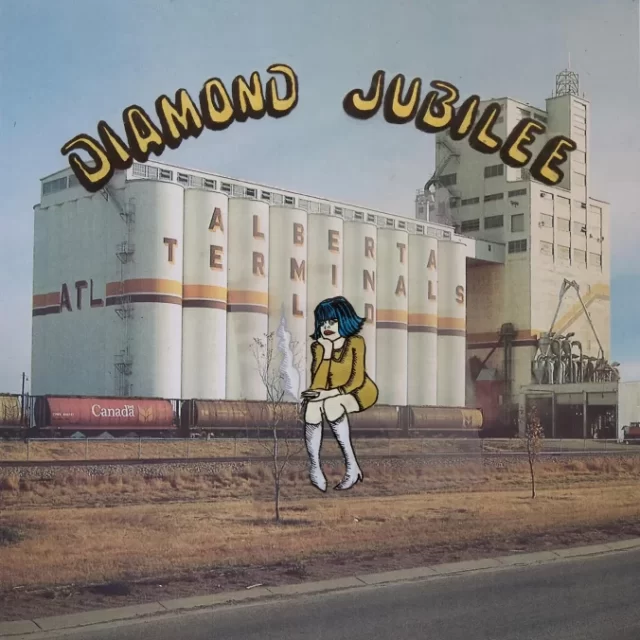 Throughout its two hours of music, there are moments on Cindy Lee’s Diamond Jubilee where instrumentation will be either recorded or manipulated to sound like it’s coming from the other room, if not another gauzy galaxy, only for the sound quality to change suddenly, jutting out at you. “If You Hear Me Crying” on the second “disc” does this beautifully, shifting from sunshine pop bounce to what sound like muted, sarangi-accompanied passages, all bulldozed by a day-glo guitar break in a matter of a minute. This melding of influences and styles produces some of the record’s most daring turns—notably where “Flesh and Blood”’s percussive intro throbs until a dam breaks into sustained synth textures, a bass-driven groove and wordless backing vocals. Only adding to the shambolic charm, the song notably speeds up or slows down at certain points, as if it’s careening on railroad tracks, propelling itself into an outro of more pronounced cymbal crashes and even more crunchy, psychedelic shredding. Diamond Jubilee will overwhelm you, there’s no getting around that. The sheer volume of what Patrick Flegel has created willfully takes up space, and it’s expected that the listener will have to wrestle with something of this scope, even as they’re wowed by what they’re hearing. But again, there’s something thrilling now about that type of challenge, when so much is so easily digestible. Even if the Cindy Lee project doesn’t exist in its current form by the time this upcoming tour is over, it won’t really matter—their masterwork, beamed down from another world, will always feel out of time and, therefore, feel at home in any given moment. The album’s sprawl has no beginning and no end. It’s just a question of when or where you’re ready to join it. —Elise Soutar [Realistik]
Throughout its two hours of music, there are moments on Cindy Lee’s Diamond Jubilee where instrumentation will be either recorded or manipulated to sound like it’s coming from the other room, if not another gauzy galaxy, only for the sound quality to change suddenly, jutting out at you. “If You Hear Me Crying” on the second “disc” does this beautifully, shifting from sunshine pop bounce to what sound like muted, sarangi-accompanied passages, all bulldozed by a day-glo guitar break in a matter of a minute. This melding of influences and styles produces some of the record’s most daring turns—notably where “Flesh and Blood”’s percussive intro throbs until a dam breaks into sustained synth textures, a bass-driven groove and wordless backing vocals. Only adding to the shambolic charm, the song notably speeds up or slows down at certain points, as if it’s careening on railroad tracks, propelling itself into an outro of more pronounced cymbal crashes and even more crunchy, psychedelic shredding. Diamond Jubilee will overwhelm you, there’s no getting around that. The sheer volume of what Patrick Flegel has created willfully takes up space, and it’s expected that the listener will have to wrestle with something of this scope, even as they’re wowed by what they’re hearing. But again, there’s something thrilling now about that type of challenge, when so much is so easily digestible. Even if the Cindy Lee project doesn’t exist in its current form by the time this upcoming tour is over, it won’t really matter—their masterwork, beamed down from another world, will always feel out of time and, therefore, feel at home in any given moment. The album’s sprawl has no beginning and no end. It’s just a question of when or where you’re ready to join it. —Elise Soutar [Realistik]
2. Waxahatchee: Tigers Blood
 When the dust settles on the best album of Katie Crutchfield’s career, what we’re left with is the deeply human beauty of Tigers Blood. There’s a verse on “Evil Spawn” I return to often, when Crutchfield sings, “If we stand out in some wild city street, dodging every car, every thief and disease / Catching tiny crumbs in the heartless breeze, say we’re tough as nails, say we’re both naive.” Making music is such a transformative act, and listening to it is just as wondrous and life-affirming. Whether it’s the rowdy intro riff from MJ Lenderman on “Bored,” or the warmth of Crutchfield’s voice on a song like “Crimes of the Heart,” or the skeletal, phenomenal vibrancy of “365” and the grievous, profound weight she places on each measure of verse across three minutes that feel like an hour—Tigers Blood is a collection of stories burned like the Alabama heat. All memoirists are collectors of raw emotions, and when we write about ourselves or about what’s around us, it’s like we’re picking up small treasures that we’ll polish up later down the road. Listening to Tigers Blood is like entering a house of emotional knick-knacks, each track more antiquated than the last. “There’s a lock on the door that costs more than my car, babe, and I ain’t ever come close to crossing that threshold anyway,” Crutchfield sings on “The Wolves. “I can’t hear our song on the radio without a clear recollection of the touch-and-go; I can’t prize my certainty and let bygones fade away, for my own sake.” The prose of it all fits like a glove, and Katie Crutchfield’s affections stave off clichés in earnest. Her mind wanders like a junker barreling down Route 31, and her tongue is whip-smart and filed into a vibrant knife; “Named after a city y’ain’t never seen, spellbinding copperheads banging a tambourine / It’s the kiss of death, but it’s the only way out / Galloped up to the mirror, looked her right in the mouth” sounds like cosmic poison pouring from her bodkin breath. All of it exists with a glimpse into a lifetime I feel like I’ve lived but not yet fully said goodbye to, and, hey, maybe you feel that way, too. —Matt Mitchell [ANTI-]
When the dust settles on the best album of Katie Crutchfield’s career, what we’re left with is the deeply human beauty of Tigers Blood. There’s a verse on “Evil Spawn” I return to often, when Crutchfield sings, “If we stand out in some wild city street, dodging every car, every thief and disease / Catching tiny crumbs in the heartless breeze, say we’re tough as nails, say we’re both naive.” Making music is such a transformative act, and listening to it is just as wondrous and life-affirming. Whether it’s the rowdy intro riff from MJ Lenderman on “Bored,” or the warmth of Crutchfield’s voice on a song like “Crimes of the Heart,” or the skeletal, phenomenal vibrancy of “365” and the grievous, profound weight she places on each measure of verse across three minutes that feel like an hour—Tigers Blood is a collection of stories burned like the Alabama heat. All memoirists are collectors of raw emotions, and when we write about ourselves or about what’s around us, it’s like we’re picking up small treasures that we’ll polish up later down the road. Listening to Tigers Blood is like entering a house of emotional knick-knacks, each track more antiquated than the last. “There’s a lock on the door that costs more than my car, babe, and I ain’t ever come close to crossing that threshold anyway,” Crutchfield sings on “The Wolves. “I can’t hear our song on the radio without a clear recollection of the touch-and-go; I can’t prize my certainty and let bygones fade away, for my own sake.” The prose of it all fits like a glove, and Katie Crutchfield’s affections stave off clichés in earnest. Her mind wanders like a junker barreling down Route 31, and her tongue is whip-smart and filed into a vibrant knife; “Named after a city y’ain’t never seen, spellbinding copperheads banging a tambourine / It’s the kiss of death, but it’s the only way out / Galloped up to the mirror, looked her right in the mouth” sounds like cosmic poison pouring from her bodkin breath. All of it exists with a glimpse into a lifetime I feel like I’ve lived but not yet fully said goodbye to, and, hey, maybe you feel that way, too. —Matt Mitchell [ANTI-]
Read: “Waxahatchee Has More Stories to Tell”
1. Jessica Pratt: Here in the Pitch
 You may be drawn to Here in the Pitch for numerous reasons—for Jessica Pratt’s ageless ingenue and implementation of bossa nova, folk-pop and baroque music, or her ability to make modernity sound so damn heady. The nine songs that make up her fourth album tend to simmer, never climaxing into some larger-than-life climax or euphoric finale. Instead, they rest in the meters of pop excellence, forgoing any urges to sprawl. “Life Is” is one of the year’s best opening songs, and “The Last Year” is one of its best closing songs. Between those bookends, Pratt puts solemn grandeur to good use. The music effervesces yet rattles with weightless menace; existing as a kind of hypnagogic folk prospering that flirts with sophistication yet drops out into an avalanche of brightly lit doom. “I never was what they called me in the dark,” she sings at one point. “I never was, here I sit so long.” With a 12-year catalog as bulletproof as it is short, Pratt has found the old “they don’t make them like they used to” saying as a challenge worth taking. Here in the Pitch is an album that exists exactly for someone like me—someone who is deeply fascinated by the underbellies of Southern California, by the mythology of a city ravaged by serial killers, drugs, more musical and social movements than anyone could count and a never-healing source of unrest.
You may be drawn to Here in the Pitch for numerous reasons—for Jessica Pratt’s ageless ingenue and implementation of bossa nova, folk-pop and baroque music, or her ability to make modernity sound so damn heady. The nine songs that make up her fourth album tend to simmer, never climaxing into some larger-than-life climax or euphoric finale. Instead, they rest in the meters of pop excellence, forgoing any urges to sprawl. “Life Is” is one of the year’s best opening songs, and “The Last Year” is one of its best closing songs. Between those bookends, Pratt puts solemn grandeur to good use. The music effervesces yet rattles with weightless menace; existing as a kind of hypnagogic folk prospering that flirts with sophistication yet drops out into an avalanche of brightly lit doom. “I never was what they called me in the dark,” she sings at one point. “I never was, here I sit so long.” With a 12-year catalog as bulletproof as it is short, Pratt has found the old “they don’t make them like they used to” saying as a challenge worth taking. Here in the Pitch is an album that exists exactly for someone like me—someone who is deeply fascinated by the underbellies of Southern California, by the mythology of a city ravaged by serial killers, drugs, more musical and social movements than anyone could count and a never-healing source of unrest.
The neon depths and backlit trenches of Los Angeles are not so immediately recognizable on Here in the Pitch. They are emotional checkpoints delivered through sound and color, not through story. In music and in literature and in film, the West Coast has existed as a melting pot of unmistakable chaos in cultural history. Pratt beckons the scandalous energies of Kenneth Anger’s Hollywood Babylon and Tinseltown denizens in her songs—leading to hues of characters both autobiographical and fictional, both grimacing and familiar. The lines blur in her work and parallel the West Coast mysticisms of her home. The shadow of Los Angeles arches over Here in the Pitch from the jump, as the record begins with Alex Goldberg playing drums like Hal Blaine. The percussion arrangement on “Life Is” conjures vestiges of Blaine tapping a Sparklett water jug during the sessions for the Beach Boys’ “Caroline, No”; the sounds of the Wrecking Crew and those ornate, Spector-era sonics exist in Jessica Pratt’s world, too. Pull back the curtain on any pop musician’s oeuvre from the last 50-some years and you’ll see just how present the Beach Boys’ revolutions are. You can hear them on “Better Hate,” the first song Pratt and her band recorded, which comes out the gate with echoes of timpani and baritone saxophone, parading Brian Wilson-esque vocal movements and LBJ-era sunshine pop relics.
There are reflections of forgotten girl-group lore in the sun-faded, nylon-ensconced, syrupy stupors of “Better Hate” and “The Last Year,” with Pratt’s childlike lilt of a potent but forgotten yesteryear anchoring each song’s emotional threshold. As the first vantages of Here in the Pitch make themselves known, spiritual remnants of the Murmaids, the Shaggs and the Tammys buoy to the surface—albeit slowed down and the dynamics now lacquered in cozy beams of hi-fi phonics. On the lyric sheet being passed around during Here in the Pitch’s press cycle, Pratt included a Leonard Cohen quote: “The fact is that you feel like singing, and this is the song that you know.” As the “The storyline goes forever” line in “The Last Year” rings out, the act of returning lingers. If the mystics of Los Angeles are as real as they sound—and if music can cut through the dead air of its nervous and receding outskirts—then there will always be a song for Jessica Pratt to come home to. —Matt Mitchell [Mexican Summer]
Read: “The Hypnagogic, Primordial Ooze of Jessica Pratt’s Old Hollywood”







































